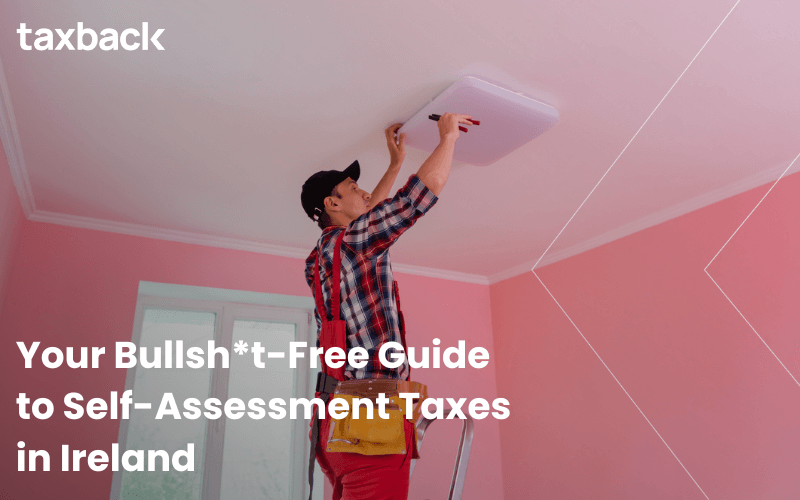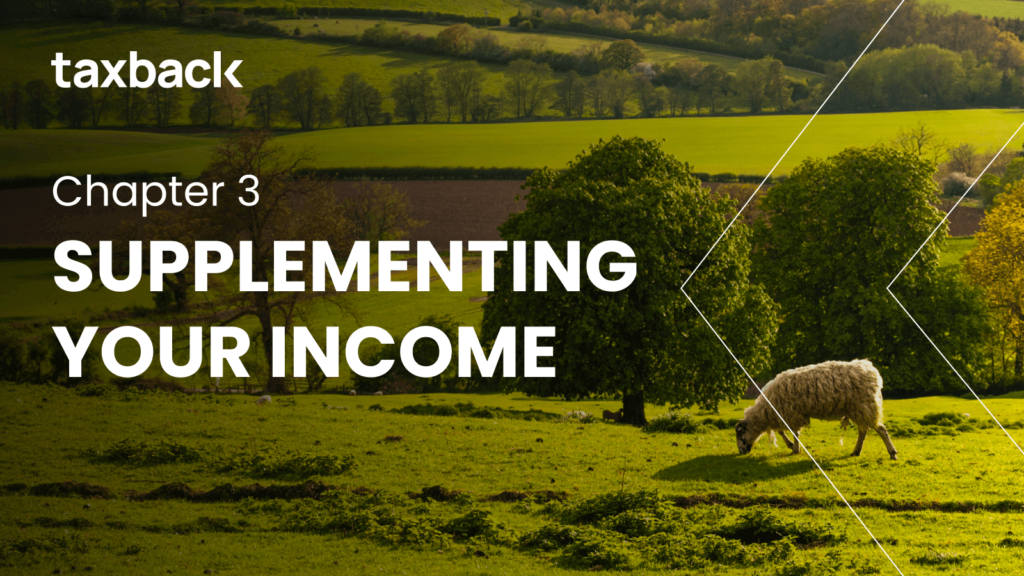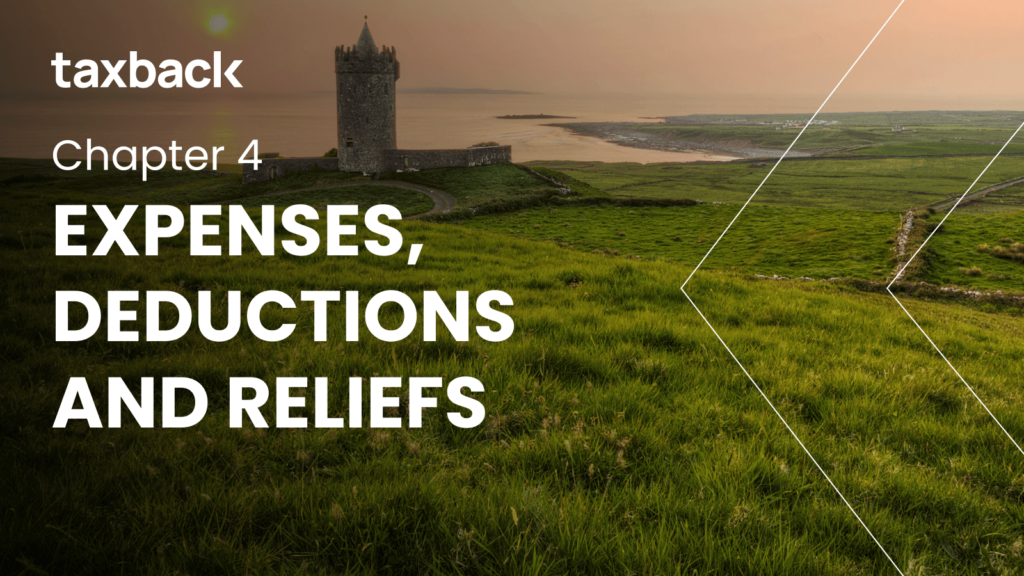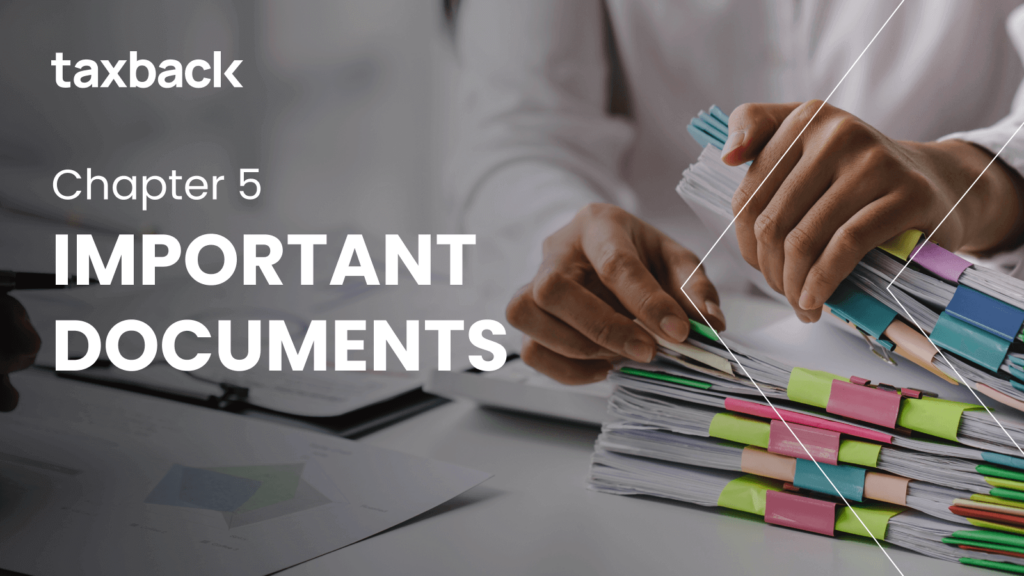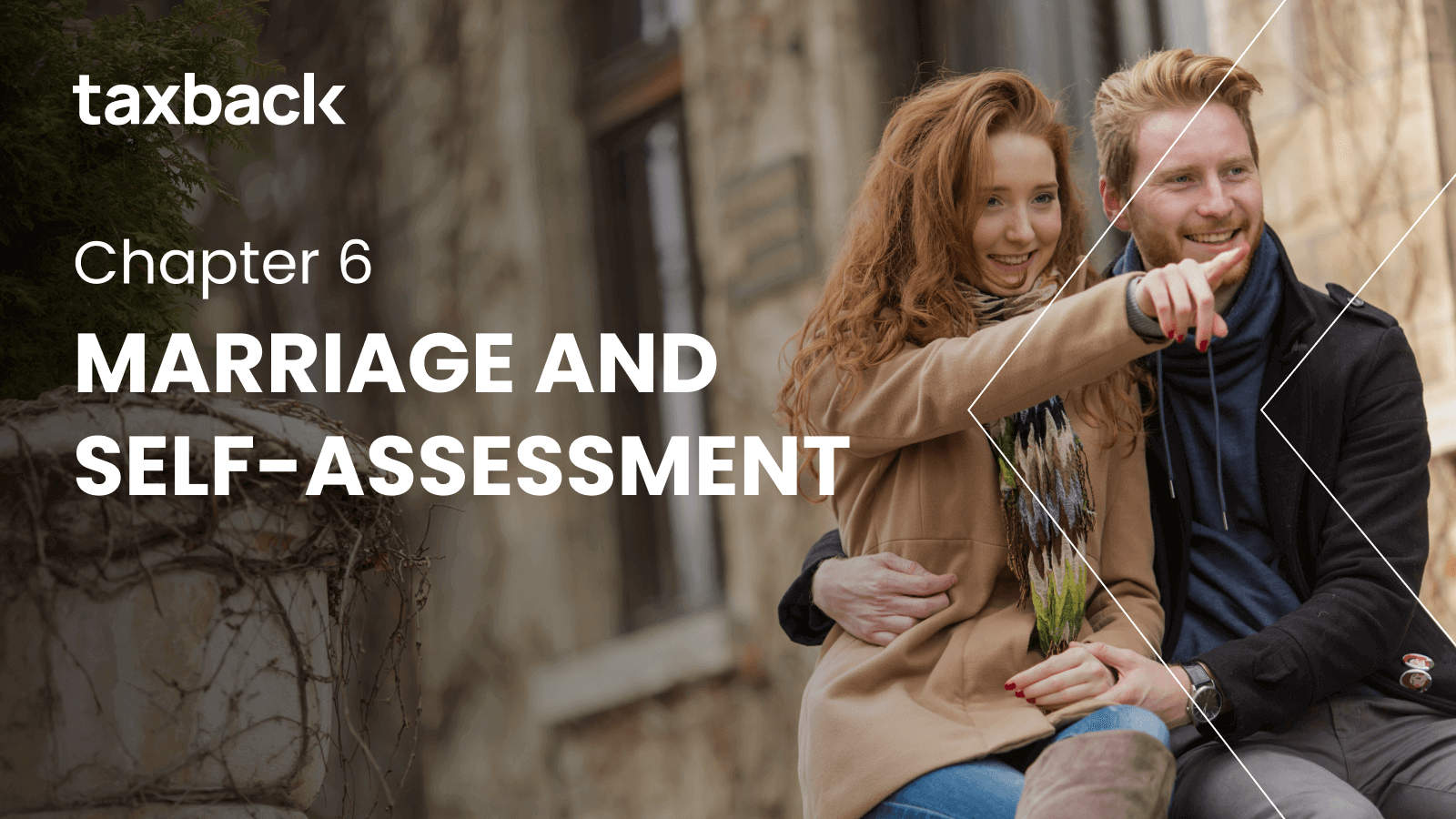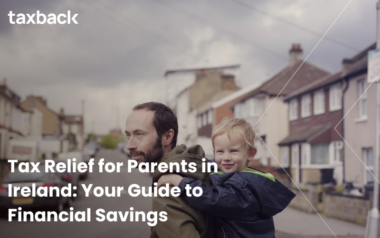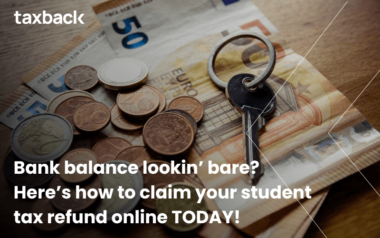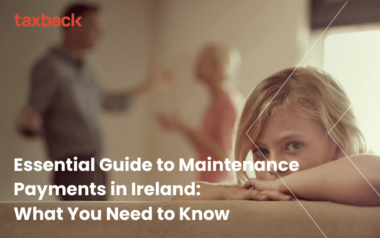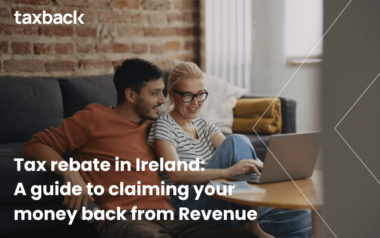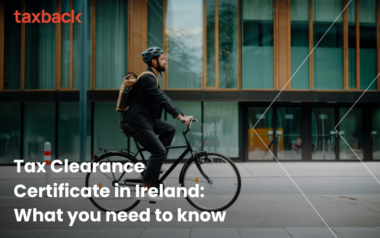Unlike PAYE employees, if you are self-employed or if you earn income outside the PAYE system, you must file your own end-of-year tax return. Find out how to claim tax back in Ireland if it’s your first time trying to get a tax refund.
Many people who earn income outside the PAYE system feel unsure of their tax obligations and entitlements.
If you don’t earn any income from self-employment, you may find our PAYE tax guide useful.
But if you do earn money outside the PAYE system – such as from rental income, trading or investments etc – you’ll no-doubt find this Bullsh*t-free guide to Self-Assessment taxes in Ireland to be a very useful resource.
Throughout the following chapters we’ll cover everything you need to know from what your obligations are, to the reliefs & credits you are entitled to, and how you can go about getting them.
Plus we’ve broken all of the tax jargon down into plain English!
So, let’s get started then! Here’s the basics of Self-Assessment tax in Ireland.
Watch our FREE Self-Assessed Tax Webinar
Table of Contents Show
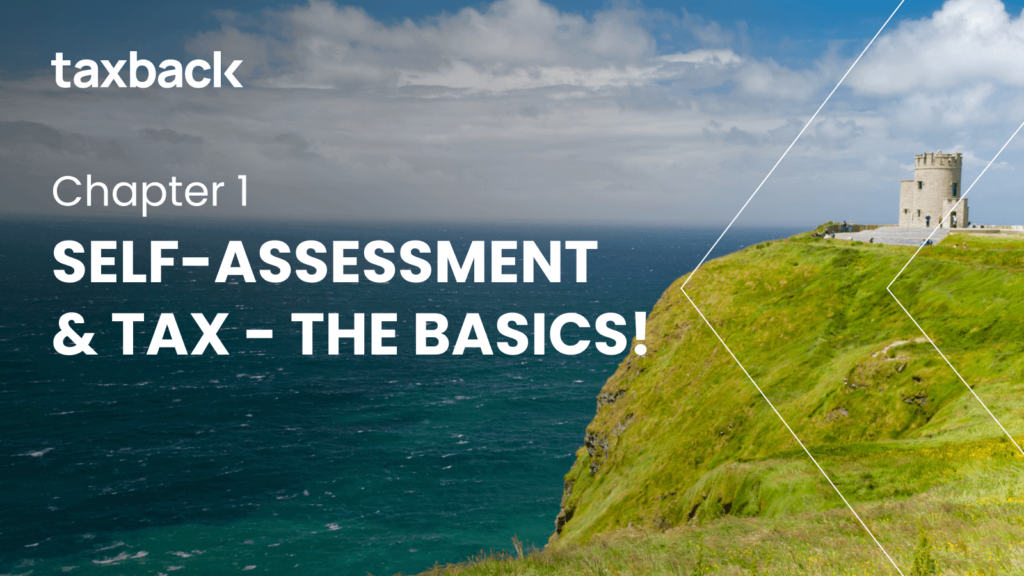
Becoming self-employed
In Ireland, 14.75% of the workforce is self-employed. But what does this mean?
Well, when you become self-employed, you conduct your own business rather than work for an employer.
In truth, there are a number of advantages and disadvantages to working for yourself. For example, when you are self-employed you are in complete control of what you do, as well as where and when you want to do it. In other words, you organise your own business type, working hours and location.
On the other hand, many self-employed people work very long hours and do not have a regular source of income.
You will also have to handle your own tax affairs – through the self-assessment tax system. Through the following chapters, this no-nonsense guide will outline everything you need to know about tax for the self-employed.
Self-employment and tax
You will be considered ‘a chargeable person‘ for self-assessment purposes if you are due to pay tax on behalf of yourself (or another person) for a particular tax period.
For instance, if you:
- have other sources of income in addition to your PAYE salary, Or
- are self-employed, Or
- are a director of an Irish company,
then you will be considered a ‘chargeable person’ (with some exceptions to this general rule).
You will not be considered a chargeable person if:
- Your total income consists of PAYE salary
- You are in receipt of both PAYE and non-PAYE income – where the total non-PAYE income assessable to tax
– Does not exceed €5,000 and
– Is coded into your certificate of tax credits (exception does not apply to company directors) or is taxed at source - You have been notified by Revenue that you don’t need to file a tax return
Once an individual becomes a chargeable person, they must register as such with Revenue by completing a Form TR1 or Form TR1 (FT).
A TR1 Form can be used by resident individuals, partnerships, trusts or unincorporated bodies registering for tax in Ireland.
Meanwhile, a TR1 (FT) Form can be used by non-resident individuals, partnerships, trusts or unincorporated bodies registering for tax in Ireland.
These forms can also be used to register for VAT, Relevant Contracts Tax and/or Employer’s PAYE/PRSI.
Once completed, you will receive a ‘Notice of Registration‘ confirming that your registration has been completed.
But when is tax actually due to be paid?
Many PAYE employees have their tax automatically deducted from their weekly or monthly salary payment.
However, the self-assessment system is very different to the PAYE system. In the self-assessment system, tax is due to be paid on or before 31 October each year following the year of assessment.
The tax that you pay is based on the income you earned during the previous tax year. So, for example, tax on income earned in 2025 is due on 31 October 2026.
Many PAYE employees have never filed a tax return. However, every self-employed person must file a tax return every year. The type of tax return you have to file depends on how much income you earn.
If your taxable non-PAYE income in a year does not exceed €5,000 and your gross non-PAYE income does not exceed €30,000, you will need to submit a tax return Form 12. If your taxable non-PAYE income exceeds €5,000, or your gross non-PAYE income exceeds €30,000, you must register for self-assessment and file a tax return Form 11.
Note: An individual whose non-PAYE income is zero due, for example, to an allowance which reduces their taxable profits to zero, is considered a chargeable person. This is because zero profits can’t be taxed through the PAYE system. In other words, a tax return Form 11 must be filed.
The deadline for filing a tax return (Form 11 or Form 12) for a tax year is the 31 October of the following year.
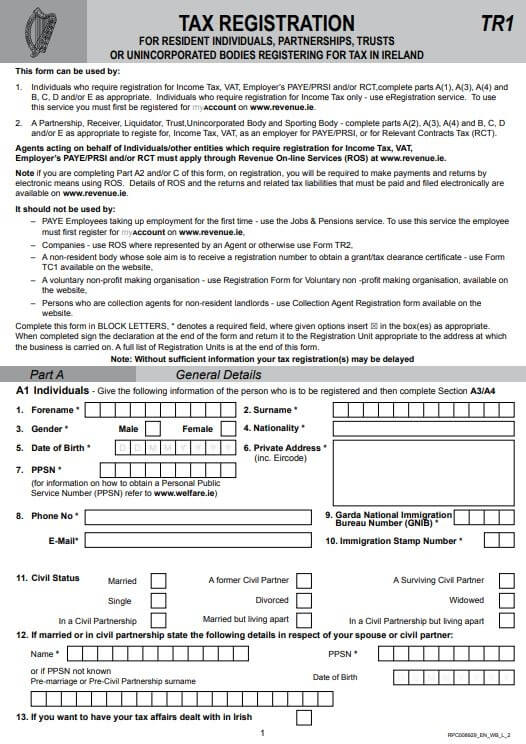
TR1 Form
Preliminary Tax
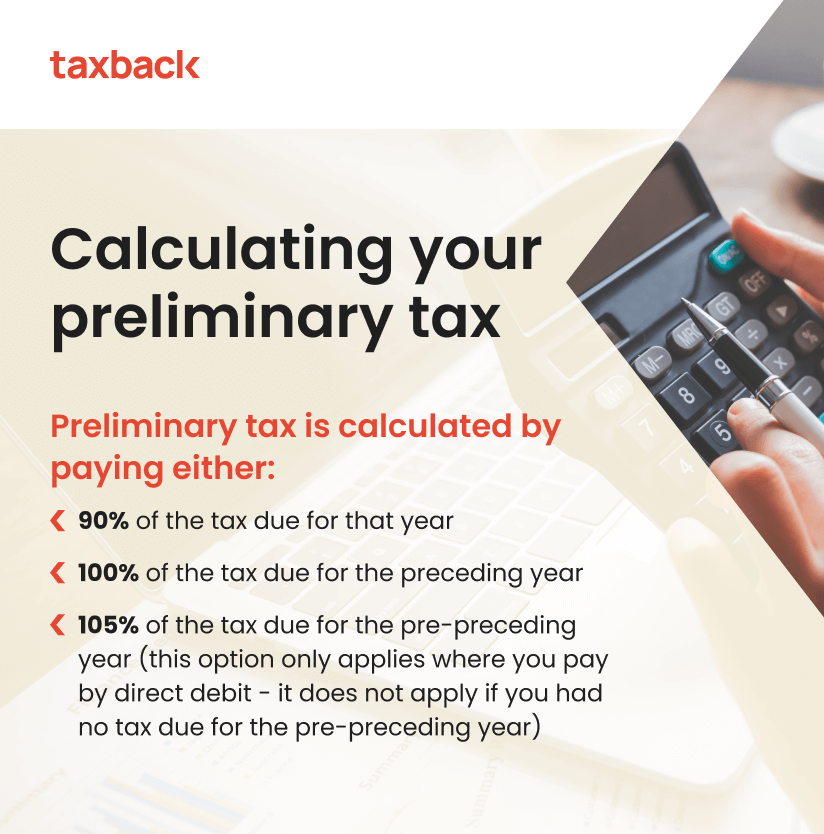
For Income Tax (IT) purposes, preliminary tax is your estimate of the IT, Pay Related Social Insurance (PRSI) and Universal Social Charge (USC) that you expect to pay for a tax year. You must pay this by 31 October of the tax year in question.
If you wish to pay preliminary tax, you must use a VISA or MasterCard credit or debit card
Preliminary tax is calculated by paying either:
- 90% of the tax due for that year
- 100% of the tax due for the preceding year
- 105% of the tax due for the pre-preceding year (this option only applies where you pay by direct debit – it does not apply if you had no tax due for the pre-preceding year)
For example – Margaret has a tax bill of:
- €2,000 in year one
- €3,000 in year two
- €4,000 in year three
When filing her tax return for year two (i.e. by 31 October of year three), she must choose the amount of preliminary tax she is going to pay in respect of year three.
She can choose either:
- €3,600 (90% of the tax due for that year, i.e. year three)
- €3,000 (100% of the tax due for the previous year, i.e. year two)
- €2,100 (105% of the tax due for the pre-preceding year, i.e. year one)
When Margaret is filing her tax return for year three (i.e. by 31 October of year four) she will calculate her tax bill for the year. If the preliminary tax she paid in year three is less than the amount of her tax bill, she will have to pay the balance. However, if it is more than this figure, she will be entitled to a tax rebate.
We take the hassle out of filing your Irish tax return
Universal Social Charge
USC is a tax you pay on your gross income. Everyone earning over €13,000 gross income is liable to pay USC. Payment of USC is due to Revenue when you are filing your tax return.
Standard Rates of USC 2024
| 2025 | Standard rate of USC |
|---|---|
| First €12,012 | 0.5% |
| Next €15,370 | 2% |
| Next €42,662 | 3% |
| Balance (above those amounts) | 8% |
| Self-employed income over €100,000 | 11% |
There is a USC surcharge of 3% if your non-PAYE income is more than €100,000 a year.
Reduced rates of USC apply to some people who:
Are aged 70 or over or hold a full Medical Card (not a GP Visit Card).
The reduced rates apply for the whole year when you:
You are aged 70 or over and your total income is €60,000 or less.
If you hold a medical card, you should tell Revenue to ensure you are on the reduced rate.
If your income is more than €60,000, the standard rates of USC apply to your full income.
If you are self-employed, you pay your USC liability alongside your preliminary tax payment.
You do not have to pay USC on your social welfare payments or on any income you pay Deposit Interest Retention Tax (DIRT) on.
And depending on your age and situation you may be exempt from, or entitled to, reduced rates of USC.
PRSI

Usually, if you are self-employed you will pay Class S PRSI. Class S PRSI contributions are paid at:
- a rate of 4% on all income, or
- €500 – whichever is the greater
Note: if you earn less than €5,000 from self-employment in a year you are exempt from paying Class S PRSI but you may pay €500 as a voluntary contributor.
If you are an employee of a limited company that is owned by your spouse or a family member, you are insurable at PRSI Class A (or Class J). If you are not an employee but participate in the running of the company or if you hold a directorship or shareholding position and have control over its operations, you may be treated as a self-employed contributor and liable to pay Class S PRSI (provided you earn more than €5,000).
Two or more family members who operate a business as a partnership and share the profits are insurable as self-employed contributors at Class S (if they earn over €5,000). Family members employed by a partnership pay Class A (or Class J).
Tax credits
Tax credits can be used to reduce your overall tax bill. So it is definitely worth investigating which tax credits you are entitled to.
For starters, the Earned Income Tax Credit applies to most self-employed people. This tax credit is worth €1,950 for 2025 and you can subtract this figure from your tax liability.
The earned income credit cannot be transferred to your spouse or civil partner.
You may have income that qualifies for the Employee Tax Credit and the Earned Income Tax Credit. If so, the combined credits cannot exceed the maximum value of the Employee Tax Credit (€1,950).
The credit available is the lower of:
€1,950
or
20% of your qualifying earned income
We take the hassle out of filing your Irish tax return
Filing a return
It’s possible to file a tax return (for example – Form 11 or Form 12) yourself through Revenue Online Service (ROS). Alternatively, if you would prefer not to complete your income tax return yourself, you can enlist the services of an expert tax agent such as Taxback and they can file your return for you.
Overpaying tax
Every year many people pay either too much or too little tax. An overpayment of tax could arise as a result of not claiming all of the credits and reliefs you are entitled to.
The good news is that you can go back 4 years to claim a refund and the deadline to file your tax return is 31 October each year. In other words, if you want to claim a tax refund from 2021, then 2025 is the last year that you can claim.
To get your tax rebate, you can contact Revenue directly. Alternatively, a tax agent such as Taxback can file your paperwork and get your tax refund for you.

Pay and file system – how does it work?
By 31 October in a tax year, you must:
- pay your preliminary tax for that year
- file your tax return and self-assessment for the previous tax year
- pay any balance of tax due for the previous year
Filing before the deadline is very important. If you miss these deadlines you will have to pay interest and fines on top of your tax bill.
You will have to pay a surcharge if you send your tax return after the deadline, as follows:
- within two months of the filing date: 5% of the tax due, up to €12,695
- over two months: 10% of your tax liability, up to €63,485
However, when you pay and file through the Revenue Online Service (ROS), the 31 October deadline.
Note: even if you pay and file on time for Income Tax, a 5% surcharge may apply if your Local Property Tax (LPT) obligations are not met.
A chargeable person is liable to interest if:
- the preliminary tax paid is insufficient or is not paid on time
- the balance of tax due is not paid on time
Interest runs from the due date for payment and the interest charge is 0.0219% per day or part of the day.
We take the hassle out of filing your Irish tax return

Should I register for self-assessed tax?
There are many reasons why you may need to register for self-assessment tax (by completing a TR1 form or TR1 (FT) form).
These include if you:
- are self-employed
- receive income from non-Pay As You Earn (PAYE) sources, for example:
- rental income
- investment income
- foreign income including foreign pensions
- maintenance payments
- fees that are exempt from PAYE
- have profited from share options or share incentives (this is only applicable for the years before 2024, however, employers must still report the profit via payroll)
- are a director of an Irish company
Although company directors are always chargeable persons, it is Revenue practice to exclude the following:
- Directors of dormant companies
- Directors of companies in which they own 15% or less of the share capital
We take the hassle out of filing your Irish tax return
In other words, even if you are an employee in the PAYE system you may need to pay tax through the self-assessment if you earn non-PAYE income.
You do not need to register for self-assessment if:
- you only have PAYE income
- your taxable non-PAYE income does not exceed €5,000 and is taken into account in calculating your tax credits and standard rate cut-off point for PAYE purposes. It may also be taxed at source, providing the gross non-PAYE income does not exceed €30,000 (in these cases you must submit a Form 12).

What do I pay tax on?
You must declare all non-PAYE income to Revenue for tax purposes. Even if there is no record of a particular transaction, it is still important that you declare the cash you received for your services.
So, for example, if you teach guitar in your spare time, you will need to declare any income you receive to Revenue.
Your tax obligations will differ depending on whether you have earned more or less than €5,000 in a year.
For example, Philip teaches guitar in his spare time. This earns him €250 every month (€3,000 per year). Meanwhile, Carl delivers food with Deliveroo at the weekend and earns €170 per week (€8,840 per year).
Carl has earned more than €5,000 a year and will need to register as a self-assessed individual with Revenue by completing a TR1 form (he only needs to do this once). Carl must then file a Form 11 tax return and make a tax payment by 31 October each year for the previous year’s earnings.
Because Philip earns less than €5,000 a year, Form 12 is the correct option for him to file. Similarly to Form 11, Philip’s earnings from the previous year will be relevant when completing a Form 12.
You don’t have to pay tax on:
- Scholarship income
- Interest from Savings Certificates, Savings Bonds, and National Installment Savings Schemes with An Post
- Payments to approved pension schemes
Certain types of income are exempt from income tax. However, you may still need to pay USC and PRSI on this income. Examples of these exempt incomes include:
- Artists’ Exemption
- Rent-a-Room Relief
- Woodlands
Trading and professional income
A self-employed person is someone who runs their own business – known as a trade or profession.
The full amount of profits or gains associated with the business is taxed in the year of assessment. ‘The full amount of profits or gains’ is taken to be the difference between the income from the trade and the expenditure incurred and allowed under tax law in earning that income.
When a trader makes a loss, it can be used in two ways:
- Use it to reduce the non-trading income for the year of loss,or
- Carry it forward to future years and set it against future profits of the same trade
We take the hassle out of filing your Irish tax return
Universal Social Charge (USC)
On 1 January 2011, the Universal Social Charge (USC) replaced both the income levy and the health levy (also known as the health contribution).
If you earn more than €13,000 (gross) per year you will have to pay USC. The payment will be due when you complete your annual Form 11 tax return.
Standard rates and thresholds of USC effective from 1 January 2025
| 2025 | Standard rate of USC |
|---|---|
| First €12,012 | 0.5% |
| Next €15,370 | 2% |
| Next €42,662 | 3% |
| Balance (above those amounts) | 8% |
| Self-employed income over €100,000 | 11% |
Bank Bonuses
A 45% rate applies to bonuses paid to employees of financial institutions that received financial support from the government including:
- Allied Irish Bank
- Anglo Irish Bank
- Bank of Ireland
- Educational Building Society
- Irish Nationwide Building Society
If the payments are €20,000 or less in a year, the standard rates of USC apply.
If the payments are more than €20,000 in a year, the full amount is at 45% USC.
Property relief surcharge
An additional 5% rate of USC applies to taxable income that is ‘sheltered’ by certain property or area-based incentive reliefs. This includes all of the property-based capital allowances and the relief for residential lessors known as ‘section 23-type’ relief.
The surcharge applies to:
Capital allowances made in or carried forward to the tax year 2012 and any later tax year
Any losses carried forward to 2012 or a later year that are due to section 23-type relief.
There is also a USC surcharge of 3% if your non-PAYE income is more than €100,000 a year. In other words, USC is charged at 11% on non-PAYE income that exceeds €100,000.
The property relief surcharge does not apply if your gross income is less than €100,000
In the case of an individual whose total income in the year does not exceed €60,000 and is either:
- Aged 70 or over,
or - holds a full medical card
In this case a 2.5% rate applies to all income over €12,012.
Many types of income are exempt from USC including:
- Where an individual’s total income does not exceed €13,000
- All Department of Social Protection payments
- Income subjected to DIRT, Credit Union dividends
- Tax exempt portion of termination payments
- Certain withdraws of Additional Voluntary Contributions (AVC) before retirement
We take the hassle out of filing your Irish tax return
PRSI
Pay Related Social Insurance (PRSI) contributions are deducted from your income and used to fund certain social insurance payments, such as state pensions. There are different rates of PRSI for different categories – for example most PAYE employees pay Class A PRSI.
Self-employed people (aged between 16 and 66) usually pay Class S PRSI at 4% on all gross income (less allowable expenses) for tax purposes. You must pay 4% of all your income, or €500, whichever is greater.
Note: If you earn less than €5,000 from self-employment in a year you are exempt from PRSI, but you may pay €500 as a voluntary contributor (if you meet certain conditions).
The vast majority of self-employed people pay their tax to Revenue through the self-assessment system. However, certain categories of self-employment will pay their PRSI through the PAYE system or directly to the Department of Social Protection.
Who is self-employed?
Under PRSI Class S self-employed people are defined as:
- professional people (for example doctors, dentists, solicitors etc.)
- sole traders, people in business on their own or in partnership, farmers, religious, contractors, sub-contractors
- people with income from investments, rents or maintenance payments
- employees who are also self-employed in a trade or profession
- company directors, and others, who pay their tax through the PAYE system but who are not regarded as employees for social insurance purposes
- certain artists and childminders who have been made exempt from income tax by Revenue
- spouses or civil partners of self-employed contributors who participates in the business
Income excluded from PRSI
There are some types of income that do not have to be taken into account when you are working out what your PRSI contribution should be:
- capital allowances
- benefit income such as pensions, allowance or supplement from the Department of Social Protection
- occupational pensions
- allowances paid by the Health Service Executive
- income continuance payments that have been approved by Revenue and are received by a person forced to leave employment due to illness
- redundancy payments and early retirement bonus
- retirement lump sums in excess of €200,000 which are subject to income tax
- the early encashment of certain amounts of private pensions which are subject to income tax by individuals in the public sector who had previously been self-employed
We take the hassle out of filing your Irish tax return
Persons excluded from PRSI
Certain people can also be excluded from paying Class S PRSI including:
- Relatives of the self-employed (other than spouses or civil partners) who help out in the running of the business, but who are not business partners
- Those in receipt of Pre-Retirement Allowance on an ongoing basis
- People with annual income of less than €5,000
- People who are not ordinarily resident in the State with solely unearned income
- People who pay contributions at Class A and whose only self-employment income is unearned income
- People in receipt of Occupational pension whose only self-employment income is unearned income
Social Welfare

When you make a PRSI contribution (in any Class), it is recorded to determine your future entitlements to social welfare benefits.
If you are self-employed and you pay Class S PRSI contributions, you will be covered for a limited number of payments. In general, under Class S you will not be covered for any short-term payments including illness and disability payments. It also does not cover you for Jobseeker’s Benefit.
However, Class S contributions can entitle you to:
- Maternity and Paternity Benefit
- Adoptive Benefit
- Widow’s, Widower’s or Surviving Civil Partner’s (Contributory) Pension
- Guardian’s payment (Contributory)
- State Pension (Contributory)
- Treatment Benefit, (Dental, Optical and Aural)
Note: You can’t claim your State Pension (Contributory) until all necessary payments have been made. If you are aged over 66 and you still owe Class S PRSI contributions, your State Pension (Contributory) will only be paid from the date that you have paid all outstanding contributions and any outstanding income taxes in full.
We take the hassle out of filing your Irish tax return
Voluntary contributions
Self-employed people who are not liable to pay PRSI may be eligible to become a voluntary contributor, subject to meeting certain conditions.
Voluntary contributions allow you to remain insured once you leave the compulsory PRSI system. You may choose to pay voluntary contributions, provided you meet certain conditions including if you:
- are no longer covered by a PRSI scheme on a compulsory basis in Ireland
- are no longer covered by a PRSI scheme on a compulsory or voluntary basis in any other E.U. country
- are under age 66
- satisfy the scheme’s qualifying conditions
PRSI for share fishermen
A share fisherman (or woman) (who is classed as self-employed), may choose to pay an additional PRSI contribution at Class P. This contribution provides cover beyond normal Class S PRSI benefits including:
- Limited Jobseeker’s Benefit (up to 13 weeks in each calendar year)
- Limited Illness Benefit (up to 52 weeks)
- Treatment Benefit, for their dependent spouse/civil partner
The rate of Class P contribution is 4% of income, subject to the income ceiling applied to self-employed contributors. This contribution is additional to the normal Class S payment made by the contributor. In order to remain a Class P contributor a person must continue to be liable for Class S PRSI and ensure that all payments due are up-to-date.
PRSI Refunds
A refund of PRSI is payable to a self-employed contributor who has reached the age of 56 years on or before 6 April 1988, paid PRSI for the first time on or after that date and does not qualify for either a State Pension (contributory) or State Pension (non-contributory). The refund payable is 53% of PRSI paid, which is the pension element of Class S PRSI contributions.
We take the hassle out of filing your Irish tax return
Capital Gains Tax

If you invest your money in an asset (like stocks or shares) and you subsequently dispose of the asset you may have to pay Capital Gains Tax (CGT).
CGT is a tax charged on the capital gain (profit) made on the disposal of an asset (the tax is payable by the person making the disposal). The gain/profit (the difference between the price you paid for the asset and the price you sold it for with allowable deductions subtracted) is considered taxable income.
Rates
The standard rate of CGT is 33% for disposals made on or after 5 December 2012.
However, a rate of 40% can apply to the disposal of certain foreign life assurance policies and units in offshore funds. Gains from venture capital funds are charged at 12.5% (individuals and partnerships) or 15% (companies). And, for certain windfall gains (attributable to relevant planning decisions on disposals made between 30 October 2009 and 31 December 2014) the rate of tax is 15%.
A reduced CGT rate of 10% will apply to the disposal in whole or in part of a business up to an overall limit of €1 million in qualifying chargeable gains. Payments under the new raised bog restoration incentive scheme to relevant owners and rights holders will be exempt from CGT.
What is an asset?
Some common types of investment assets are stocks, shares, currency and property. But an asset is not just something you own outright. It can also be something you have an interest in, for example, a leasehold interest in land.
What is a disposal?
Disposal refers to the transfer of ownership of an asset by way of:
- Sale
- Exchange
- Gifting
- Settlement on trustees
What do you pay CGT on?
You have to pay CGT on gains made from the sale, gift or exchange of an asset such as:
- land
- buildings (houses, apartments, or commercial property)
- shares in companies (Irish-resident or non-resident)
- assets that have no physical form such as goodwill, patents and copyright
- currency (other than Irish currency – including cryptocurrency)
- assets of a trade
- foreign life insurance policies and offshore funds
- capital payments (in certain situations).
You may also have to pay CGT on gains for other types of assets. Examples of these assets include antiques, paintings and jewellery.
In some situations, reliefs and exemptions may apply.
You may have made a loss when disposing of an asset. You can use this loss against a capital gain made by you in the year that you made the loss. You can also carry it forward until you can offset it against a capital gain. However, you can’t backdate the loss in order to offset it against chargeable gains which were made in earlier years of assessment. Capital losses are also not available for offset against income taxable under corporation tax or income tax.
In relation to married couples and civil partners, surplus losses of one spouse or civil partner in a year of assessment can be transferred to the other spouse or civil partner for offset against chargeable gains arising in the same year of assessment.
We take the hassle out of filing your Irish tax return
Disposal of a Business or Farm
If you are disposing of a business or a farm to someone other than your child and you are 55 or older, you may be eligible to claim CGT relief when you dispose of any part of your business or farming assets. This is referred to as retirement relief but you do not have to retire in order to qualify.
There are certain circumstances in which you may qualify for this relief before you are 55. They are as follows:
- You are unable to continue farming due to ill health.
- You reach the age of 55 within 12 months of the disposal.
- For disposals made up to and including 31 December 2013, you’re eligible to claim full relief when the market value at the time of disposal does not exceed €750,000.
- This threshold may be reduced to €500,000 if both of the following are applicable;
- The disposal takes place on or after 1 January 2014
AND
You are 66 or older.
If the market value is more than the above defined threshold, marginal relief may apply. This will limit the CGT to half the difference between the market value and the threshold.
The €750,000 (€500,000 after 1 January 2014 for those aged 66 or older) is a lifetime limit. If you exceed this threshold, relief given on earlier disposals will be withdrawn.
Disposing of a farm to your child
You can dispose of all or part of your business or farming assets to your child. If you do, you may be entitled to relief from CGT.
- The definition of your child for the purpose of this relief is as follows:
- A child of your deceased child.
- Your niece or nephew who has worked full time in the business or farm for a minimum of 5 years.
- Your foster child who you have maintained for a minimum of 5 years.
The amount of relief you’re entitled to depends on your age at the time of the disposal:
- Up to 31 December 2013, you can claim full relief if you’re 55 or older
- From 1 January 2014, you can claim full relief if you are between 55 and 65. If you’re older the relief is restricted to €3 million
If your child disposes of the asset within 6 years, the relief will be withdrawn. Your child must pay CGT on the original disposal by you, in addition to CGT on their own disposal.
CGT Reliefs
Indexation Relief
Indexation Relief (also known as ‘inflation relief) may be claimed if you owned the asset you’re selling before 2003.
When it comes to Indexation Relief, the market value of the asset at the time you became the owner is increased. This increase is based on inflation, calculated by the Central Statistics Office.
Example
Sean bought his investment property in June 1990 for €50,000. He incurred costs of €2,000 on the purchase of the property. In 2017, he sold the house.
The purchase price and the costs (€52,000) are indexed by the relevant indexations factor (totalling €74,984). This sum is then deducted from the sale price of the property in calculating the amount of CGT due.
In the case of land that is being used for development, relief only applies to a specific value. This is the value that the land would have had at the date you became the owner if it was not development land.
Indexation relief was abolished for the tax year 2003 and all subsequent years. if you became the owner of an asset in 2003, or in later years, you’re not entitled to indexation relief on that asset.
Farm Reconstructing Relief
You may claim a relief from CGT if you dispose of farm land in order to make your farm more efficient. The conditions are;
- The first sale or purchase must have occurred between 1 January 2013 and 31 December 2019.
- The next sale or purchase must occur within 24 months of the first sale or purchase. You can also claim the relief where you exchanged land with another person.
You must receive a certificate from Teagasc in order to claim this relief. The certificate must state that you carried out the transaction for farm restructuring purposes.
The land you sold or exchanged may have a higher value than either:
- The land you purchased.
- The land you received in exchange for your land.
In this case, the amount of relief you can claim will be reduced.
You may dispose of the land you purchased or exchanged within 5 years of the date of purchase or exchange. If you do, you won’t be able to claim Farm Restructuring Relief. Unless you sell the land under a compulsory purchase order.
Revised Entrepreneur Relief
You can claim relief from CGT if you’ve made gains from disposing of business assets. There is a lifetime limit of €1 million on the gains that you can claim relief on. The gains on disposals must be made on or after 1 January 2016.
If you claim this relief, you have to pay CGT at the rate of 10% on gains from the disposal of business assets. This is reduced from the normal rate of 33%. Up to 31 December 2016, gains from this kind of disposal are charged at 20%.
Compensation and insurance money
Sarah received an insurance policy payment for damage caused by a fire in a property that she owns. This is treated as capital payment derived from an asset (the property) which means she must pay CGT on it.
On the other hand, if Sarah decides to use the payment to repair the damage done to the property, she has the option of deferring the payment of the CGT. The amount of compensation she receives will be treated as reducing the cost of the asset. The CGT won’t be due on the payment until the asset is sold.
The deferral of CGT is a relief meaning it must be claimed, it does not apply automatically.
Land or buildings acquired between 7 December 2011 and 31 December 2014
You may be due relief if you disposed of land or buildings acquired between 7 December 2011 and 31 December 2014. You must have owned the land or buildings for at least 7 continuous years. You can reduce the gain by the number of years that you owned the property, divided by 7 years.
If you owned buildings or land for 10 years, the gain will be reduced by seven tenths (7 years/10 years)
You may claim the relief in respect of land or buildings in this country or in any European Economic Area (EEA state).
You’ll get full relief on any gain made by you, so long as the disposal is on or after 1 January 2018, providing you owned the land or building for at least 4 years and up to 7 years.
We take the hassle out of filing your Irish tax return
CGT Clearance Certificate (CG50A)
You require a CG50A certificate if:
You sell an asset on or after 25 March 2002 for over €500,000.
You sell a house or apartment on or after 1 January 2016 for over €1 million.
Exemptions from Capital Gains Tax
If you only like to dabble in investments, the good news is that the first €1,270 of taxable gains in a tax year are exempt from CGT. If you are married or in a civil partnership this exemption is available to each spouse or civil partner but is not transferable.
Profits made on the disposal of some assets are exempt from CGT.
Examples include:
- profit on the disposal of property owned by you (house or apartment) which you or a dependent relative occupied as a sole or main residence (this is known as principal private residence relief)
- betting, lotteries, sweepstakes, bonuses payable under the National Instalments Savings Scheme and Prize Bond winnings are all exempt from CGT
- transfers of assets between spouses and civil partners. Transfers of assets between spouses and civil partners who are separated are also exempt if they are made under a Separation Agreement or a court order
- the transfer of a site from parent to child for the purposes of constructing the child’s own private residence, where the site’s market value does not exceed €500,000, is also exempt from CGT
- no CGT is due on assets transferred at death. When the person who acquired the assets comes to dispose of them they are treated as if they had been acquired at their market value on the date of the death
- profit on Government Loans and Debenture issued by certain semi-state bodies
- profit on disposal of wasting chattels (movable goods) for example, animals and private motor cars
- life assurance policies (unless purchased from another person or taken out with certain foreign insurers on or after 20 May 1993)
- profits made by individuals on tangible moveable property worth €2,540 or less at the time of disposal
When is CGT due?
For CGT purposes, the tax year is divided into two parts.
- Part 1 (‘initial period’) – 1 January to 30 November
- Part 2 (‘later period’) – 1 December to 31 December
For disposals in the initial period CGT payments are due by 15 December in the same tax year. CGT for disposals in the later period are due by 31 January in the following tax year.
For example, if George disposes of his shares in June 2023, he must pay the CGT due to Revenue by 15 December 2023. Had George held on to his shares and disposed of them in December 2023, his CGT would have been due on 31 January 2024.
If you do not pay the CGT liability by the due date or if the tax payment is less than the required amount, interest may be charged on the outstanding amount.
Filing of Capital Gains Tax return
You must file a return on or before 31 October in the year following the tax year in which you disposed of the asset. There are a number of different CGT return forms:
- CG1 Form – if you do not usually submit annual tax returns
- Form 12 – if you are a PAYE worker
- Form 11 – if you are regarded as a ‘chargeable person’
Note: Even if you’ve made a loss on your investment, you’re obliged to file a tax return.
Though you may file your return the following year, you must pay the CGT in the same year as the disposal of the asset, unless you dispose of the asset in the ‘later period’ (as above).
Where a CGT return is filed after the required deadline, a surcharge will be imposed by Revenue:
- Where a late return is filed within two months of the due date, a surcharge of 5% of the tax payable/paid, or €12,695, if lower, is applied.
- Where the return is filed more than two months late, the surcharge is 10% of the tax payable/paid, or €63,485, if lower.
We take the hassle out of filing your Irish tax return
Capital Acquisitions Tax (CAT)
If you receive a gift or inheritance, you may need to pay a ‘gift tax’ on it called Capital Acquisitions Tax. You may receive gifts and inheritances up to a set value over your lifetime before having to pay CAT. Once due, it is charged at the current rate of 33% (valid from 6 December 2012).
When do I need to pay CAT?
You’ll pay CAT if a gift is valued over a certain limit and various thresholds apply. The thresholds are dependent on the relationship between you (the beneficiary) and the gift giver (the disponer).
Exemptions and reliefs
There are also a number of exemptions and reliefs depending on the type of gift or inheritance. For example, if you receive a gift or inheritance from your spouse/civil partner, then you’re exempt from Capital Acquisitions Tax.
Also, the tax applies to property in Ireland even if the property isn’t in Ireland when either the person giving the benefit or the person receiving it are resident or ordinarily resident in Ireland for tax purposes.
A number of different thresholds apply for gifts/inheritance on or after 12 October 2016.
Capital Acquisitions Tax Thresholds
Group A: €400,000
Applies when the person receiving the benefit is a child of the person giving it. This includes a stepchild or adopted child.
Group B: €40,000
Applies where the beneficiary is a brother, sister, niece, nephew or lineal ancestor or lineal descendant of the disponer.
Group C: €20,000
All other cases
Group A
Applies if the person receiving the benefit is a child of the person giving it.
This includes a stepchild or adopted child. It can also include a foster child if the child resides with you and was under your care at your own expense for a period or periods totaling at least 5 years before the foster child became 18.
This minimum period doesn’t apply in the case of an inheritance taken on the date of death of the gift giver or disponer. In this case the Group A threshold will apply provided that the foster child was placed in the care of the disponer prior to that date.
Group A also applies to parents who take an inheritance from their child but only where the parent takes full and complete ownership of the inheritance. If a parent doesn’t have full and complete ownership of the benefit, or if a parent receives a gift, Group B will apply.
Group B
Applies where the beneficiary is a:
- Parent (however if a parent inherits from their child with full and complete ownership of the inheritance then it’s exempt from tax if in the previous 5 years, the child took an inheritance or gift from either parent that wasn’t exempt from Capital Acquisitions Tax. In this case, no tax needs to be paid even if the inheritance from the child is over the threshold).
- Grandparent, grandchild or great-grandchild (If a grandchild is a minor (under 18 years of age) and takes a gift or inheritance from his or her grandparent Group A may apply if the grandchild’s parent is deceased).
- Brother or sister, and nephew or niece of the giver (Group A may apply if the nephew or niece has worked in the business of the person giving the benefit for the previous 5 years and meets the following criteria:
– The nephew or niece is a blood relation rather than a nephew or niece-in-law
– The gift or inheritance consists of property used in connection with the business, including farming, or of shares in the company
– If the gift or inheritance consists of property then the nephew or niece must work more than 24 hours a week for the disponer at a place where the business is carried on, or for the company if the gift or inheritance is shared. However if business is carried onexclusively by the disponer, their spouse and the nephew or niece then the requirement is that the nephew or niece work more than 15 hours a week.
The relief doesn’t apply if the benefit is taken under a discretionary trust.
Group C
Applies to any relationship not included in Group A or Group B.
If you receive a benefit from a relation of your deceased spouse or civil partner, you can be assessed in the same group as your spouse or civil partner would have been if they were receiving a benefit from their relation.
For example, if you get a benefit from the father of your spouse/civil partner, the group threshold would be Group C.
However, if you receive a benefit from the father of your spouse/civil partner and your spouse/civil partner is deceased, then the group threshold would be the same as for a child receiving a benefit from a parent (Group A).
Valuation
The valuation is the day that the market value of the property comprising the gift/inheritance is established. In the case of a gift, the valuation date is normally the date of the gift.
If it’s an inheritance, the valuation date is normally the earliest of the following dates:
- Date the inheritance can be set aside for or given to the beneficiary
- Date it’s actually retained for the benefit of the beneficiary
- Date it’s transferred or paid over to the beneficiary
The valuation date is typically the date of death in the following circumstances:
- Gift made in contemplation of death
- Where a power of revocation hasn’t been exercised – This could happen if a person makes a gift of property but reserves the power to take back the gift. If he or she dies and this power ceases, the recipient then becomes taxable as inheriting the benefit.
If the beneficiary had free use of the benefit before this, he or she will be taxed as receiving a gift of the value of the use of the property.
Taxable value
A gift acquires its market value at the time you become entitled to it. The value that’s taxable is then the market value after following deductions:
- Any liabilities
- Costs and expenses that are properly payable
- Including debts due to the inheritance or gift-for example, funeral expenses, costs of administering the estate or debts owed by the deceased
- Stamp duty, legal costs
If you make a payment for the benefit or some other contribution in return for it, this may be deducted and is known as a ‘consideration’ and could be a part payment or payment of debts of the donor.
If you don’t get full ownership but instead receive a benefit for a limited period, then a number of factors are taken into account to calculate the value.
Rates
Capital Acquisitions Tax is charged at 33% on gifts or inheritances made on or after 6 December 2012 (the rate was formerly 30%).
This only applies to amounts of capital gain over the group threshold.
Exemptions from CAT include:
- Gifts/inheritances from a spouse/civil partner
- Payments or compensation for damages
- Benefits used only for the medical expenses of permanently incapacitated person
- Benefits taken for charitable purposes or received from a charity
- Lottery, sweepstake, game, or betting winnings
- Retirement benefits, pension, and redundancy payments are usually not liable
The first €3,000 of the total value of all gifts received from one person in any calendar year is exempt. This doesn’t apply to inheritances.
If you receive a gift or inherit a house that was your main residence, it may be exempt from tax if you don’t own or have an interest in another house, however there are conditions on how long you should be resident before and after receiving the benefit.
If a parent receives an inheritance from his/her child and takes complete ownership of the inheritance, it’s usually taxable under Group A. However it’s exempt if in the previous 5 years, the child took an inheritance or gift from either parent and it was not exempt from Capital Acquisitions Tax.
Other exemptions relate to certain Irish Government securities, bankruptcy, heritage property, and support of a child or spouse.
Note: CAT cannot be declared on Form 11 or Form 12. If you are liable to declare gifts or inheritance for CAT, you must do so on a Form IT38.
We take the hassle out of filing your Irish tax return
Rental income

If you earn money from renting out a property, or from another source that qualifies as rental income, it is taxable. Property includes residential property and commercial property – for example offices, shops, houses, factory land and more. Rental income also includes the receipt of premiums for the granting of a lease.
The total amount of rental income earned in a tax year is liable to tax. And if the rental income is earned from 1 January 2024 to 31 December 2024 but not received until 1 January 2025, it is still taxed in the 2024 tax year.
Rental income includes:
- the renting out of a house, flat, apartment, office or farmland
- payments you receive for allowing advertising signs or communication transmitters to be put up on your property
- payments you receive for allowing a right of way through your property
- payments you receive for allowing sporting rights such as fishing or shooting rights on your property
- payments you receive from your tenant to cover the cost of work to your rental property. Your tenant must not be required to pay for this work per the lease
- certain lease premiums, as well as deemed and reverse premiums
- conacre (a system of letting land, formerly in small patches or strips, and usually for tillage (growth of corn or potatoes)) lettings
- service charges for services connected to the occupation of the property
- payments from insurance policies that cover against the non-payment of rent
- if you are receiving rental income from a foreign property.
You must declare your rental income on your annual tax return. If your net rental income is less than €5,000 (and your gross rental income is less than €30,000), you can declare it through your Form 12. If your net rental income is over €5,000 (or your gross rental income is over €30,000) you declare your rental income in a Form 11.
If you are a non-resident landlord and your tenant pays rent directly to you, they are obliged to deduct tax from the rent at the standard rate (20%) and account for this to Revenue.
You are entitled to a credit for the tax deducted by your tenant. You must submit a Form R185 with your tax return to claim this. You may choose to use the services of a tax collection agent (who collects the rent and files your income tax on your behalf). If your tenant pays rent to an Irish based estate agent acting on your behalf, the tenant is not obliged or entitled to deduct income tax. The Irish agent is also not entitled to deduct tax from the rent on payment to the landlord but can retain a sufficient portion of the rents to satisfy the tax payable on the rents. The agent should not issue a Form R185 to the landlord.
Rental Residential Relief
In Budget 2024 the government announced a new tax relief for landlords against rental income earned from residential property for the tax years 2024 to 2027 inclusive.
In Budget 2026, this scheme was extended to the 2028 tax year and the relief amounts were increased.
This relief is only available to individual landlords for tenancies registered with the Residential Tenancies Board or for lettings of a residential property to a public authority.
The relief will reduce the tax due on residential rental income by up to:
- €600 in 2024
- €800 in 2025
- €1,000 in 2026
- €1,000 in 2027
- €1,200 in 2028 (new from Budget 2026)
If you make a rental loss
When your rental expenses are greater than your rental income, this is referred to as making a rental loss. You are entitled to carry forward your rental losses until you can offset them against a rental profit. However, you can only offset the loss against Irish rental income. You must use capital allowances first before offsetting the rental losses you brought forward from an earlier year.
You can’t offset rental losses made by your spouse or civil partner against your own rental profits.
You also can’t offset rental losses against other income or carry them back to a previous year.
We take the hassle out of filing your Irish tax return
Rent-a-room relief
If you rent out a room or rooms in your sole or main residence as residential accommodation you may qualify for rent-a-room relief. This will mean that the rental income you earn will be exempt from income tax.
To be eligible you must:
- Only claim relief on income earned from occupants who use the room on a long term basis
- Not claim relief on income earned from short-term guest arrangements
(If you normally rent out the room for the academic year and you rent it out for short breaks during the summer as well, you will need to separate this income and only declare the eligible income to Revenue for rent-a-room relief)
- Not earn more than €14,000 in rental income in the tax year
- Not deduct expenses from your rental income while claiming rent-a-room relief (it may be worth your while to opt out of the relief in a particular year in order to offset expenses against the rental income and avail of wear and tear allowances)
For example, Frank rents out a room in his home to Steve for two college semesters during the tax year. He earns €1,000 per month (excluding the summer months of June, July & August) in rental income – a total of €9,000. This income qualifies for rent-a-room relief and Frank will not have to pay income tax on the earnings.
During the summer months, Frank also rents out the room to tourists to earn some additional income. He earns €2,000 from these lettings. As this money was earned from short-term rentals, it does not qualify for rent-a-room relief and income tax will be due.
Foreign rental income
Foreign rental income is considered to be income earned from rent of property (commercial or residential) aboard.
Your domicile (generally the country that is your permanent home) will likely affect how your foreign-sourced income is taxed in Ireland. A person who is resident and domiciled in Ireland must pay tax in Ireland on their worldwide income.
Someone who is not domiciled in Ireland only pays Irish tax on the foreign rental income that they bring into Ireland. This is known as the ‘remittance basis’ (for funds you send to Ireland from abroad via wire, mail, or online transfer) of taxation. On the remittance basis, you are taxed on the full amount of rental income that you remit and no deductions are eligible against the amount.
We take the hassle out of filing your Irish tax return
Blogging

If you operate a blog, and earn income (including payments for sponsored content and banner adverts etc.) from it, you will need to declare this money for tax purposes.
The correct tax return to file depends on your level of income.
If your net taxable income is less than €5,000 and your gross non-PAYE income is less than €30,000 in any given year, you must file a Form 12. Meanwhile, if your net taxable income is over €5,000 in total or your gross non-PAYE income is over €30,000 then you’ll need to register as a sole trader using a TR1 Form. As well as completing a TR1 form you must file a Form 11 each year and state your income earned and pay the due tax.
The Sharing Economy
If you earn money through the sharing economy – for example by renting out a spare room on Airbnb or delivering food with Deliveroo – you will need to declare this revenue for tax even if it is not your main source of income.
Your tax obligations will differ depending on whether you have earned more or less than €5,000 in a year.
If your taxable income is more than €5,000 or your gross non-PAYE income is over €30,000 a year you will need to register as a self-assessed individual with Revenue by completing a TR1 form (you will only need to do this once). You’ll then need to file a Form 11 tax return and make a tax payment by 31 October each year for the previous year’s earnings.
If your taxable income is less than €5,000 a year and your gross non-PAYE income is less than €30,000, Form 12 is the correct option to file. Similarly to Form 11, your earnings from the previous year will be relevant when completing a Form 12.
If you have income from providing accommodation to occasional visitors for short periods. For example – you may provide the accommodation through an online accommodation booking site.
This income is not considered rental income. This is because the visitors use the accommodation as guests, rather than as tenants. Income from providing short term guest accommodation is taxable as either other income where the income is occasional in nature or as trading income where you are trading as an ongoing business, such as a bed and breakfast or a guesthouse.
Again, you must declare this income to Revenue under the appropriate category using either Form 12 or Form 11.
Have you earned income through Airbnb?
File your tax return the easy way
Cryptocurrency & Investments

Simply put, a cryptocurrency is an online currency. An investment in cryptocurrency is looked upon by Revenue in the same manner that an investment in any other currency, stock or share would be. If you are making a profit through the disposal (selling, gifting or exchanging your asset) of your cryptocurrency, you will need to declare it to Revenue for Capital Gains Tax (CGT).
Fortunately, the first €1,270 of your cumulative annual gains (after deducting expenses and losses from other cryptocurrency investments – further details below) is exempt from tax. But, any profit that you make above this figure will be taxed at 33% and you will need to file a tax return each year.
If you are self-employed, you can include your CGT liability on your Form 11. If you make a disposal between 1 January and 30 November you must pay CGT by 15 December of the same year. And, if you make a disposal between 1 – 31 December, you will have to pay your CGT by 31 January of the following year.
Every single gain you make from a cryptocurrency disposal must be declared to Revenue.
Many cryptocurrencies, such as Bitcoin, are traded on a number of exchanges. Unlike shares or commodities the value of the cryptocurrencies may vary between exchanges. Therefore, here isn’t always a single “exchange rate” for cryptocurrencies. A reasonable effort should be made to use an appropriate evaluation for the transaction in question.
The direct taxes are corporation tax, income tax and capital gains tax
The profits and losses of a non-incorporated business on cryptocurrency transactions must be reflected in their accounts and will be taxable on normal IT rules.
The profits and losses of a company entering into transactions involving cryptocurrency would be reflected in accounts and taxable under normal CT rules.
If a profit or loss on a currency contract is not within trading profits, it would normally be taxable as a chargeable gain or allowable as a loss for CT or CGT purposes. Gains and losses incurred on cryptocurrencies are chargeable or allowable for CGT if they accrue to an individual or, for CT on chargeable gains if they accrue to a company PAYE treatment of cryptocurrencies.
Where emoluments payable to an employee are paid in a cryptocurrency, the value of the emoluments for the purposes of calculating payroll taxes is the Euro amount attached to the cryptocurrency at the time the payment is made to the employee.
Returns to Revenue must be shown in Euro amounts and remittances made appropriately.
Deposit Interest Retention Tax
If you are an Irish resident and you make an investment in a deposit account (with any Irish bank, building society, post office or credit union), the interest that is paid on your investment is taxed at source.
The tax deducted by the bank is referred to as Deposit Interest Retention Tax (DIRT). The current rate is 33%.
The DIRT withheld by the bank satisfies the full requirement to pay income tax. Deposit interest is not liable to USC, although it may be liable to PRSI.
If you or your spouse/civil partner are 65 or if you’re permanently incapacitated, you may not be liable for DIRT if you’re exempt from income tax.
If you’re exempt from DIRT, you should contact your financial institution to ensure your interest is paid without a DIRT deduction.
You must include the gross deposit interest you received in your tax return. A credit for DIRT withheld will then be allowed against your income tax liability.
DIRT is not charged on interest from the accounts of:
- individuals who are not resident in Ireland and who do not pay tax in Ireland. Although, a joint account owned by an Irish resident and a foreign resident is subject to DIRT
- companies that pay Corporation Tax
- Revenue-approved pension schemes
- charities
Interest from accounts in other European Union (EU) Member States and from non-EU countries
If you receive interest from an account in another EU Member State, you must pay the current rate of DIRT on the interest income. You must include the details of this on your annual tax return. The income will be subject to a higher rate of 40% tax if it is not returned on time.
Deposit interest from non-EU countries will be taxed at the current DIRT rate if you are a standard rate taxpayer and have made a timely return. However, a rate of 40% will apply if you are a higher rate taxpayer or if you have not made a return of this income on time.
We take the hassle out of filing your Irish tax return
First-time buyers
If you are a first-time buyer you can apply for a DIRT refund. New schemes have been introduced to help first-time buyers with the cost of buying or building their first home. These schemes are the:
- DIRT First-Time Buyers
- Help To Buy (HTB) incentive
Non-resident account holder
If you are not a resident in Ireland for tax and Ireland has a double taxation agreement with the country you are resident in, you may claim a refund of some or all of the Deposit Interest Retention Tax (DIRT) that you paid. You should complete a Form IC5 to claim a refund.
Dividend income from Irish companies
All companies resident in Ireland must deduct Dividend Withholding Tax (DWT) at 25% from the gross dividend paid (there are some exceptions). The Irish resident company paying the dividend is obliged to pay the DWT to Revenue.
If you are in receipt of dividend income from an Irish resident company, you should file a tax return and declare the gross amount of the dividend received. You are entitled to a credit for the DWT against your total income tax liability.
Foreign dividend income
An Irish resident is, subject to some exceptions, liable to income tax in respect of his/her worldwide income. In some cases, part of that individual’s income may also be subject to tax in another country.
If you have had foreign tax taken off dividend income that is also taxable in Ireland, you may be able to claim a Foreign Tax Credit. You can claim Foreign Tax Credit for all or part of the foreign tax you paid depending on whether or not Ireland has a Double Taxation Treaty with the country from which the dividend is received. You can only claim Foreign Tax Credit if a double taxation agreement allows both countries to tax the same item of income. If there is no double taxation agreement in place between Ireland and that country, a unilateral relief can be claimed.
Sometimes dividends received from foreign countries will suffer an Irish tax deduction on encashment. If this applies you will get a full credit against your Irish tax for this deduction. If you do not owe tax you will get a refund of the Irish tax deducted.
Preliminary tax
When filing a self-assessed tax return, it is normal to pay income tax based on the previous year’s earnings (i.e. tax on income earned in 2023 is paid by 31 October 2024). Aside from your income tax liability, you will also have to pay Preliminary tax.
Preliminary tax is an estimate of the income tax, Pay Related Social Insurance (PRSI) and Universal Social Charge (USC) that you expect to pay for a tax year.
You calculate preliminary tax by choosing one of the following:
- 90% of the tax due for that year
- 100% of the tax due for the preceding year
- 105% of the tax due for the pre-preceding year (this option only applies where you pay by direct debit – it does not apply if the tax due for the pre-preceding year was zero)
If your taxable non-PAYE income is less than €5,000 in a year and your gross income from non-PAYE sources is less than €30,000 you will need to file a Form 12 income tax return. It will not be necessary to pay preliminary tax on a Form 12 tax return.
We take the hassle out of filing your Irish tax return
Value Added Tax (VAT)
You must register for Value Added Tax (VAT) if your annual turnover is more than (or is likely to be more than) €80,000 for supply of goods or €40,000 for supply of services.
As a trader you pay VAT on goods and services acquired for the business and charge VAT on goods and services supplied by the business.
The difference between the VAT charged by you and the VAT you were charged must be paid to Revenue.
If the amount of VAT paid by you exceeds the VAT charged by you, Revenue will repay the excess. This ensures that VAT is paid by the customer and not by the business.
If you are registered for VAT, Revenue will send you a form VAT 3 which must be returned with the payment not later than a specified date. Normally, VAT returns are made every 2 months. However, special arrangements can be made for small businesses to pay at less frequent intervals.
A taxable person
A taxable person is any person who independently carries on a business in the European Union (EU) or elsewhere. It includes persons who are exempt from Value-Added Tax (VAT) as well as flat-rate (unregistered) farmers.
An accountable person
A person who is required to charge VAT in the State is referred to as an accountable person. An accountable person is a taxable person (for example, an individual, partnership, company) who:
- supplies taxable goods or services in the State and
- who is, or is required to be, registered for VAT
Generally, you must register for VAT if you are an accountable person and you exceed or are likely to exceed the relevant VAT thresholds.
If you are setting up a business but you are yet to supply taxable goods or services, you should register for VAT as soon as it is clear that you will become an accountable person.
Farmers, sea fishermen and traders whose turnover is below the VAT thresholds are not generally obliged to register for VAT but may do so if they wish.
VAT thresholds
Value-Added Tax (VAT) registration is obligatory when the VAT thresholds are exceeded or are likely to be exceeded in any 12 month period. If you are below the thresholds you may elect to register for VAT.
The principal thresholds are as follows:
- €40,000 – supplying services only
- €37,500 – supplying goods liable at the reduced or standard rates which they have manufactured or produced from zero rated materials
- €10,000 – making mail-order or distance sales into the State
- €41,000 – making acquisitions from other European Union Member States
- €80,000 – supplying goods
- €80,000 – supplying both goods and services where 90% or more of the turnover is derived from supplies of goods
A non-established person supplying taxable goods or services in the State is obliged to register and account for VAT irrespective of the level of turnover.
Exempt persons
Exempt persons and non-taxable entities that acquire, or are likely to acquire, more than €41,000 worth of goods from other Member States in any 12 month period are obliged to register and account for Value-Added Tax (VAT) in respect of the acquisitions from other European Union Member States.
You may not reclaim VAT if you are an exempt or non-taxable person.
We take the hassle out of filing your Irish tax return
Approved and unapproved share schemes
If you are employed through the PAYE system, your employers may offer company shares (share awards or share options) to you, for example as a reward.
Share schemes can be both approved and unapproved in nature.
Examples of approved schemes include:
Approved Profit Sharing Schemes (APSS)
Approved Profit Sharing Schemes allow employers to give their employee shares in the company up to a maximum value of €12,700 per year tax-free. However, you must pay USC and PRSI on the value of the shares. Approved Profit Sharing Schemes are subject to certain conditions set out in legislation and administered by the Revenue Commissioners.
In Ireland, employees can get share options from their company that may be ‘tax free’ or ‘tax efficient’. There are 2 main ways:
- Approved Profit Sharing Schemes
- Stock Options
If the scheme meets certain conditions, an employee pays no tax on shares up to a maximum value of €12,700 per year. The employer must hold the shares for a period of time (called the ‘retention period’ – generally two years from the date on which they were appropriated) and the employee must not dispose of the shares before 3 years.
If you dispose of shares before this time, then you’re liable to pay income tax on whichever is the lower of the following:
the market value of the shares when they were given to you
or
the value of the shares at the time of sale
Approved savings related (or Save As You Earn – SAYE) share option schemes
If your employer grants you share options under an approved savings related share option scheme, you’ll be exempt from IT on any gain you make when you exercise the options. Provided you don’t exercise the share options within three years of receiving them.
There are two elements to this scheme:
– Save As You Earn (SAYE) – a certified contractual savings scheme
– An approved savings-related share option scheme.
Participation in the scheme is voluntary. You must save between €12 and €500 per month. You decide how much you want to save. Your employer may offer you a three, five or seven year savings contract. They will then deduct the savings amount from your net salary and place your savings on deposit with an approved bank or savings institution.
Once you complete the savings period, you can decide if you want to exercise your option to buy the shares. The amount you save must be enough to buy the shares at the option price set by your employer. Your employer sets the option price before you start saving. It may be set at a discount of up to 25% of the market value of the shares at the date of grant of the option.
If you decide not to exercise your option, the bank or savings institution will return your savings to you.
If you decide to exercise your option at the end of the savings period, you will not have to pay IT on any gain you make. However, you must pay USC and PRSI.
Approved Profit Sharing Schemes are subject to a number of conditions that should be checked with the Revenue Commissioners.
Unapproved share options
A share option is a right that your employer grants you, to acquire shares in the company. The shares may be at no cost to you (nil option) or at a pre-determined price your employer sets. You must pay Income Tax (IT) on any gain you make on the exercise, assignment or release of a share option.
Capital Gains Tax (CGT) may also be due when you dispose of your shares.
There are two types of share options:
– a short option, which must be exercised within seven years from the date it is granted
– a long option, which can be exercised after seven years from the date it is granted.
Short option
When you exercise a short option, you pay income tax on any gain you make. The amount of the gain is the difference between the market value of the shares when you buy them and the amount you paid for the shares (plus any amount paid for the grant of the option).
Long option
When you exercise a ‘long option’, you may have to pay income tax on the grant date and the date you exercise the option. You will only pay IT if the option price is less than the market value of the shares at the grant date. The tax is due on the difference between the market value of the shares on the grant date and the amount you pay when you exercise the option.
When you exercise the option, the tax is due on the difference between the market value of the shares on the date you exercise them and the amount you paid for the shares.
Any tax you pay on the grant of the option will be offset against any tax due when you exercise the option.
Examples on unapproved share schemes include:
Free shares
You can receive free shares under a formal share plan or a once off award as a benefit-in-kind by your employer. The value of the benefit is the market value of the shares at the date of the award.
The shares may be subject to a vesting period. If so, the value of the benefit is the market value of the shares at the date of vesting.
You pay Income Tax (IT), Universal Social Charge (USC) and Pay Related Social Insurance (PRSI) through the PAYE system.
Discounted shares
Your employer may give you the opportunity to buy shares in the company at a discounted price. The discount is the difference between the market value of the shares at the date of the award and the amount you pay for them.
You will pay IT, USC and PRSI on the discount amount. All deductions will be made through the PAYE System.
Forfeitable shares
Your employer may award you shares that are subject to forfeiture. For example, if you leave the company or fail to meet expected performance conditions. You must pay IT, USC and PRSI on the market value of any free shares awarded, or on the value of discounted shares. You will be charged tax on the date the shares are awarded even though they may be forfeited. All deductions will be made through the PAYE System.
If the shares are forfeited, any tax charged when they were granted will be reduced to nil. You will receive repayment of the tax overpaid. You must submit a written claim for repayment to your Revenue Office. You must do this within four years from the end of the tax year in which the shares are forfeited.
Convertible securities
A convertible security is a type of share or stock that can be converted into or exchanged for another type of share or stock. In this scenario, your employer will award you convertible securities. You must pay Income Tax, USC and PRSI on the market value of the securities at the date you received them. The deductions will be made through the PAYE system.
A further Income Tax charge may also arise if and when those securities are converted into or exchanged for other securities.
Restricted Stock Units (RSUs)
A Restricted Stock Unit is a grant (or promise) to you by your employer. On completion of a ‘vesting period’, you will receive either a number of shares in the company or the cash equivalent of shares.
You must pay IT, USC and PRSI either on the market value of these shares at the date of vesting or the cash payment (if you receive cash equivalent).
An employer needs Revenue approval to set up an approved scheme. Under approved share schemes, your employer can allocate up to €12,700 in tax-free shares to you annually. The shares must be held in a trust set up by your employer. If you leave the shares in the trust for three years you will be exempt from Income Tax (IT) but you must pay Universal Social Charge (USC) and Pay Related Social Insurance (PRSI) on the value of the shares. If you sell or transfer your shares before the end of the three years, you will have to pay IT on either the original shares value or the shares value at the date of sale or transfer, whichever is less.
You must pay IT, USC and PRSI on shares or options granted under unapproved schemes. Capital Gains Tax (CGT) may also be due when you dispose of your shares.
RTSO is due on the exercise of unapproved share options.
Your employer will usually make the necessary deductions from share awards through payroll and pay the tax directly to Revenue.
ESPPs
An ESPP is a way for employees to purchase shares in their company through payroll deductions, sometimes at a discounted price. Once you have enrolled in the plan, your company will collect your payroll contributions to purchase the shares on a specific date.
There is normally a 15% discount of the market value of the shares, on either the first day of the offer period or the last day of the offer period.
The discount is applied to the market value on whichever day had the lower value. The offer period is normally six months.
Generally, there’ll be a maximum percentage of your salary that you can invest in the plan. You decide how much net salary or wages you wish to contribute to the plan. You contribute the same amount each month for a six month period. Your contributions are held on your behalf by the company, usually in a non-interest bearing account. At the end of the six months the contributions are used to purchase shares for you.
The discount allowed by the company is chargeable to Income Tax as a benefit derived from your employment. The amount chargeable is the difference between the market value of the shares when they were purchased on your behalf and the amount you pay for those shares.
You’ll pay Income tax, USC and Employee PRSI on the amount of the discount. All deductions will be through payroll under the PAYE System.
Some ESPPs may be drafted in such a manner that would make them share option plans. This however, will depend on each individual plan.
Relevant Tax on Share Options (RTSO)
A share option is a right that your employer grants you to acquire shares in the company. Income tax will be due on any gain you make when you exercise, assignment or release the share option.
The tax due on the exercise of a share option is known as RTSO and this will be due within 30 days of exercising the options. You must also calculate the Universal Social Charge (USC) and Pay Related Social Insurance (PRSI) due.
You will have to file a RTSO1 Form when making your payment and also complete a Form 11 for every year that you exercise options.
*RTSO is due on the exercise of unapproved share options
We take the hassle out of filing your Irish tax return
Professional Services Withholding Tax (PSWT)
Professional Services Withholding Tax (PSWT) is a tax on payments made by an ‘accountable person’ for particular professional services (provided by a ‘specified person’).
An accountable person must deduct PSWT at the rate of 20% from such payments.
Accountable persons include:
- government departments
- local authorities
- Health Service Executive (HSE)
- authorised health insurers
- commercial and non-commercial semi-state bodies
- any subsidiary of the above or a body funded by any of the above
Professional services include:
- medical, dental, pharmaceutical, optical, aural or veterinary services
- architectural, engineering, quantity surveying or surveying nature, and related services
- accountancy, auditing or finance services
- financial, economic, marketing or advertising services
- legal services
- geological services
Payments excluded from PSWT
Examples include:
- payments to employees taxed through Pay As You Earn (PAYE)
- payments where Relevant Contracts Tax (RCT) applies
- payments between accountable persons
- payments to charities that have an Income Tax (IT) exemption
- payments made by the foreign branch or agency of an accountable person. Payments must be made abroad, for a service provided abroad by a service provider resident abroad
- inter group payments, for example payments between subsidiaries of the same company, or from a parent company to a subsidiary.
Services generally excluded from PSWT include:
- teaching, training or lecturing services
- translation services
- proofreading services
- stenography services
- setting and assessing oral, aural or written examinations
- contract cleaning services
- maintenance and repair work.
PSWT tax credit
If you are providing a professional service to a state or semi-state body, PSWT will be deducted from your fee. You are entitled to claim the tax withheld as a credit against your Income Tax (IT) or Corporation Tax (CT) in that tax year. You must also include the gross amount of tax that has been withheld on your Form 11 or Form CT1 tax return.
Form F45 – Proof of PSWT deducted
The company you are providing a service to should provide you with a Form F45 when they pay you. This form will confirm the total payment and the amount of PSWT that has been deducted.
To complete Form F45, the company will need:
- your Personal Public Services Number (PPSN) if you are registered as an individual
- your Tax Reference Number, if you are registered as a company
- your partnership’s tax number, if you are a registered partnership
If you are non-resident, you must also provide the tax reference number that applies in your country of residence.
We take the hassle out of filing your Irish tax return
Relevant Contracts Tax (RCT)
RCT is a withholding tax that applies to certain payments by principal contractors to subcontractors in the construction, forestry and meat-processing industries.
Am I a subcontractor?
You are a subcontractor if you enter into a relevant contract (not a contract of employment) with a principal contractor.
You will have to supply the principal contractor with a number of details that are required in order to register the relevant contract with Revenue.
You’ll need to provide your name and tax reference number as well as some documents which act as proof of identity. Examples of these include:
- a copy of your passport
- a copy of your driving licence
- details of your tax registration
RCT tax rates
The RCT tax rates differ depending on your compliance record with Revenue. The three tax rates in the RCT system for subcontractors are:
0% – for an up-to-date tax compliance record
20% – a substantially up-to-date tax compliance record
35% – a poor tax compliance record, or for those who have not registered with Revenue
RCT credit
Where a principal contractor deducts tax from a payment to a subcontractor, the tax will be treated as a payment on account by the subcontractor of income tax for the basis year in which the tax was deducted. Any tax deducted is also available for offset by Revenue against any other tax liabilities of the subcontractor.
In effect, this means that you are entitled to claim the RCT deducted as a credit against your Income Tax (IT) or against other tax due once you have filed your tax returns.

If you are a self-employed farmer, your personal tax liability is based on the profits you earn from your farm business and on any other income that you have. Like all self-employed people, you are responsible for making your own assessment of tax (income tax, USC and PRSI etc.) due each year and you must keep accurate records.
You are entitled to the Earned Income Tax Credit which is worth €1,875. This credit can be used to reduce your overall tax liability.
There are a number of other options also available to farmers to reduce their tax liability. These include:
1) Long term land leasing
Income derived from leasing land on a long-term lease may be exempt from tax up to certain thresholds. Leases between close relatives do not qualify and to qualify a lease must have a definite term of 5 years or more. Also, your farm land must be in Ireland and the tax relief cannot operate to create a loss.
The profit from the letting of the farm land is assessed as rental income. This relief is given as a reduction (up to a maximum limit) of your total taxable rental income. You will only qualify for one reduction regardless of the number of qualifying leases you may have.
With effect from 1 January 2015 the amount of income that may be exempted under a qualifying long term lease is:
- €40,000 where all the qualifying leases are for 15 years or more.
- €30,000 where all the qualifying leases are for 10 years or more but less than 15 years.
- €22,500 where all the qualifying leases are for 7 years or more but less than 10 years.
- €18,000 where all the qualifying leases are for 5 years or more but less than 7 years.
2) Succession Farm Partnership Scheme
This scheme is a tax incentive where a farmer and their successor can enter an approved partnership which culminates in the transfer of at least 80% of the farm assets to the successor. The scheme provides for an annual tax credit worth up to €5,000 per annum for a five-year period.
3) Income averaging
Income averaging allows farmers to average their tax liability over a period of time.
Instead of being charged tax on their farming profits in the normal way – on the profits of a 12-month period ending in the year of assessment – individual, full-time farmers may elect to be charged on the basis of the average of the aggregate farming profits and losses over a period of 5 years (this period was 3 years before 1 January 2015).
Farmers who, or whose spouses, carry on another trade or profession or who are directors of companies which carry on a trade or profession can’t elect for income averaging unless that trade is in relation to on-farm diversification and conducted on the farmland.
In 2019, the income averaging regime for farmers is being extended to include farmers who, or whose spouses or civil partners, carry on another trade or profession, or are directors of a company carrying on a trade or profession.
4) Capital Acquisitions Tax – Agricultural Relief
The standard rate of Capital Acquisitions Tax (CAT) is 33%. However, CAT Agricultural relief at 90% is available in respect of agricultural property gifted to or inherited by active farmers and to individuals who are not active farmers but who lease out the property on a long-term basis for agricultural use to active farmers. In other words, the market value is reduced by 90% for tax calculation purposes.
Additional relief should be added ‘Farmer Stock Relief’.
You may be entitled to a tax deduction in respect of increases in the value of your farm trading stock. Stock Relief is calculated by the increase of the trading stock between the beginning and end of an accounting period. The relief takes the form of a deduction from farming profits.
The relief for farmers is being extended to 31 December 2021. This includes the:
- 25% general stock relief
- 50% stock relief for members of Registered Farm Partnerships
- 100% stock relief for certain Young Trained Farmers.
5) Retirement Relief from Capital Gains Tax
Retirement Relief from Capital Gains Tax (CGT) is available where an individual, who is at least 55 years of age (with some exceptions such as chronic ill-health) disposes, by way of sale or gift, of the whole or part of his/her qualifying assets. The amount of retirement relief from CGT available is dependent on whether qualifying assets transferred are parent-to-child transfers or transfers other than to a child
Transfers to a child: Full relief may apply to farmers who are over 55 years of age and who owned the land and farmed the land/assets for 10 years prior to disposal. From 1 January 2014, where the current holder is aged over 66 there is a limit of €3m on the total value of the asset transferred on which the full CGT Retirement relief can be gained. The relief can be reclaimed if the child disposes of the asset within 6 years of the date of acquisition.
An exemption from CGT is also available for the disposal of a site from a parent to a child where the transfer is to enable the child to construct a principal private residence on the site. The market value of the site must not exceed €500,000 and the site area must not exceed 0.4 ha or 1 acre. If the child subsequently disposes of the site without having occupied a principal private residence on the site for at least 3 years, then the capital gain which would have accumulated for the parent on the initial transfer will accrue to the child in addition to his/her own gain. However, a gain will not accrue to the child where he or she transfers an interest in the site to a spouse or civil partner. This measure is available to both farmers and non-farmers.
Transfers other than to a child: From 1 January 2014 where the disposal consideration does not exceed €750,000, relief from CGT is given in respect of the full amount of tax chargeable on the disposal in the case of an individual aged 55 – 65 years of age. The amount of full relief for individuals aged 66 years or more is capped at €500,000. Where the thresholds are exceeded, marginal relief applies in order to limit the amount of tax chargeable to 50% of the difference between the amount of the disposal consideration and €750,000/€500,000 thresholds.
The relief available is a lifetime amount, i.e. not per sale.
6) Farmer Stock Relief
You may be entitled to a tax deduction in respect of increases in the value of your farm trading stock.
Stock Relief is calculated by the increase of the trading stock between the beginning and the end of an accounting period. The relief takes the form of a deduction from farming profits.
We take the hassle out of filing your Irish tax return
Making a disclosure
If you notice that you have made an error on your tax return, it is advisable to contact Revenue as soon as possible to make an unprompted qualifying disclosure.
This is a disclosure that you enact before you are notified of an audit or contacted by Revenue regarding an inquiry or investigation.
A prompted qualifying disclosure is a disclosure made after you have received notice of a Revenue audit.
When making a qualifying disclosure, you should:
- Give all relevant information about the issues that have resulted in tax being due
- State the amount of tax and interest due (the current rate of statutory interest applied to all Irish Judgment debts is 2%) and the periods for which they are due
- Send this to Revenue in writing and sign it
- Include a declaration that as far as you know all information in the disclosure is correct and complete
- Include a payment for any tax or duty, and interest due for late payment.
It is also likely that some penalties will also be applied to any proposed settlement. In a case where a penalty arises the amount of the penalty is generally determined by Revenue.
The amount of the penalty will depend on whether:
- your disclosure was unprompted or prompted
- the additional tax due is above €6,000
- your error was careless or deliberate
- you cooperated fully during the process
We take the hassle out of filing your Irish tax return
Supplementing your income
Every year, thousands of Irish people who are employed in the PAYE system choose to supplement their income by earning money in their spare time, outside their usual jobs.
It is possible to do this in a vast number of ways – from investing your money to make a profit, to selling goods or services or even renting out a room in your home.
However, even if you are paying tax through the PAYE system, there are also tax implications for any income earned outside of the PAYE system.
Firstly, if your taxable non-PAYE income exceeds €5,000, or your gross non-PAYE income exceeds €30,000, you will be considered a ‘Chargeable Person’ by Revenue and will need to register for self-assessment and file a Form 11 tax return.
However, if your taxable non-PAYE income in a year does not exceed €5,000 and your gross non-PAYE income does not exceed €30,000, you must file a Form 12 tax return. This is the most common tax return form used by PAYE earners.
We take the hassle out of filing your Irish tax return
The Sharing Economy
Many people supplement their income by selling goods or services through the Sharing Economy in their spare time – for example renting out a spare room on Airbnb or delivering food with Deliveroo.
However, even if this isn’t your main source of income, it is still taxable and you will need to declare it to Revenue.
Your tax obligations will differ depending on whether you have earned more or less than €5,000 in a year.
If your taxable income is more than €5,000 or your gross non-PAYE income is over €30,000 a year you will need to register as a self-assessed individual with Revenue by completing a TR1 form (you will only need to do this once). You’ll then need to file a Form 11 tax return and make a tax payment by 31 October each year for the previous year’s earnings.
If your taxable income is less than €5,000 a year and your gross non-PAYE income is less than €30,000, Form 12 is the correct option to file. Similarly to Form 11, your earnings from the previous year will be relevant when completing a Form 12.
So, if you started delivering food for Deliveroo in 2023, you will need to pay tax on that income by 31 October 2024.
Income from providing short term guest accommodation – Case I ‘trading’ income and Case IV ‘miscellaneous’ income
![]()
You may have income from providing accommodation to occasional visitors for short periods. For example, you may provide the accommodation through an online accommodation booking site such as Airbnb.
This income is not considered to be rental income. This is because the visitors use the accommodation as guests, rather than as tenants.
Airbnb is one of the most popular options for Irish people who are looking to make some extra cash. But regardless of the number of times you rent your accommodation to a guest, keep in mind that tax is due to Revenue on all income received.
However, the frequency of bookings does make a difference to the type of tax you’ll have to pay – either Case I ‘trading’ income or Case IV ‘miscellaneous’ income.
Revenue will likely consider your income as Case I ‘trading’ if:
- you rent out the room or property on 6 or more occasions annually
- or you host for 30 or more nights in a year
- or your Airbnb income exceeds €5,000 in a year
- or the property is available for occupancy all the time
If your Airbnb business falls under Case I ‘trading’ then you’ll need to file a Form 11 tax return each year. Meanwhile, if your Airbnb income falls under the Case IV ‘miscellaneous’ category, Form 12 is the correct one to use.
Similarly, if you advertise your cleaning skills on hassle.com or pet minding services on housemydog.com, the income you earn is not taxed through the PAYE system. Therefore you’ll be required to file either a Form 11 or Form 12 tax return (depending on whether you have earned more or less than €5,000 in the year).
Have you earned income through Airbnb?
File your tax return the easy way
Trading goods for goods
If you’ve traded services for services or goods for goods, you’ll still be required to pay tax. Revenue will treat the service or goods you receive as a cash payment. Therefore, the fair market value of any goods and services you received must be included as income on your tax return.
You can calculate the correct value by assessing the open market value of the goods.
Blogging
Thousands of Irish people write a personal blog – some as a hobby and some to make money. Even if blogging is not your primary source of income, if you earn money from your blog, you will still need to declare it for tax.
Any payment you receive for your blog is counted by Revenue as income and thus taxable. This includes payments for sponsored content, banner ads on your blog, and income from any seminars or workshops you may hold.
If your net taxable income is less than €5,000 and your gross non-PAYE income is less than €30,000 in any given year, you must file a Form 12. If your net taxable income is over €5,000 in total or your gross non-PAYE income is over €30,000 then you’ll need to register using a TR1 Form, which is a tax registration form for sole traders. As well as completing a TR1 form you must file a Form 11 each year stating the income earned and pay due tax.
Many bloggers receive gifts from businesses who are looking for exposure for a particular product or service. If the value of the gifts (material items, or services) given by a single person/company is more than €3,000, then there is a tax implication and you must pay the tax due.
Cryptocurrency & Investments
Simply put, a cryptocurrency is an online currency. Bitcoin and Ethereum are some of the most notable cryptocurrencies. Like any type of currency, cryptocurrencies attract investors from around the world who are hoping to earn a profit.
While it is rare that you will find the Government or Revenue recognising or even discussing cryptocurrency, there is still a tax obligation for anyone who invests in it.
An investment in cryptocurrency is looked upon by Revenue in the same manner that an investment in any other currency, stock or share would be.
If you are making a profit through the disposal (selling, gifting or exchanging your asset) of your cryptocurrency, you will need to declare it to Revenue for Capital Gains Tax (CGT).
Fortunately, the first €1,270 of your cumulative annual gains (after deducting expenses and losses from other cryptocurrency investments – further details below) are exempt from tax. But, any profit that you make above this figure will be taxed at 33% and you will need to file a tax return each year.
You may still need to file a tax return even if you are certain no tax will be due (because of reliefs or losses).
If you are self-employed, you can include your CGT liability on your Form 11. If you make a disposal between 1 January and 30 November you must pay CGT by 15 December of the same year. And, if you make a disposal between 1 – 31 December, you will have to pay your CGT by 31 January of the following year.
It is advisable to keep a detailed log of the relevant dates and values for each investment and disposal that you make. The more detail you can keep, the better.
Revenue will require a number of details about your investment including:
- description of asset
- sales proceeds
- cost of acquisition
Every single gain you make from a cryptocurrency disposal must be declared to Revenue.

Making a loss
Due to their extremely volatile nature, making a loss from your cryptocurrency investment is a possibility. Even if your investment results in a loss, you will still need to file a tax return.
For example, if you have made an investment in Bitcoin which resulted in losses, and a separate investment in the same year in Ethereum which earned you a profit, you can use the loss from the Bitcoin investment to offset the capital gain you made through Ethereum. You can also use losses against a capital gain made in later years.
Deductions
There are a number of allowable deductions that can be made to reduce a cryptocurrency tax bill including:
- The cost of purchasing the asset
- costs (for example, fees paid by you to a solicitor or auctioneer) when you acquired and disposed of the asset
- costs associated with mining the cryptocurrency (if you are mining cryptocurrency, you will first be liable to pay income tax. The cost of the asset at the date of receipt will then be the base cost for CGT. You can deduct any expenses incurred from mining such as the cost of electricity and video cards etc)
You can also adjust the purchase price and enhancement expenditure for inflation.
Exchanging your investment
You will still need to pay tax, even if you intend to gift your investment to another person. To calculate your tax liability you should use the market value of the asset at the date the gift was given.
Also, if you want to use your investment to pay a debt, you will need to pay tax on your investment before it is transferred to the creditor.
We take the hassle out of filing your Irish tax return
Foreign income
If you are in receipt of foreign income you should also determine whether or not it is taxable in Ireland. Depending on your residence position and nationality you may be liable to income tax in Ireland on your foreign income and you may be obliged to file a tax return. You should report it in the ‘foreign’ section of your tax return.
Examples of foreign income:
- Dividends received from foreign companies
- Foreign rental income
- Foreign deposit interest
- Foreign employments where the duties of the employment are exercised outside Ireland
- Other foreign investment income
You may be able to claim Foreign Tax Credit for all or part of the foreign tax you paid depending on whether or not Ireland has a Double Taxation Treaty with the other country.
Foreign rental income

Foreign rental income is considered to be income earned from rent of property (commercial or residential) abroad.
Your domicile (generally the country that is your permanent home) will likely affect how your foreign-sourced income is taxed in Ireland. A person who is resident and domiciled in Ireland must pay tax in Ireland on their worldwide income.
Someone who is not domiciled in Ireland only pays Irish tax on the foreign rental income that they bring into Ireland. This is known as the ‘remittance basis’ (for funds you send to Ireland from abroad via wire, mail, or online transfer) of taxation. On the remittance basis, you are taxed on the full amount of rental income that you remit and no deductions are eligible against the amount.
Calculating your taxable foreign rental income
Your taxable foreign rental income is the foreign rent you expect to receive even if this figure is different from the foreign rent you actually receive. To calculate the net amount, you must subtract your allowable expenses and deductions from your taxable foreign rental income.
If you are taxed on the remittance basis you have to pay tax on the total amount, without claiming expenses or deductions.
If you make a loss from renting out your foreign property, you can offset that loss against profits from other foreign rental properties that you own or you can carry forward it until you can offset it against a foreign rental profit. However, it is not possible to offset a loss from foreign rental properties against Irish rental profits.
The Income Tax is calculated on the net foreign rental amount on your Form 11 or Form 12 tax return.
If you earn other income during the year, such as from a Pay As You Earn (PAYE) employment, a pension or other non-PAYE income, if you wish, you can choose to pay the tax due on your foreign rental income by reducing your tax credits by the appropriate amount.
To be eligible for this, from 2015, your gross non-PAYE income must be less than €30,000 and your net non-PAYE income must be less than €5,000. For previous years your gross non-PAYE income must be less than €50,000 and your net non-PAYE income must be less than €3,174.
Double Taxation Agreement (DTA)
You may have to pay tax on your foreign rental income in the country your property is located in and also in Ireland. This will depend on your residence or domicile status.
You may be able to deduct some, or all, of the foreign tax you have paid when you are calculating how much Irish tax you owe. Whether or not Ireland has a Double Taxation Agreement (DTA) with the country your property is located in will affect the amount that you can reduce your Irish tax by.
Some countries charge a tax on deemed rental income – rental income you are expected to have earned from renting out the property even if it was not rented out. However, it is important to be aware that you can’t offset this tax against the amount of Irish tax you owe.
If there is no DTA in place between Ireland and the country in which your property is located, you are eligible to claim a deduction for any foreign tax that you have paid. When you are calculating the tax that will be due in Ireland you can reduce the liability with this deduction.
DTA – residency status
Non-resident
If you have income that you will pay Irish and foreign tax on, you may be entitled to claim relief from your country of residence. This is possible if your country of residence has a Double Taxation Agreement (DTA) with Ireland.
You can only receive a refund for the Irish tax that you pay. A claim for a refund on tax paid outside Ireland must be made to the tax office in that country and not in Ireland. You can’t claim a credit for foreign tax against the income you have earned in Ireland if you have received a refund on the foreign tax.
Resident
If you are normally resident and domiciled in Ireland, you will be liable to pay Irish tax on your worldwide income (including foreign income earned abroad). But, if you have already paid tax on this income, you may be entitled to claim a credit for foreign tax deducted under the terms of a DTA.
Non-resident directors of Irish incorporated companies
If you are a director of an Irish incorporated company (and hold an Irish Public Office), you will have to pay Irish tax on the income from this directorship regardless of:
- your tax residence position
- where your duties are carried out
However, you may, in some cases, be entitled to claim tax relief on your directorship income under the terms of a DTA between Ireland and your country of residence.
![]()
Blogging

Amy works as a veterinary nurse and earns the majority of her income in this role through the PAYE system.
In her spare time Amy operates a blog where she writes about her experiences in the industry and provides practical tips for pet owners.
Since its launch, the blog has grown a considerable following of readers. Sponsors are interested too and Amy earns €4,000 in sponsorship each year.
Some pet toy and food companies also send Amy gifts of their products and she regularly reviews these on her blog. The value of the gifts comes to €2,000 per year. Amy uses and reviews €1,500 worth of gifts.
While Amy only earns €4,000 in sponsorship income for her blog, she is still considered a ‘Chargeable Person’ by Revenue because the gifts that she uses are also counted as taxable income (taking her total income from the blog to €5,500).
Gifts are not taxable to Income tax. They are subject to CAT, provided the value of the gifts given by a single person/company is more than €3,000. Based on the above, Amy’s income, which is subject to Income tax and which should be reported on her tax return, is a total of €4,000 (it is less than €5,000 and Amy can submit Form 12 instead of Form 11).
Note that information re CAT due/inheritance received should be submitted on a separate return (If the total value of the gifts and inheritances exceeds 80% of the relevant group threshold, the individual must file an IT38 return), it cannot be reported on Form 11/Form 12.
We take the hassle out of filing your Irish tax return
Parking

Mark has recently bought a new house. He doesn’t own a car and the parking space outside his home is left idle.
He decides to supplement his income by renting out the parking space. This earns him €200 a month (€2,400 a year).
Mark is obliged to file a Form 12 tax return each year he rents out the parking space.
Mark can deduct any advertising costs associated with the parking space from his income to reduce his overall tax bill.
Cleaning

Mary works part time in a supermarket where her income is paid through the PAYE system.
She also offers her cleaning services on Hassle.com and works two evenings a week and on Saturdays. This work earns her €120 per week (€6,240 per year).
While Mary can deduct numerous expenses (including the cost of cleaning supplies and transport to the location where she cleans) to reduce her overall tax bill, she must declare this income to Revenue and file a Form 11 each year (in case her taxable non-PAYE income exceeds €5,000).
Delivery

At weekends, Jack cycles around Dublin delivering food for Deliveroo. This work earns him €150 every week (€7,800 per year). €30 of his weekly earnings comes from tips from customers.
Tips are considered as taxable income by Revenue so Jack must include all income he earns from delivering food on his Form 11 tax return.
However, he can deduct allowable expenses (such as the cost of repairs to his bike, high-vis clothing and a new helmet) from his income to reduce his overall tax bill. If his taxable non-PAYE income (i.e. after deducting all allowable expenses/capital allowances) is less than €5,000, he can file a tax return Form 12 instead of Form 11.
Trading

In his spare time, Greg likes to trade goods he makes for other goods and services through the sharing economy.
Revenue considers goods and services received to be taxable income.
It is a good idea for Greg to keep a detailed account of the goods and services he receives and their market value when he receives them.
Greg calculates the total value of goods and services he has received to be worth €3,500. He is obliged to file a Form 12 tax return for this income.
We take the hassle out of filing your Irish tax return
Expenses for self-employment income
Earned Income Tax Credit
Tax credits are used to reduce your overall tax liability. If you are self-employed you can claim an Earned Income Tax Credit. For 2024, it is €,1875.
Note: The credit available is the lower of:
- €1,875
or - 20% of your qualifying earned income
Examples of income that qualifies for the earned income credit includes:
- trading income (Case I and II)
and - pay earned by proprietary directors
The credit is not available against your passive or investment income, such as:
- rental income
or - deposit interest income
However, it’s important to note that if you also qualify for the PAYE tax credit. Although, the combined value of these two tax credits can’t exceed €1,875.
Receipts
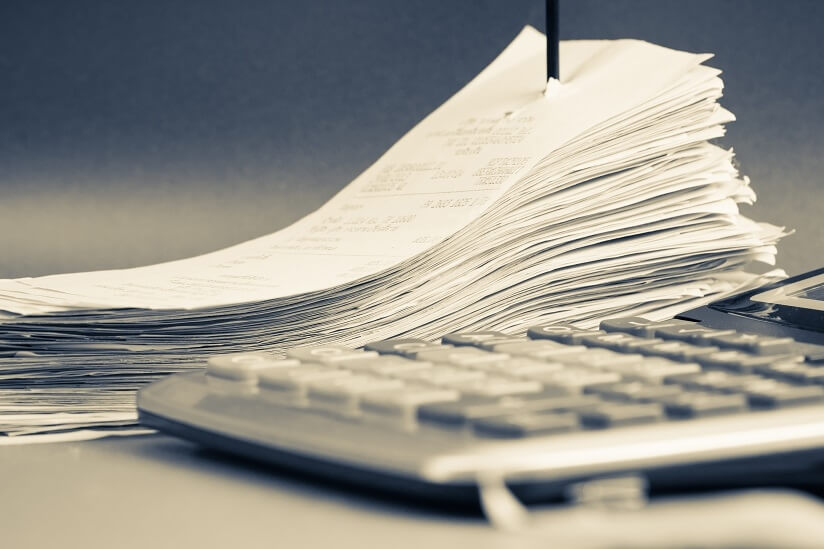
If you intend to make any deductions on your tax return, it is vital to keep a detailed record of your receipts. While it is not necessary to send receipts to Revenue along with your tax return, they will be required if you are selected for audit.
In the event of an audit, you will need to provide documentation which supports every figure stated in your tax return. And, as your annual tax return can be audited at any time within a six year period, you will need to keep all relevant files such as invoices, bank statements, cheque & cash books and expense receipts in a safe place.
We take the hassle out of filing your Irish tax return
Allowable expenses
Allowable business expenses can be used to reduce your overall tax bill.
In order for an expense to be regarded as business related – and therefore allowable as a deduction from your tax bill – it must be:
- Regarded as a ‘Revenue expense’ and not a ‘Capital Expense’. A Capital Expense is an expense that is normally once off purchase of an asset (for example, a car, furniture or computer). A Revenue Expense normally refers to expenditure which is incurred on an ongoing basis (e.g. electricity or stationery).
- Incurred ‘wholly and exclusively for the purpose of the trade’.
- Not specifically disallowed in tax legislation.
And, where an expense relates to both business and private use, only the proportion of the cost that relates to business activity can be expensed.
Work space

There are a number of common allowable expenses which relate to work spaces.
For starters, renting out an office space is an allowable expense. Utility bills such as heating, lighting, telephone and internet are also allowable as well as the cost of insuring the business premises and the contents.
And, if you work from home, these expenses are still allowable to the extent of the business use only. In other words, you must divide each expense into the percentage that occurred from personal use and the percentage that occurred from business use.
Do you work from home?
If you are working from a home office or even spend some of your time working from home, you can claim a percentage of expenses such as home broadband, telephone, gas and electricity. You can only claim for the percentage of the cost that relates to business use.
Wear & Tear
An annual wear and tear allowance is available at a rate of 12.5% of the cost per year, for a maximum of eight years.
In order for a trader to claim capital allowances on expenditure incurred on an asset:
- They must have incurred the expenditure for the purpose of the trade
- The asset must be in use at the end of the accounting period
- The asset must be used wholly and exclusively for the purpose of the trade
It is essential that all of these conditions are met.
Office equipment (items of a capital nature) such as computers, printers, copiers and fax machines can be included on your list of tax deductibles.

Machinery and cars can also be included although it should be noted that tax relief is spread over an 8 year period.
Meanwhile, there are specific rules regarding the capital allowances that can be claimed on motor vehicles. These rules relate only to passenger motor vehicles and not to other commercial vehicles, lorries etc. From 1 July 2008 the qualifying cost available for capital allowances purposes varies depending on the CO2 emissions level of the vehicle.
Capital allowance can also be claimed for industrial buildings. Generally, industrial buildings are written off on a straight line basis over a 25-year period (the tax life of the building), so that a trader may claim an Industrial Building Annual Allowance (IBAA) of 4% of the qualifying cost each year. IBAA can only be claimed where expenditure is incurred on the construction or acquisition of an industrial building, which is in use at the end of the accounting period.
There are certain circumstances where a trader may be able to claim a higher IBAA. Expenditure on private convalescent homes, private hospitals, qualifying sport clinics, qualifying residential units, private nursing homes and child care facilities all qualify for IBAA at 15% per annum.
We take the hassle out of filing your Irish tax return
Motoring
You can also claim tax relief if you use your car for business reasons.
For example, you can deduct running expenses, motor tax, insurance, service, tires, driver’s licence costs, NCT and repairs from your tax bill.
However, it’s important to note that if the car is used for more than business use you can’t expense costs that relate to personal use.
Professional Services
Should you require the services of an accountant or financial agent to manage your accounts or help you to file your tax return, you can include the associated costs on your list of allowable expenses.
You can also claim tax relief if you are availing of the services of business consultants, training providers, legal agents, auditors and marketing & PR services etc.
Finance lease payments for vehicles or machines that you use in your business
You can also claim the full lease payment for vehicles or machines that you use in your business (capital and interest payment) against your self-employment income.
Interest paid on business loans
Interest incurred wholly and exclusively for trade purposes is allowed against your trading profits.
Other allowable expenses:
- The purchase of goods for resale
- Employees’ pay
- Some pre-trading expenses
Can you claim tax free travel and subsistence?
Mileage and subsistence schemes are for employees only, a sole-trader can only claim a percentage of all motor expenses (all running costs – fuel, repairs, insurance & tax) and travel expenses (hotel, train). You will need to keep all the receipts for these costs, so be careful and don’t lose them.
The amount you can claim is the business element of the overall costs. Be realistic, Revenue are not going to believe that you use your car 100% of the time for business!
We take the hassle out of filing your Irish tax return
Considering making pension contributions?
While pensions have gotten bad press over the last few years, making a pension contribution will reduce your tax bill and is always worthwhile considering. However, it is a good idea to seek financial advice before making a final decision.

What you can’t expense
There are a variety of expenses that are commonly included as expenses on tax returns, but in reality are not an eligible deduction.
Stamp Duty
If you purchase a property with the intention of renting it out, you’ll have to pay 1% Stamp Duty on any purchase up to €1,000,000 and 2% balance on any amount above that. It’s important to keep in mind that money paid on Stamp Duty can’t be expensed against your earnings.
Food
Food is very rarely allowable as an expense. Should an event arise where you undertake a business trip related to your Airbnb accommodation, you can expense any related food costs from the trip.
However, if you want to boost your accommodation offering by providing a free welcome basket of fruit to your guests, you can’t include these costs as an expense. And, if you meet someone for lunch, you can’t generally claim that as an expense.
Commuting
Costs relating to a commute are also rarely applicable. For example, if you are non-resident at your Airbnb offering, you can’t expense any costs that occur from travelling to and from the accommodation.
Entertainment
If you want to treat a client to a night out at a concert or show, you generally can’t use these expenses to reduce your tax bill.
Other non-allowable expenses:
- Your own pay
- Clothing (with some exceptions)
- Interest on late payment of tax, e.g. VAT, PAY/PRSI, etc.
- The creation or increase of general provisions, e.g. general bad debt provisions, general inventory provisions etc.
- Provisions for repairs
- Motor leasing expenses (for certain categories of cars) – with effect from 1 July 2008, the amount of lease charges which are allowed in calculating taxable income will depend on both the price of the car and its CO2 emission.
- Depreciation – however, the expenditure may qualify for capital allowances
- Charitable and Political subscriptions – however, trade subscriptions are allowable
- Other tax charges – e.g. parking fines, stamp duty, etc.
If the expense is disallowed for tax purposes, it can’t be claimed against your self-employment income.
We take the hassle out of filing your Irish tax return
Expenses for income earned through the Sharing Economy

Thousands of people earn money by selling their goods and services through the Sharing Economy – for example renting out a room on Airbnb, delivering food with Deliveroo and renting out a spare car parking space.
However, income earned through the Sharing Economy – even if it is not your primary source of income – is taxable and you must declare it to Revenue.
In the course of operating your Sharing Economy business, it is likely you incurred numerous business expenses and many of these can be deducted from your gross income to reduce your overall liability.
General examples of qualifying expenses are:
- fees and charges associated with signing up to advertise your services on a website
- legal and accounting fees
- costs for the supply of necessary equipment
It’s important to note that you can only expense costs which have wholly and exclusively occurred for the purposes of the trade. You can’t include costs which occurred during personal use.
For example, Michael uses his bike exclusively to deliver food with Deliveroo at weekends. He also uses the bike for personal reasons during the week. Michael is entitled to claim 2/7s of the costs associated with maintaining his bicycle. In other words, Michael is claiming for the two days of the week where the bike was used for business. So if his total maintenance costs are €100, he can expense €28.57.
Similarly, Phil advertises his part-time gardening services on Adverts.ie. He uses his personal gardening tools while providing his services. Phil needs to keep a detailed record of the number of days he worked gardening during the year so he can calculate exactly how much he can expense if he needs to purchase new tools. If he works as a gardener for 100 days in a year and the cost of new tools is €500, he will be entitled to expense €136.98.
Phil can also expense costs associated with travelling to and from locations for gardening.
If you own a vehicle that’s used for both business and personal purposes, you’re entitled to claim a percentage of the actual running costs (fuel, repairs, servicing, etc.) which relate solely to trade use.
If you offer dog minding services, you can expense the costs associated with caring for the animal (such as food and bedding).
Meanwhile if you’ve developed a trade from renting dresses on Rentmydress.ie, you can expense any costs associated with cleaning the clothes when they’re returned.
We take the hassle out of filing your Irish tax return
![]()
If you are earning money through Airbnb – i.e. renting out your home or a room in your home for profit – there are potentially a number of costs you can deduct to reduce your tax liability including:
Note: These deductions are mainly associated with Case I ‘trading’ income. Fewer expenses are allowed under Case IV ‘miscellaneous’ income and each expense is assessed by Revenue on a case-by-case basis to determine if it is allowable.
Also, you can only expense the percentage of these costs that were used for your Airbnb business. If you can’t work out exactly how much you should charge, you can attribute the costs based on the size of the room used in comparison to your home and the number of days that you’ve had guests throughout the year. If you’re renting out your entire house, simply attribute the costs based on the number of days guests stayed in your home that year.
1) Repairs and maintenance

You can expense repair and maintenance costs involved in the upkeep of your home including:
- replacing broken windows and locks
- servicing boilers
- supplying new furnishings and fittings
- purchased cleaning supplies
- laundry
2) Agent fees
In many cases, money is transferred electronically between guests and Airbnb hosts. If you prefer to receive cash, and you use an intermediary to collect fees (for example if you are a non-resident), this service is tax-deductible.
You can also expense the service fees (currently levied at 3% of the total reservation) that every host is charged by Airbnb.
3) Utilities
You can also expense your utilities such as:
- gas
- electricity
- TV bills
- internet
4) Local Service Charges
You can also expense any local council costs relating to your rental property, including rubbish collection and recycling. Of course, if you choose to pass these charges to your guests, you can’t claim them back later as an expense.
5) Advertising
Anything you pay towards publicising property you want to rent is fully claimable as an expense.
6) Legal or Accounting Fees
You can also expense any legal or accounting fees you have paid which relate to letting out your Airbnb property. For example, if you have paid for professional advice relating to Stamp Duty, you can include this as a deduction.
7) Insurance
In short, if you’ve taken out any insurance policy relating to a rental property, you’re entitled to claim expenses on any premiums you have had to pay.
However, if you are renting out a room within your own home, you can’t expense the entire premium.
8) Mortgage
You can also claim tax relief if you are paying interest on a mortgage taken out to buy or improve the property that you have listed on Airbnb.
9) Conference
If you attend a conference or seminar with a view to educating yourself about property management and starting an Airbnb business, all registration fees can be included as a tax deductible.

![]()
We take the hassle out of filing your Irish tax return
Blogging expenses
Blogging has been increasingly popular in Ireland in recent years – both as a profession and for leisure. There are a number of things bloggers can expense to reduce their tax bill.
Of course, the type of expense you incur will depend on the type of subject that you blog about. There are some general blogging expenses though such as stationary, internet, travel to meetings and events (including reviewing a concert or movie) and these can all be expensed.
Expenses for rental income

General expenses
You can claim certain expenses against your rental income to reduce the amount of tax you will have to pay.
Allowable expenses include:
- rates you pay to a local authority for the property
- rents you pay for property such as ground rents
- insurance premiums against fire and public liability
- maintenance of your property such as cleaning, painting and decorating
- property fees before you first rent out your property such as management, advertising, legal or accountancy fees
- the cost of any service or goods you provide that do not get repaid by your tenant such as electricity, central heating, telephone, service charges, water and refuse collection
- certain mortgage protection policy premiums
- expenses in between renting out the property in certain circumstances
- capital allowances
- repairs, such as rot treatment, mending windows, doors or machines
You must keep full and accurate records of all expenses for each property you rent out.
Capital Allowances
You can claim capital allowances, known as ‘wear and tear allowances’. A capital allowance is a yearly tax deduction which may be offset against your rental income.
The wear and tear allowance is allowed at a rate of 12.5% of the cost of furniture and fittings for your rental property over eight years. The expenditure must be incurred wholly and exclusively in respect of the property let.
The allowances may include:
- furniture you purchased for your rental property
- the cost of the purchase of white goods such as a fridge or a dishwasher
Capital allowances are allowed for the full year where the basis period is 1 January to 31 December. Where the basis period is different and does not cover the full year, the wear and tear allowance must be restricted.
Non-allowable expenses
It is not allowable to deduct the following expenses when you are calculating your rental profit or loss:
- pre-letting expenses, other than property fees before you first rented out the property
- post-letting expenses
- capital expenses on property improvements unless allowed under an incentive scheme
- expenses on premises rented out on an uneconomic basis, where it is not possible to make a profit from the rent received
- expenses in between renting out the property in certain circumstances
- interest from the time you buy the property up until it is first rented out
- Local Property Tax (LPT)
- any cost for your own labour when carrying out repairs to the property
Pre-letting expenditure on rental expenses
Some expenses incurred on a vacant residential premises prior to it being first let after a period of non-occupancy are allowable as a deduction against rental income from that premises under certain conditions.
- The premises must have been vacant for at least 12 months and then let as a residential premises between 25th December 2017 and 31 December 2021
- A ‘vacant premises’ is any premises that is not occupied for the entire 12 months before the ‘specified day’ (the day on or after 25th December 2017 on which a vacant premises is first let as a residential premises).
- The expenditure must have been incurred in the 12 months before the premises is let as a residential premises. This is known as the ‘specified period’.
- Where an expense is incurred on a vacant premises during the 12 months prior to first letting after the 12 month vacant period, and this expenditure would be otherwise qualifying if it had been incurred on or after the first day the premises was let, then it may be authorised.
- The deduction is subject to a cap of €5,000 per vacant premises and to claw-back in certain circumstances. If you incur the expenditure and then cease to let the property as a residential premises within 4 years of the first letting, the deduction will be clawed-back in the year in which the property ceases to be let as a residential premises.
We take the hassle out of filing your Irish tax return
Rent-a-Room Relief

Rent-a-room relief allows homeowners to earn tax-exempt rental income from private tenants. By renting out a room in your house you can earn tax-free income as long as it doesn’t exceed €14,000 in a tax year (limit was €12,000 in 2016 and 2015 and €10,000 in 2014 and previous years). This limit applies to the gross amount of income received before you deduct expenses.
A self-contained unit, such as a basement flat or a converted garage attached to your home can also qualify for this relief.
To qualify for rent-a-room relief:
- Your home must be located in the state
- You must occupy it as your sole residence during the year of assessment (it’s your home for the greater part of the year)
- You don’t need to own the property – you could be a tenant and be subletting to someone else (you may need to check if your landlord allows subletting)
You will not qualify for the relief if:
- Your gross income from rent and related services is over €14,000
- You’re renting the room in your home to your son or daughter (there’s no restriction in the case of other family members)
- You’re an employee or office-holder in a company and the company pays you to allow clients to use the room in your home on an occasional basis
- You rent the room to short-term guests
If you qualify for rent-a-room relief, the income you get from renting out the room is not liable to PRSI, the Universal Social Charge or income tax. However, it must be included on your annual income tax return.
When making an annual tax return, you should record your rental income for rent-a-room relief in the ‘Exempt Income‘ section of your tax return form at the end of the tax year and return the completed form to your local tax office.
If you don’t make an annual tax return and your income from rent and related services is under the exemption limit, you don’t have to claim rent-a-room relief as it will apply automatically.
Why you might opt out of rent-a-room relief
You can’t deduct expenses from your rental income while claiming rent-a-room relief. However, depending on the circumstances, it might be worth your while to opt out in a particular year so that you can offset expenses against rental income and avail of wear and tear allowances.
To opt out of the rent-a-room relief in a particular tax year, you must notify Revenue in writing, on or before the return filing date for that tax year. If you make an annual tax return, you can opt out by marking the relevant box in the ‘Exempt Income’ section of the return, otherwise you can write to your tax district to say you don’t wish the relief to apply.
What lets qualify for rent-a-room relief?
The relief applies only to residential tenancies and not to short-term guest arrangements. So for example you’ll be covered if you’re renting a room to a student for the academic year or for a one-month course. But taking in guests for short breaks won’t qualify (such as letting out a room on Airbnb for a week).
If you normally rent out the room for the academic year and you rent it out for short breaks during the summer as well, you must identify the income you get from the short rentals separately from the income that qualifies for rent-a-room relief when making your tax return to Revenue.
We take the hassle out of filing your Irish tax return
Relief on property
Help-to-Buy Incentive
If you’re looking to buy a home in Ireland for the first time, the Help-to-Buy (HTB) Incentive will give you a refund of income tax and DIRT paid in Ireland from the last 4 years.
You must buy or build the property to live in as your own home and to claim you must:
- Be a first time buyer
- Buy or build the property between 19 July 2016 and 31 December 2021
- Live in the property as your main home for 5 years after you buy or build it
- Be tax compliant or if you’re self-assessed you must have tax clearance
You must not have built or bought an apartment or house previously on your own or jointly with another person. If you’re buying or building a property with anyone else, they must also be first time buyers.
Anyone buying a property must have signed the contract to buy that property on or after 19 July 2016. If self-building, you must have drawn down the first part of the mortgage on or after that date.
The contractor you’re buying your home from must be approved by Revenue. You can check the list of approved developers and contractors to make sure they’re approved.
The property must be:
- your home
- newly built where the construction is subject to Value Added Tax (VAT) in Ireland
The property must not have been used or been suitable to use as a residential home previously and, if the property was non-residential but is converted for residential use, it may qualify for HTB.
However, if you buy or build the property as an investment, it will not qualify.
Purchase value
If you bought the property between 19 July 2016 and 31 December 2016, the purchase price must be €600,000 or less. If you bought it after 1 January 2017, it must be €500,000 or less. The purchase value of a new build means the price you bought it for. For self-builds, the purchase value is the approved valuation by the lender at the time you took out the mortgage.
Mortgage
For a mortgage to qualify, you must take out your mortgage on the property with a qualifying lender and it should be used only for buying or building the property. The loan must be at least 70% of the purchase value of the property and you’re permitted to have a guarantor on the loan.
How much can I claim?
You can claim the lesser of these:
- €20,000
- 5% of the purchase price or 5% of the completion value of a self-build property
- amount of Income Tax and Deposit Interest Retention Tax (DIRT) you paid in the 4 years before your purchase or self-build
The maximum payment is €20,000 per property. This cap applies regardless of how many people enter into a contract to buy a house. Universal Social Charge (USC) or Pay Related Social Insurance (PRSI) aren’t taken into account when calculating how much you can claim.
How will I receive the refund?
- If you bought or built the property between 19 July 2016 and 31 December 2016, the refund will be paid directly to you
- If you buy a new build after 1 January 2017, the refund is paid to the contractor
- If you self-build the property after 1 January 2017, the refund will be paid to the bank account of your loan provider
We take the hassle out of filing your Irish tax return
Home Renovation Incentive (HRI)

Owner occupiers of a main home or landlords of rental properties may be eligible to claim tax relief under the Home Renovation Incentive (HRI) Scheme.
HRI provides tax relief by way of an income tax credit at 13.5% of qualifying expenditure on repair, renovations, or improvement works on your main home or rental property by qualifying contractors.
You can claim tax relief on these works if they total over €4,405 (before VAT at 13.5%) per property. The jobs must be carried out anytime, by a qualifying contractor, from 25 October 2013 to 31 December 2018 for homeowners and from 15 October 2014 and up to 31 December 2018 for landlords.
Work you can claim the HRI for:
- Extensions
- New heating system
- Insulation
- Bathroom upgrades
- Installing a stove
- Attic conversions
- Fitting new alarm systems
- Solar panels
- Plumbing
- Plastering
- Driveways
- Conversion of residential premises into rental units
- Tiling
- Rewiring
- Radon remediation work
- Painting and decorating
Does the work still qualify if I get a grant?
Yes, but not the full amount. The qualifying expenditure will be reduced by 3 times the amount of the grant.
So for example:
You pay €10,000 on upgrading insulation and receive €2,700 under the Better Energy Homes Scheme.
So, the €10,000 will be reduced by €2,700 X 3 or €8,100.
€10,000 less €8,100 leaves €1,900
The €1,900 has a VAT of €226
Under the scheme, you can claim a tax credit on €1,900 less the €226
The tax credit is: €1,674 X 13.5% = €225.99
We take the hassle out of filing your Irish tax return
Capital Gains Tax (CGT) Deductions
If you have made an investment (for example in stocks, shares or currency), there are some deductions you can make to reduce your CGT liability. These include:
- Cost of acquisition
- Inflation index – if the asset / property was bought before 2003
- Expenditures incurred for the purpose of enhancing the value, for example, if a property was bought in 2005 for €200,000 and in 2007 a small guest house was built for €80,000 on the property. In this case, disposal of the whole property the cost to be deducted for tax purposes would be €280,000.
- All incidental expenses incurred either on acquisition or disposal of the property such as solicitor’s fee, advertising costs, auctioneer’s fee etc.
Capital Gains Tax (CGT) Reliefs
There are a number of reliefs relating to CGT which are available in certain circumstances. These reliefs help to reduce the amount of tax due on a disposal.
(1) Indexation Relief (or inflation relief)
You can claim indexation relief if you owned the asset before 2003 and the market value of the asset at the time you became the owner is increased based on an inflation calculation by the Central Statistics Office (CSO). Indexation relief operates by adjusting the acquisition cost of a chargeable asset for inflation.
For example, if land is being used for development, relief applies to the value that the land would have had at the date you became the owner (when it wasn’t development land).
Indexation applies to all deductible expenditure from the tax year in which it is incurred to the earlier of:
- the tax year in which the asset is disposed of
or - 1 January 2003
Deductible expenditure includes:
- Cost of acquisition
- Incidental acquisition costs
- Enhancement expenditure
In respect of assets purchased prior to 6 April 1974, you will have to index the market value of that asset at 6 April 1974 and not the original cost of the asset.
Indexation relief was abolished for the tax year 2003 and any year thereafter, however you can get indexation relief up to and including 2002. If you acquired the property in 2003 or any subsequent year, then you can’t avail of this relief.
(2) Principal Private Residence Relief (PPR relief)
You will be exempt from CGT if you dispose of a property which you used as a sole or main residence. This exemption also applies to gardens or grounds of up to one acre. You must occupy the residence for the full period of ownership in order to claim Principal Private Residence Relief (PPR) in its entirety.
Some periods of absence qualify as periods of occupation including:
- The last 12 months of ownership of the property, irrespective of whether you actually reside in the property during this period. However, the property must have been used as your PPR at some time during the period of ownership of the property
- Periods of absence (no more than 4 years in total) during which you’re required to live elsewhere in Ireland by the conditions of your employment. However, you must occupy the residence as a PPR both before and after the periods of absence.
- Any period of absence throughout which you work abroad as a condition of your employment. However, for this period to qualify as occupation you must occupy the residence as a PPR both before and after the periods of absence.
Note: All periods prior to 6 April 1974 are ignored when calculating the period of ownership.
During a period of absence you can’t have another residence that would qualify as a PPR.
Where the period of ownership of a property does not qualify as a period of residence, or deemed residence, the gain on the disposal needs to be apportioned between the exempt and the taxable gain.
Only one residence per individual, or married couple living together, qualifies for PPR relief. An exception to this rule applies where a property is provided, rent free and for no consideration, to a dependent relative, who uses the property as their PPR. Where a property so provided is disposed of and a gain is realised then PPR relief is available to you in addition to the relief available in respect of your own private residence.
(3) Farm Restructuring Relief

If you dispose of land to make your farm more efficient then you may be able to claim this relief. Teagasc (the Agriculture and Food Development Authority) must issue a certificate in order for you to claim this relief.
This certificate must state that you carried out the transaction for farm restructuring purposes.
Conditions
- The first sale or purchase must be from 1 January 2014-31 December 2023.
- The next sale or purchase must be within 24 months of the first sale or purchase.
- You may also be able to claim relief where you exchanged land with another person.
The amount of relief you can claim will be reduced if the land has a higher value than either:
- Land you purchased
- Land you received in exchange for your land
We take the hassle out of filing your Irish tax return
(4) Revised Entrepreneur Relief
This relief is for you if you made gains from the disposal of business assets. There is a lifetime limit of €1 million for this relief on gains made on or after 1 January 2016. This relief replaced a relief that applied for the years 2014 and 2015.
With this relief, you must pay CGT at the rate of 10% on gains from the disposal of business assets. This is reduced from the normal rate of 33%. Up to 31 December 2016, gains from such disposals are charged at 20%.
(5) Compensation and insurance money
You must pay CGT if you receive compensation or insurance money, however if you use the money to replace an asset you may defer the CGT.
The compensation you get reduces the cost of the asset. It can also reduce the replacement cost of the asset if you have lost it or it was destroyed.
Example:
Matthew receives compensation from his insurance for damage resulting from a recent flood. If he uses the money to repair damage to the property he can defer the CGT payment until the property is sold.
(6) Land or buildings acquired between 7 December 2011 and 31 December 2014
If you dispose of land acquired between 7 December 2011 and 31 December 2014 then you may be due relief on CGT. You must have owned the land or buildings for at least 7 consecutive years.
You can reduce the gain by the number of years you owned the property divided by 7 years, so if you owned land or buildings for 10 years, the gain will be reduced by 70%.
You can claim this relief in respect of land or buildings in this country or in any European Economic Area (EEA) state.
(7) Disposal of a business or farm other than to your child (Retirement Relief)
If you’re 55 or older, you may be able to claim relief on disposing any part of your business or farming assets. Although this is called Retirement Relief, you don’t need to retire to avail of it. The relief takes the form of a reduction in the CGT payable on gains accruing on the disposal of the qualifying assets.
In order for the disposal to qualify for the retirement relief, the following conditions must be met:
- You must be an individual
- You must be at least 55 years of age at the date of disposal
- The relief is available in respect of qualifying assets
- You must have owned the qualifying assets and used those assets for the purposes of your business for at least 10 years prior to the date of disposal
Qualifying assets are:
Business assets – the chargeable business assets which an individual has owned for at least 10 years ending with a disposal.
A chargeable business asset is an asset (including goodwill but not shares or securities or other assets held as investments) which is, or is an interest in, an asset used for the purposes of farming, or a trade, profession, office or employment, carried on by an individual. This condition does not extend to moveable chattels which qualify for relief irrespective of the period of ownership. Items such as debtors, stock, bank balance etc are not included in the term chargeable business asset, as no chargeable gain would result from their disposal.
Shares in a family company – where the assets being disposed of are shares in a ‘family company’ which is either a trading company, a farming company or a holding company of a trading group, the shares of which have been owned by the individual for at least 10 years ending with the disposal and in which the individual has been a working director for at least ten years and a full-time working director for at least five of those years.
Shares in a company include value relating to goodwill but do not include value relating to other shareholdings, securities or other assets held as investments.
A family company is a company where the individual holds either:
- at least 25% of the voting rights in the company;
or - at least 10% of the voting rights and not less than 75% of the voting rights are controlled by members of his/her family (including the person making the claim)
‘Family’ includes spouses and civil partners, direct relatives (siblings, ancestors or lineal descendants) and direct relatives of spouses and civil partners.
Land, machinery or plant owned by the individual for at least 10 years and used by his ‘family company’ throughout that period are also eligible provided these assets are disposed of by the same individual at the same time and to the same person as the shares in the family company.
Land used for the purposes of farming carried on by the individual which they owned and used for a period of at least 10 years (ending with the transfer of an interest in that land for the purposes of complying with the schemes of early retirement from farming operated by the Department of Agriculture, Fisheries and Food).
Farm land that is subject to a compulsory purchase order by a local authority for the purposes of road widening – if at the time of the compulsory purchase (or at any time in the preceding 5 years) the farmer had let out the land then the farmer must have used the land for the purpose of farming for at least 10 years immediately before the time the land was let.
Land which has been owned and used by the individual for the purposes of farming carried on by the individual for not less than 10 years, and subsequently the land is set for up to 25 years may qualify for the relief. Where there is a disposal to a third party of let land, each letting of the land must be for a period of not less than 5 consecutive years. Land let under a conacre arrangement may, in certain circumstances, also qualify for retirement relief. Land that is let under conacre prior to the disposal to:
- A child at any time, or
- A third party where the disposal occurs on or before 31 December 2016
will qualify for retirement relief.
Where retirement relief is claimed in a tax year, you are prohibited from claiming the annual exemption of €1,270 in that same year (even against other disposals arising in that year).
There are some circumstances in which you may qualify for this relief before 55:
- You’re unable to continue farming due to ill health
- You reach the age of 55 within 12 months of the disposal
For disposals made up to and including 31 December 2013, you can claim full relief if the market value at the time of disposal doesn’t exceed €750,000.
The threshold is €500,000 if both of the following apply:
- The disposal takes place on or after 1 January 2014,
and - you’re 66 or older
If the market value is more than the above threshold, marginal relief may apply which limits the CGT to half the difference between the market value and the threshold.
The threshold of €750,000 (€500,000 after 1 January 2014 for persons aged 66 or older) is a lifetime limit. If you exceed this threshold, relief will be withdrawn on earlier disposals.
We take the hassle out of filing your Irish tax return
(8) Disposal of a business or farm to your child

If you dispose of all or part of your business or farming assets to your child, you may be entitled to relief from CGT.
Your child in this case can include:
- A child of your deceased child
- A niece or nephew who worked full-time in the business or farm for at least 5 years
- A foster child whom you maintained for at least 5 years
The amount of relief depends on your age at the time of disposal:
- Up to 31 December 2013, you may claim full relief if you’re 55 or older
- From 1 January 2014, you may claim full relief if you’re between 55 and 65
- If you’re 66 or older the relief is restricted to €3 million
If your child disposes of the asset within 6 years, relief will be withdrawn and your child must pay CGT on the original disposal by you, in addition to the CGT on their own disposal.
You need a CG50A (CGT Clearance Certificate) certificate if:
- You sell an asset on or after 25 March 2002 for over €500,000
- You sell a house or apartment on or after 1 January 2016 for over €1 million
The buyer is obliged to withhold 15% of the purchase price from you if you don’t have a CG50A Form. The buyer will then give you a Form CG50B. This will allow you to reclaim the amount withheld by them from Revenue at a later date.
You can apply for a CG50A using a Form CG50 and you must meet at least 1 of the following criteria:
- Be resident in the country
- Have paid CGT on the disposal, if it’s due
Alternatively, you can use the following Tax Clearance Certificates:
- A current Tax Clearance Certificate
- A certificate of authorisation (C2 cert)
- A Tax Clearance Certificate issued specifically for the purpose of Section 980, Taxes Consolidation Act 1997
We take the hassle out of filing your Irish tax return
(9) Disposal of chattels
There are two types of chattels – wasting and non-wasting.
A wasting chattel:
- Wastes away over its life
- Has predictable life of less than 50 years
- Examples include livestock, plant and machinery
In the majority of cases, wasting chattels are exempt from CGT.
A non-wasting chattel:
- Does not waste away over its life
- Has a predictable life of more than 50 years
- Examples include antique furniture, paintings, and jewellery
Exemption from CGT only applies where the sale proceeds on the disposal are less than €2,540. The exemption applies to every separate non-wasting chattel disposed of in a tax year of assessment. Where the sales proceeds received are slightly in excess of €2,540, marginal relief exists to restrict the tax payable.
CAT reliefs
Dwelling house exemption
In certain circumstances, outlined below, inheritances of dwelling houses may be exempt from CAT.
- the dwelling house must be the principal private residence of the disponer (someone who legally transfers their own property another person) at the date of their death
- the dwelling house must have been continuously occupied by the beneficiary as their only or main residence for a period of three years before the date of the inheritance
- the beneficiary must not be entitled to an interest in any other dwelling house at the date of the inheritance
and
- the beneficiary must continue to occupy the dwelling house as their only or main residence for a period of six years after the date of the inheritance.
Gifts of dwelling houses to dependent relatives of a donor may also qualify for the exemption in certain circumstances. A dependent relative is a direct relative of the donor, or of the donor’s spouse or civil partner, who is permanently and totally incapacitated because of physical or mental infirmity from maintaining himself or herself or who is over the age of 65. Where a gift of a dwelling house qualifies for the exemption, the dwelling house does not have to have been the principal private residence of the donor.
Favourite Nephew Relief
‘Favourite Nephew or Niece’ Relief allows you to treat your nephew or niece as your ‘child’ when giving them a gift or inheritance.
Under this relief, your nephew or niece is a child of your:
- brother
- sister
- brother’s civil partner
- sister’s civil partner
This relief changes the relationship of a nephew or niece of a disponer from a Group Threshold B to Group Threshold A for CAT purposes. The Group Threshold A for the nephew or niece will only apply to business assets or shares in a private trading company. If non-business assets are received in the same gift or inheritance, the Group B threshold will apply to the non-business assets.
We take the hassle out of filing your Irish tax return
Conditions for the relief
To qualify for the relief your nephew or niece must have worked substantially (on a full-time basis) for a period of five years prior to the gift or inheritance in carrying on, or assisting in the carrying on, the trade, business or profession, of the disponer.
In order for the nephew or niece to be deemed to be working substantially on a full-time basis in the business he or she must work at least:
- more than 24 hours per week at the place where the business, trade or profession is carried out
or - more than 15 hours per week at the place where the business, trade or profession is carried out exclusively by the disponer, any spouse or civil partner of the disponer and the nephew or niece.
In addition to a claim for favourite niece/nephew relief, you could also be entitled to claim CAT agricultural relief or CAT business relief if you are eligible.
Agricultural Relief
Agricultural relief applies in respect of both gift tax and inheritance tax. Under this relief you will be charged at a reduced market value (or ‘agricultural value’) on the particular agricultural property.
If you qualify, the market value of your agricultural property will be reduced by 90%.
Note: this calculation isn’t necessarily equivalent to charging CAT on 10% of the market value as deductions from the (90%) reduced agricultural value may be allowed in respect of certain items.
To qualify for agricultural relief, the following conditions must be satisfied:
- The property or assets received must constitute ‘agricultural property’ (defined below) at the date of the gift, or death (in the case of an inheritance)
- They must also constitute ‘agricultural property’ on the valuation date, if this is different from the date of the gift or inheritance. The beneficiary must satisfy the ‘80% agricultural property’ test on the valuation date after taking the property/assets
- The beneficiary, or lessee where the beneficiary leases the agricultural property, must satisfy the various ‘active farmer’ requirements
To qualify it must be:
- Agricultural land, pasture and woodland situated in the European Union
- Crops, trees and underwood growing on such land
- Farm buildings and dwelling houses (and the land) that are proportionate in size and character to the requirements of the farming activities
- Farm machinery situated on the property
- Livestock and bloodstock on the property
- European Union ‘single farm payment’ entitlements
- Milk quotas where transferred with agricultural land (Revenue practice) Market gardens, ‘factory’ farms used for intensive rearing/production and fish farms do not constitute agricultural property unless they are part of the agricultural land. However, they may qualify for a similar type of relief known as ‘business relief’
The agricultural value of a gift or inheritance of agricultural property is 10% of its total market value. A similar calculation is applied to deductions, which can include costs and expenses.
You can claim Agricultural Relief through an IT38 return.
If you inherit or receive a gift of agricultural property that doesn’t qualify for Agricultural Relief, it may qualify for Business Relief.
We take the hassle out of filing your Irish tax return
Business Relief
You may receive gifts and inheritances up to a set value over your lifetime before having to pay CAT. Once due, it is charged at a rate of 33%. ‘Gifts’ become ‘inheritances’ if the person dies within 2 years of giving the gift. There is relief available from capital acquisitions tax on gifts and inheritances taken on or after 11 April, 1994 of relevant business property. The relief doesn’t apply to discretionary trust tax.
The relief amounts to a flat 90% reduction in respect of the taxable value of relevant business property. To claim Business Relief you will need to file an IT38 CAT Return.
Credit for CGT paid
You may be entitled to this relief in a situation where there is both a Capital Acquisitions Tax liability and a Capital Gains Tax liability in the same instance.
A credit for CGT paid may be claimed against CAT payable where CGT arises on the same event. However, the CGT credit taken can’t exceed the CAT liability.
If the asset is sold within 2 years of the date of the gift or inheritance, the credit for the CGT paid will be withdrawn.
Medical Expenses

Both PAYE (Pay as You Earn) and self-assessed workers are entitled to claim tax relief on qualifying medical expenses that accumulate during the tax year.
In the case of a qualifying expense, you can claim back 20% (relief for nursing home expenses can qualify for the higher rate of 40% where applicable) on the full cost of the unreimbursed expense back as a refund following the end of the tax year in which you had the expense. You can also go back 4 years to claim a refund of expenses you had in previous years.
To claim medical expenses file a Med 1 form (Med 2 form for dental expenses) by the end of the tax year – 31 December. You claim medical expenses based on costs that accumulated in the previous year – so for example if you had medical expenses in 2020, you can claim in 2021. If the cost occurs in a different year to which the treatment took place, you submit an expense for the year in which you paid for the treatment.
Qualifying medical expenses include:
- Doctor and consultant’s fees
- Treatments/items prescribed by a doctor or consultant
- Specialised dental treatment
- Treatment in a nursing home
- Laser-eye surgery
- Ambulance transport
- Routine maternity care
- In-vitro fertilisation
- Specific items for a qualifying child with a lifelong serious illness
- Educational psychologist’s assessments for a qualifying child
- Qualifying kidney patient’s expenses
The following if prescribed by a doctor:
- Medicines/drug treatments
- Cost of gluten-free food for coeliacs
- Wheelchair or wheelchair lift
- Hearing Aids
- Physiotherapy/podiatry
- Diagnostic procedures
- Orthopaedicbed or chair
- Glucometer medicine for diabetic
- Engaging a qualified nurse in the case of serious illness
Medical expenses from abroad
In certain circumstances you can claim for treatment that took place abroad including:
- Qualifying treatment from a GP
- Qualifying hospital treatments from a qualifying medical practitioner
Tax Relief at Source (TRS)
You may get a tax credit if you’re in a health insurance scheme. However this is usually granted by your health insurance company so you may not notice when it is applied.
This is called Tax Relief at Source (TRS). However, in some cases TRS doesn’t apply, for example in the case where your employer pays health insurance on your behalf so you may be able to apply for tax relief.
We take the hassle out of filing your Irish tax return
Free dental & optical check-ups

Self-employed people are entitled to a free dental and optical check-up through their PRSI contribution.
The benefits also extend to a worker’s dependent spouse, who will also have access to regular dental and optical examinations, free of charge. Self-employed people are also able to avail of a grant for hearing aids of 50% of the cost, to a maximum of €500 per aid, every four years.
Leaving employment to return to education
More and more people are choosing to leave employment and return to education. If you leave a job to upskill, you may be entitled to claim tax back.
For example if you pay fees to attend college, university or a training course, you may be able to claim relief. The limit on tuition fees you can claim is €7,000 per course and you’ll receive relief at the standard rate of tax which is 20%.
If you’re studying more than one third level course at the same time, the amount of qualifying fees is restricted to €7,000 per course and a single disregard amount (further detail below) is applied to the claim.
Relief can also be claimed if you are paying for someone else (for example a son or daughter) to attend college. Self-employed people can claim the credit by completing the Tuition Fees section on the annual tax return.
Note: No relief is available for examination fees, registration fees or administration fees.
Disregard amounts
Every claim is subject to a single disregard amount each tax year. This amount is taken away from your qualifying fees so you can’t get relief on that portion of the fees.
If you’ve paid fees for more than one course or student, you only subtract the disregard amount once. There are different disregard amounts for each year and for full-time or part-time courses.
- Full-time course: €3,000
- Part-time course: €1,500
Restrictions
You can’t claim relief for fees funded by grants, scholarships or your employer. If you get partial funding, you must declare it to Revenue when you claim tax relief.
If you’ve already claimed tax relief for tuition fees and the fees are later refunded by the college, you must tell Revenue within 21 days of receiving the refund.
Undergraduate courses
To qualify for relief, an undergraduate course must:
- be carried out in an approved college
- last at least 2 academic years
Postgraduate courses
To qualify for relief, a postgraduate course must:
- be carried out in an approved college
- last at least 1 academic year but no longer than 4 academic years
- lead to a postgraduate award based on either a thesis or an examination
To claim relief on a postgraduate course, you must already have an undergraduate degree or equivalent qualification.
Postgraduate courses in publicly funded or duly accredited universities and institutions of higher education in non-European Union (EU) Member States also qualify for relief.
Payment of tuition fees
If you pay tuition fees in instalments, you can claim relief on your tuition fee instalments either:
- in the tax year the academic year commenced or
- in the tax year in which you paid the instalment
If you claim relief for the tax year when the instalment was paid, you must subtract then disregard the amount that applies to that year. It’s often more beneficial to claim relief in the tax year that the academic year commenced.
Alternatively, if you pay college fees in advance, relief can be allowed as follows:
- If details of actual amounts due for each year are available, then that amount is allowed each year for the duration of the course. This is subject to the ceiling of €7,000 per year along with the disregard amount that applies
- If no breakdown of fees is available, the relief can be divided evenly over the duration of the course
We take the hassle out of filing your Irish tax return
High Income Earner Restriction (HIER)
This restriction limits the use of certain tax reliefs and exemptions by high income individuals thus ensuring that they have an income tax liability of approximately 30% on the income sheltered by these reliefs.
The restriction may apply to you if:
- Your adjusted income is greater than or equal to €125,000 – less if there is income that is normally liable to tax at a specific rate (such as DIRT)
- Your specified reliefs are greater than €80,000
- The aggregate of your specified reliefs used are greater than 20% of your adjusted income
If you are subject to HIER, you must include it on your Form 11. You will also have to submit a calculation of the restriction on a Form RR1.
Artist’s exemption

Income earned by writers, composers, visual artists, and sculptors from the sale of their works is exempt from tax in Ireland in certain circumstances.
Revenue determines that certain artistic works are original and creative works (recognised as having cultural or artistic merit). Earnings derived from these works are exempt from income tax from the year in which the claim is made. The maximum amount of income that can be exempted is €50,000.
However, an artist’s exempt income is still subject to USC.
If you want to claim an Artist’s Exemption you must be resident or ordinarily resident and domiciled in an EU member state or in EEA State.
Revenue can make determinations in respect of artistic works such as:
- Books or other forms of writing
- Plays
- Musical compositions
- Paintings or other similar pictures
- Sculptures
Your work must be original and creative with either cultural or artistic merit:
Cultural merit – its contemplation enhances the quality of individual or social life as a result of its intellectual, spiritual or aesthetic form and content.
Artistic merit – its combined form and content enhances or intensifies the aesthetic apprehension of those who experience or contemplate it.
Original and creative work – The term original and creative encompasses any unique work brought into existence for the first time by the use of its creator’s imagination.
A nonfiction book or other piece of writing will be considered original and creative only if it’s an example of one of the following categories of literature encompassing the subjects of fiction writing, drama, music, film, dance, mime or visual arts and any related commentaries by artists:
Examples of non-fiction work considered:
- Arts criticism
- Arts history
- Arts subject works
- Arts diaries
- Autobiography
- Belles-lettres essays
- Biography
- Cultural dictionaries
- Literary translation
- Literary criticism
- Literary history
- Literary diaries
And:
- The essence of the work is the presentation of the author’s own ideas or insights in relation to the subject matter and these ideas or insights are so significant that the work would be regarded as a pioneering work casting new light on its subject matter or changing the generally accepted understanding of the subject matter
or
- the publication comes fully within the terms of reference of the Heritage Council including work that in its entirety, is a work of archaeology or a publication associated with items or areas of significant heritage value
or
- it’s a publication that comes fully within the terms of reference of the National Archives Advisory Council and relates to archives concerning Ireland that are more than 30 years old and are based largely on research from such archives
The following types of work aren’t regarded as original and creative:
- A book or other piece of writing published primarily for students pursuing a course of study or people engaged in any trade, profession, vocation or branch of learning as an aid to professional or other practice in connection with the trade, profession, vocation or branch of learning
- Article or series of articles published in a newspaper, magazine, book or elsewhere, except a book consisting of a series of articles by the same author connected by a common theme and therefore capable of existing independently in its own right
- Plays written for advertising purposes that don’t exist independently in their own right by reason of quality or duration
- Musical compositions written for advertising purposes and that don’t exist independently in their own right by reason of quality or duration
- Adaptations, arrangements, and versions of musical compositions by a person other than a bona fide composer actively engaged in musical composition
- Photographs or drawings (other than a set or sets of photographs or drawings that are collectively created for an artistic purpose) that are mainly of record, that serve a utilitarian function or that would not exist independently in their own right by reason of quality or by reference to their potential for inclusion as part of an art exhibition
- Objects primarily functional in nature produced by processes other than by hand or objects produced by hand by people other than those actively engaged as bona fide artists in the field of visual arts
We take the hassle out of filing your Irish tax return
Payments to artists that are exempt from tax
If you received an Artist’s Exemption, you can also receive the following payments tax-free:
- Arts Council bursaries
- Residencies when paid directly to the individual by the Arts Council for the purpose of producing a qualifying work
- Cnuas payments made under the Aosdána Scheme
- Payments from the sale of works that are considered eligible under the Artists Exemption scheme
- Advance royalties
Advance royalties
If you earn advance royalties for the subsequent publication of a book or other piece of writing, you’ll have to lodge a claim with Revenue in the tax year you receive the royalties for them to be exempt from tax. When making your claim you’ll need to give confirmation from the publisher that the book will be published along with a draft copy of the work.
If you’re waiting for a claim to be granted, any tax liability that arises on the advance must be paid. If the claim is subsequently granted you may be entitled for a refund if appropriate. Advance royalties paid before the year of claim are not exempt from tax.
If you sell books online to the US, then you may be due tax back in the form of a royalty refund. You can apply for an estimate of your royalty refund here.
We get US royalty refunds for sportspeople, musicians, artists and actors so if you’ve been working or performing in the US on a P, O, B1 or B2 visa we can help you apply for a royalty refund.
If you earned US royalties during the past 3 years, you will have had up to 30% tax deducted from your earnings. That extra income could come in very handy for you so it’s worth claiming it back.
Look no further. Taxback will claim back most, if not all of the tax withheld from your US earnings as far back as the past 3 tax years if you weren’t a resident there during that time.
Investment in Films
As of 1 January 2015, Film Relief is only available to producer companies in the film and film production industry. A company can use film relief as a credit against Corporation Tax (CT) and the amount due depends on the production costs of the qualifying film.
The credit is 32% of whichever is the lowest of these:
- eligible expenditure
- 80% of total film production costs
We take the hassle out of filing your Irish tax return
Childcare Services Relief

If you provide childminding services in your own home (as opposed to the home of the child) you may elect to claim childcare services relief. This is an exemption of income tax for income received from the provision of certain childcare services.
To qualify for this exemption, you must satisfy a number of conditions:
- Your gross income from the childminding activity must not exceed €15,000 in a tax year (before deductions of any kind). In other words, if your childminding income exceeds €15,000 in a tax year, the entire amount will be liable to income tax.
- The childcare service must be provided in the service provider’s own home and the service can’t be provided to more than three children at any time (excluding minors who occupy the premises as their sole or main residence)
- You must claim the exemption on your annual income tax return
and
- Your tax return must be accompanied with evidence that you have notified the appropriate person, recognised by the Health Service Executive, that you are providing child minding services. The notification can be made at any time during or after the tax year to which it relates, provided it is made on or before the tax return filing deadline for that tax year. A separate notification must be made in respect of each tax year for which exemption is claimed.
Business and Employment Relief
Employment and Investment Incentive (EII)
This incentive provides tax relief for investments in certain corporate trades and allows an individual investor to obtain income tax relief on investments. The scheme was announced in 2011 and replaced the Business Expansion Scheme (BES).
The EII scheme is open to anyone who pays income tax and is living in Ireland. The smallest investment is typically €5,000 but if you want to be more adventurous you can invest up to €150,000 per annum. An EII investor should expect to receive their investment back, with a premium, after 3 to 5 years.
Start Your Own Business Relief
If you’re unemployed for at least 12 months and decide to start your own business, you may qualify for this relief. The Start Your Own Business Scheme offers an exemption from income tax up to a max of €40,000 for every year.
The relief applies to income tax that is payable on your profits and doesn’t extend to USC or PRSI so you’ll still need to pay this on any profit. The scheme runs from 25 October 2013 to 31 December 2018.
The relief must be claimed within four years after the tax year for which the claim applies has ended
To qualify, you must be unemployed for 12 months and in receipt of any (or a combination) of the following for 12 months or more:
- Jobseeker’s Allowance
- Jobseeker’s Benefit
- One-Parent Family Payment
- Partial Capacity Payment
- Credited PRSI contributions
If you were employed for a time but lost your job and returned to the jobseeker’s payment, you can qualify (as long as the two jobseeker claims are not separated by more than 12 months and your total claim is more than 12 months).
If you qualify for the Start Your Own Business Relief, the following must also apply:
- The business must be set up between 25 October 2013 – 31 December 2018
- The business must be new (not bought, inherited or otherwise acquired)
- The business must be unincorporated (not be registered as a company)
Start-up Refunds for Entrepreneurs (SURE)
The Start-Up Refunds for The Start-Up Refunds for Entrepreneurs (SURE) scheme replaced the Seed Capital Scheme and is a modest tax incentive scheme for those looking to set up a new company who were previously in PAYE employment or were recently unemployed. The SURE scheme provides tax relief in the form of a refund of PAYE tax paid by claimants of up to 41% of the capital invested in the new business.
To qualify, you must:
Setup a new company carrying on a new qualifying trading activity
Mainly have been earning Pay As You Earn (PAYE) income in the previous 4 years
Take up full-time employment in the new company as a director or employee
Invest cash in the new company by purchasing new ordinary shares
There are a number of specific conditions that the individual and the companies must meet in order to qualify for this relief. For more information on the qualifying conditions see the SURE manual.
Start-up Relief
If you want to start your own business, you may be able to get tax relief for your start-up! This consists of a reduction in Corporation Tax for the first 3 years of trade. The tax relief can be applied to your profits and on chargeable gains made on assets. This scheme has been extended to 2021.
You could claim relief:
Corporation tax due is €40,000 or less in the tax year (if corporation tax is between €40,000 and €60,000, you may be entitled to partial relief)
Your PRSI is a max of €5,000 per employee and €40,000 on total
As of 2013 you have the possibility of carrying forward any unused relief from your first 3 years trading. Certain restrictions may apply.
The start-up must:
Be incorporated on or after 14 October 2008
Be set up and trading between 1 January 2009 and 31 December 2021
Not exceed the specified levels of corporation tax due
In most cases, the trade of a start-up company set up between 1 January 2009 and 31 December 2018 is a qualifying trade.
Trades that don’t qualify include:
One previously carried on by another person with which the company has succeeded
Previously carried on as another person’s trade or profession
Land development
Exploration and extraction of petroleum or minerals
Service company activities as defined in Part 13 (Section 441) of the Taxes Consolidation Act 1997
Activities, including fishery, aquaculture, production of agricultural products and the coal sector
Activities carried on by an associated company of the new company which forms part of the trade carried on by the associated company
If your company takes on the activities of another trade, while already claiming relief, the new trade won’t be considered a qualifying trade. If your company transfers part of your qualifying trade to a connected person, then you’re no longer entitled to relief for that trade.
The relief is limited to the total amount of employer’s PRSI you pay and may be reduced if you pay over the limit of €5,000 per employee or the total PRSI limit of €40,000.
For example, if you pay employer’s PRSI of €6,000 for one employee, only €5,000 will be considered for relief.
If your corporation tax is between €40,000-€60,000, then you may be able to claim partial (also known as marginal) relief and since 2013, it’s possible to carry forward unused relief from the first 3 years of trading.
We take the hassle out of filing your Irish tax return
Back to work enterprise allowance
You can claim Start Your Own Business Relief if you’re getting the Back to Work Enterprise Allowance (BTWEA). If you started to get the BTWEA before 25 October 2013, you won’t qualify for this relief because you had already started your business before the start date for the scheme. Up to €40,000 is available on profits each year for up to 2 years.
Start-up Refunds for Entrepreneurs (SURE) is a relief that provides a refund of tax paid in previous years. You can avail of this relief if you’re an employee or unemployed person who has recently been made redundant and are starting your own business.
To qualify, you must:
- Setup a new company carrying on a new qualifying trading activity
- Mainly have been earning Pay As You Earn (PAYE) income in the previous 4 years
- Take up full-time employment in the new company as a director or employee
- Invest cash in the new company by purchasing new ordinary shares
- Keep purchased shares for at least 4 years
We take the hassle out of filing your Irish tax return
TR1 Form and Form TR1 (FT)
If your taxable non-PAYE income exceeds €5,000, or your gross non-PAYE income exceeds €30,000 you are considered to be a ‘chargeable person‘ by Revenue and you will need to file a tax return Form 11 under the self-assessment system.
Non-PAYE income includes:
- Income from a Trade, Profession or Vocation
- Deposit Interest
- Irish Rental Income
- Income from Fees, Covenants, or Distributions (incl. Dividends)
- Foreign Income
In your first year of earning non-PAYE income, you will need to register as self-employed with Revenue. To do this you will have to complete a TR1 Form or TR1 (FT) Form and submit it to Revenue.
TR1 Form can be used by resident individuals, partnerships, trusts or unincorporated bodies registering for tax in Ireland.
TR1 (FT) Form can be used by non-resident individuals, partnerships, trusts or unincorporated bodies registering for tax in Ireland.
These forms can also be used to register for VAT, Relevant Contracts Tax and/or Employer’s PAYE/PRSI. Once completed, you will receive a ‘Notice of Registration’ confirming that your registration has been completed.

Form 11
Chargeable Persons are required to submit a Form 11 tax return to Revenue on or before the 31 October each year. Although, by filing electronically or if you use a tax agent like Taxback, you can extend this deadline by approximately two weeks. Revenue will advertise the final deadline well in advance.
If your gross non-PAYE income is more than €30,000 or your net non-PAYE income is more than €5,000 a year, you must submit Form 11.
If you earned income from an Airbnb letting in 2023, you must file by 31 October 2024. However there may be an extended deadline if you file and pay online through ROS and if you use a tax agent like Taxback.
Company Directors, owning more than 15% of the shareholding in a company, are also required to complete a Form 11 each year. There are differing rules that apply in respect of the surcharge for late filing of a tax return by proprietary directors.
Tax is due on earnings from the previous year. So, for example, if you earn non-PAYE income in 2023, you must submit your tax return Form 11 and pay the tax due by 31 October 2024.

You will require the following information to complete a Form 11:
Personal details – name, date of birth, PPS number (self and spouse if applicable)
Details of your PAYE Income – this can be found on your ROS records
Social Welfare receipts – the total taxable social welfare amounts received during the year
Trade/Profession/Vocation – including total income, sales, receipts and a breakdown of your total expenses. An accounts extract is required for each trade or profession you have
Details of losses and capital allowances (carried forward or current)
Other income – for example Rental income and related expenses, foreign income, deposit interest, dividends
Tax Credits – details of all tax credits you are entitled to (your personal tax credits which have already been claimed can be found on your TCC)
You will also have to pay preliminary tax on your Form 11. This is income tax for the current tax year.
To calculate preliminary tax, you choosing one of the following:
- 90% of the tax due for that year
- 100% of the tax due for the preceding year
- 105% of the tax due for the pre-preceding year (this option only applies where you pay by direct debit – it does not apply if the tax due for the pre-preceding year was zero)
Usually, most people will not know their liability for the current year and choose to pay 100% of the previous year’s liability. So, for example, if your tax liability for 2023 is €5,000, your preliminary tax for 2024 will be €5,000 also.
If you have not satisfied your Preliminary Tax obligations then the balance of your tax will become payable immediately upon filing your return.
Once you have filed your tax return, you will receive a notice of assessment (NOA) from Revenue outlining the tax payable for the year. The NOA will also show a breakdown of your income and tax credits allowable and a calculation of the tax liability.
This process will generally take a couple of days if completed online. It may take longer if submitted by post. The time it takes can also be affected by how close you submit your tax return to the 31 October deadline.
Payment
You can pay your tax liability online through ROS, or alternatively, you can send a cheque or bank draft directly to Revenue Commissioners, with details of taxes to be paid and your PPS number.
Interest on late payment of Income Tax and Capital Gains Tax is charged at 0.0219%.
Notice of assessment
If you file your Form 11 income tax return directly with Revenue, your tax liability will be automatically calculated and displayed so that you can pay. Once your Form 11 is filed, Revenue will issue you with a notice of assessment based on the information you provided. The notice of assessment will show a breakdown of your income and tax credits allowable and a calculation of the tax liability for the year.
Form 12

If your taxable non-PAYE income in a year does not exceed €5,000 and your gross non-PAYE income does not exceed €30,000, you’ll need to file a Form 12 for the previous year’s earnings by the October deadline.
You will typically need the following information with your From 12:
- Personal details – name, date of birth, PPS number (self and spouse if applicable), current address
- Details of your PAYE Income, P60 and spouse’s P60 if applicable
- Any details of extra income including rental income, foreign income, capital gains, income from fees, covenants, distributions
- Exempt income
- Property based incentives
- Tax Credit Certificate or Details of Tax Credits to be claimed e.g. PAYE credit, personal credit, medical expenses, single parent family credit, etc.
- Details of expenses or reliefs to be claimed
Form 12 can also be used to claim credits and reliefs such as:
- Flat rate expenses
- Health expenses
- Home carer’s tax credit
- Medical insurance relief
- Nursing home expenses
- Single person child carer credit (SPCCC)
- Owner occupier relief
Statement of Liability
When you file a Form 12 tax return, you will be supplied with a P21 Balancing Statement from Revenue.
A Statement of Liability is an end of year review of your tax liability. It details your total income, tax credits, tax reliefs and PAYE tax paid for a particular tax year. You can get one for the last four years and use it to claim your tax refund.
Form RBN1
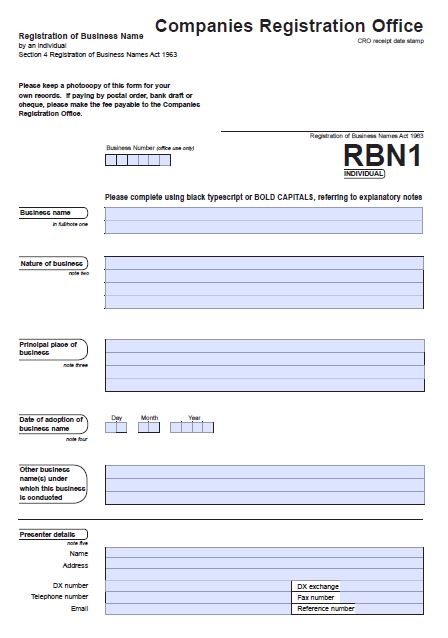
When you register as self-employed you can choose to carry out your business under a business name. To do so, you will need to contact the Companies Registration Office and complete a Form RBN1 or online using the Companies Registration Office (CRO). You will then be issued with a Certificate of Business Name which you must display prominently at your place of business.
Registering as a sole trader
You may register with the Companies Registration Office (CRO) by completing and sending them Form RBN1.
Registering as a trust or partnership
You may register with CRO by completing and sending them a Form TR1.
If you are hoping to open a business bank account you will need a Certificate of Business Name in order to do so.
Assets – capital gains, gifts and inheritance
If you’ve had any capital gains or received gifts or inheritance during the year you may need to file separate tax returns for this income.
If you also have non-PAYE income to declare, you can include your Capital Gains Tax (CGT) liability on a Form 11 or Form 12 income tax return.
However, if you don’t have any non-PAYE income, you’ll need to file a CG1 form to declare your CGT liability.
If you receive a gift or inheritance, you may have to file a CAT return IT38 regardless of whether you have to file a tax return Form 11 or Form 12.
We take the hassle out of filing your Irish tax return
Capital Gain Tax (CGT)
If you make a disposal of a capital asset (for example foreign currency, shares or investment property) anytime between 1 January and 30 November, you must file and pay before the 15 December.
If you make a disposal between 1 December and 31 December, your payment will be due by 31 January of the following year.
The current CGT rate is 33% and it’s payable by the person making the disposal.
Even if you’ve made a loss on your investment, you’re obliged to file a tax return.
When filing your tax return you’ll need details of:
- Every investment disposal you made throughout the year (including dates and values)
- Relevant expenses and deductions relating to each investment
- The value of profit you made from each investment
- Details of any losses made on your investments (as these can be used to offset your gains)
Capital Acquisitions Tax (CAT) – Form IT38
If you receive a gift or an inheritance, you may have to pay gift Capital Acquisitions Tax (CAT) on it. CAT is charged at 33% on the taxable value of a gift or inheritance received on or after 6 December 2012.
You’ll be required to file a CAT Form IT38 if the total value of gifts/inheritances you receive is in excess of 80% of the relevant tax free group threshold (further details below). When calculating whether you have reached 80% of your group threshold, you should include all gifts received in the same threshold after 5 December 1991. So, where the value of a gift or an inheritance, when added to the value of prior aggregable benefits (if any) received on or after 5 December 1991 within the same group, exceeds 80% of the relevant threshold, a Capital Acquisition Tax return (Form IT38) must be filed.
CAT applies to gifts and inheritances of property situated in Ireland. CAT also applies to gifts and inheritances of property situated outside of Ireland if the person giving the property or the person receiving the property is a resident in Ireland for tax.
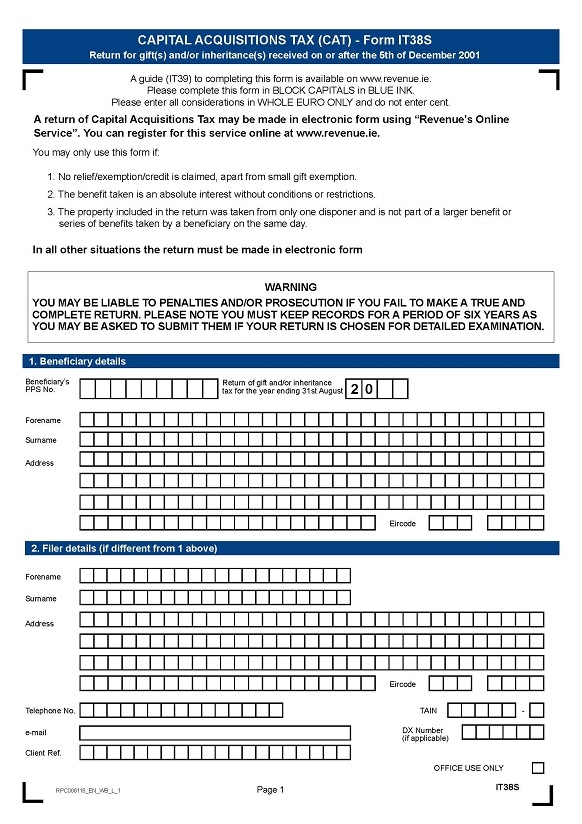
Note: If the valuation date is between 1 January and 31 August, the deadline for your CAT payment is 31 October in that year. If the valuation date is between 1 September and 31 December, the deadline for your CAT payment is 31 October in the following year.
A variety of tax-free thresholds apply depending on the particular relationship between the disposer (the person giving the benefit) and the beneficiary (the person receiving the benefit). There are also a number of exemptions and reliefs that depend on the type of the gift or inheritance.
For example, if you get a gift or inheritance from your spouse or civil partner, you’re exempt from Capital Acquisitions Tax.
Group thresholds (post 09 October 2019)
Group A – threshold €335,000
This applies when the beneficiary of the gift or inheritance is a child of the person giving it. This includes a stepchild, an adopted child or a foster child in certain circumstances.
Group A also applies to parents who take full and complete ownership of an inheritance from their child. This will be exempt from tax if, in the previous 5 years, the child took an inheritance or gift from either parent and it was not exempt from Capital Acquisitions Tax.
If a grandchild is under 18 years of age and takes a gift or inheritance from their grandparent, Group A may apply if the grandchild’s parent is deceased.
Group A may apply to a nephew or niece if they worked in the business of the person giving the benefit for the previous 5 years and:
- are a blood relation OR treated as “blood relation”, regardless of whether or not this is technically the case (this includes nephews/nieces of the civil partner of the spouse’s brother or sister.
- the gift or inheritance consists of property used in connection with the business, including farming, or shares in the company
- if the gift or inheritance consists of property then the nephew or niece must work more than 24 hours pw for the disposer at a place where the business is carried on, or for the company if the gift or inheritance is shares. If the business is carried on exclusively by the disposer, their spouse and the nephew or niece then the requirement is that the nephew or niece work more than 15 hours a week.
- the relief doesn’t apply if the benefit is taken under a discretionary trust
Although keep in mind, this will only apply for business assets or shares in a private trading company.
Group B – threshold €32,500
This group applies to:
- Parent (who doesn’t take full and complete ownership of an inheritance)
- Grandparent
- Grandchild or great grandchild (aside from the example in Group A)
- Brother or sister
- Nephew or niece of the giver
- a lineal ancestor or a lineal descendant of the person making the gift
Group C – threshold €16,250
This applies to any relationship not included in Group A or Group B and includes “stranger-in-blood”, in-laws and cousins.
To file a Form IT38 you’ll need:
- all basic personal information about the people giving and receiving the gift or inheritance
- details of the gift or inheritance
- details of any previous inheritances received on or after 5 December 1991
- all relevant dates
We take the hassle out of filing your Irish tax return
Implications
Getting married can affect many aspects of your life in Ireland – ranging from life insurance and pensions, to inheritance and presumption of paternity.
It can also have a significant impact on your taxation status.
While tax is not the most romantic of reasons to get married, it is certainly worth investigating how getting married will affect your tax liability – you may be able to reduce your overall liability.

Taxation of married couples and civil partners
Once you’re married/registered in a civil partnership, you should inform Revenue as soon as possible.
In the year that you get married, or enter into a civil partnership, you will be taxed as normal – i.e. as single people.
However, the good news is that if you paid more tax individually in that year than you would have if you were taxed as a couple, you can claim a refund of the difference after 31 December.
Refunds are normally only due where a couple is taxed at different rates and one spouse could benefit from the unused standard rate cut-off point or for some of the unused tax credits of the other spouse. You will need to quote your own and your spouse’s Personal Public Service Number (PPS number) when you are claiming your refund.
Any refund due will be from the date of marriage/registration. In other words, the amount you receive will be paid in proportion to the number of months that you were married/in civil partnership.
After the year of your marriage, there are 3 options for calculating tax. You can pick whichever option is of most benefit for you as a couple.
- Joint assessment
- Separate assessment
- Assessment as a single person / Separate treatment
For example, Alan and Jane get married in June 2023.
However, neither Alan nor Jane can change their tax status until January 2024. Alan and Jane can also look into whether or not they’re due a tax refund for the last six months of 2023, as they paid tax at different rates.
Alan and Jane can then choose the most beneficial tax option for them for 2024 between joint/separate assessment and separate treatment.
Assessment as a single person / Separate treatment
With this option each spouse/civil partner is treated as a single person for tax reasons:
- Both spouses/civil partners are taxed on their own income
- Both spouses/civil partners get tax credits and the same standard rate cut-off point due to a single person
- Both spouses/civil partners pay their own tax
- Both spouses/civil partners complete their own return of income form and claim their own tax credits
- One spouse/civil partner cannot claim relief for payments made by the other
- There is no right to transfer tax credits or standard rate cut-off point to each other
Opting for assessment as a single person can often be unfavourable, depending on your circumstances.
For example, you can’t transfer any unused tax credits or standard rate cut-off point. Also if you or your spouse/civil partner is caring for a dependent person, you can’t claim the Home Carer’s Tax Credit (more on this below) even if you otherwise would qualify for the relief.
With separate treatment, either spouse/civil partner can request to be assessed as a single person and the option remains until the person who claims it changes his or her mind.
If you wish to be singly assessed, you have to make the election before 31 December 2024.
We take the hassle out of filing your Irish tax return
Separate assessment
The difference between separate assessment and assessment as a single person is that under this option, some tax credits are divided equally between you. These tax credits are:
- Married or Civil Partner’s Tax Credit
- Age Tax Credit
- Blind Person’s Tax Credit
- Incapacitated Child Tax Credit
The balance of the tax credits is given to each partner in proportion to the cost borne by you. The PAYE tax credit and expenses (if any), are allocated to the appropriate spouse/civil partner. Any tax credits other than the PAYE tax credit and employment expenses that are unused by one partner can be claimed by the other spouse/civil partner. The tax credits are not usually adjusted until after the end of the tax year.
Any tax credits that are unused (other than the PAYE tax credit and employment expenses) standard rate cut-off point up to €51,000 in 2024 (€49,000 in 2023) which is not transferable between partners. The increase in the standard rate tax band of up to €33,000 in 2024 (€31,000 in 2023) is not transferable between partners.
If you want to claim separate assessment either spouse or civil partner must do so between 1 October of the preceding year and 31 March in the year of the claim. An application applies for the year of the claim and subsequent years and can only be withdrawn by the same spouse/partner who made the election
Each spouse or civil partner can complete a separate return of his or her own income.
Overall, the tax you pay under this option is the same as the tax you would pay under joint assessment.
Joint assessment
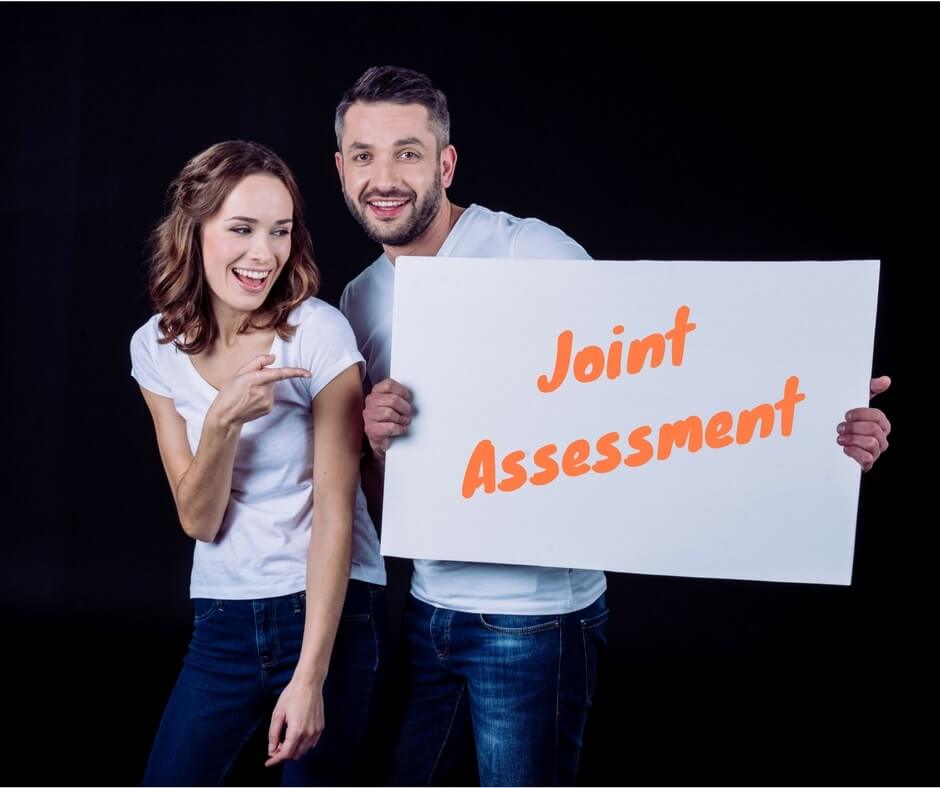
This is often the most favourable basis of assessment for a married couple or civil partners.
This option’s flexibility makes it very convenient for many couples – especially if one of you pays tax under the PAYE system and the other pays tax under the self-assessment system.
You are automatically assigned to the joint assessment option by the tax office when you advise them of your marriage or civil partnership. However, you can still choose the assessment as a single person or separate assessment options if you want to switch.
If a couple is jointly assessed they are entitled to:
- The married person’s/civil partner’s tax credit
- An increased standard rate tax band
If you choose this option, you must inform Revenue before 31 March in the year of assessment
Under joint assessment, the tax credits and standard rate cut-off point can be allocated between spouses to suit your own circumstances. For example, if only one spouse/civil partner has taxable income, all tax credits and the standard rate cut-off point will be given to the spouse/civil partner with the income.
And, if both of you have taxable income, you can decide which of you is to be the assessable spouse/nominated civil partner. You then ask the tax office to allocate the tax credits and standard rate cut-off point between you in whatever way you wish (except for the PAYE tax credit, employment expenses and the increase in standard rate cut-off point of €27,800 in 2022 as these are not transferable).
If your tax office does not get a request from you to allocate your tax credits in any particular way; the tax office will normally give all the tax credits (other than the other partner’s PAYE and expense tax credits) to the spouse/civil partner being assessed.
Assessable spouse or civil partner
With joint assessment you can choose whether you or your partner will be the assessable spouse. The person nominated will be responsible for filing tax returns and paying any tax due.
By not contacting Revenue to nominate a person, it’s likely they’ll automatically choose the person with the highest income in the latest year for which the income of both people is known. This person continues to be the assessable person until you jointly elect to nominate the other person.
Allocating tax credits
You can allocate your tax credits and rate band however you wish – provided both you and your partner have taxable income. However, you can’t transfer the employee tax credit, employment expense or increase in standard rate band. Both partners will receive tax credit certificates showing the allocation of the credits and rate band.
If you or your partner are self-employed, you can still pick joint assessment. You’ll need to choose between paying most of the tax under the PAYE system or in a lump sum under self-assessment. You can do this by allocating your credits and rate band appropriately.
If you decide to pay most of your tax through PAYE, your credits (apart from the employee tax credit and employment expenses), should be allocated to the self-employed person.
We take the hassle out of filing your Irish tax return
Basis of assessment for cohabitants
Cohabitants continue to be assessed to tax as single persons. Any unused tax credits or unused lower tax bands may not be transferred between cohabitants to minimise their aggregate tax liability.
Refunds
If you’re due a refund at the end of the year, this will be repaid to each person in proportion to the amount of tax each person paid.
Marriage abroad

Foreign registered relationships
If you were married outside of Ireland, you may still be able to get the taxation benefits in Ireland. There are also a number of overseas marriages and civil partnerships Revenue recognise for tax purposes.
This means that if your foreign registered marriage or civil partnership is recognised, you’ll be taxed in the same way as a couple who were legally married in Ireland.
Residency
If you are resident in Ireland and your spouse or civil partner is not resident in Ireland, you will be assessed under the separate treatment. However:
- If your spouse has no income, you can choose joint assessment and claim the married or civil partner’s tax credit and the increased rate band
- If both spouses have income you’ll be assessed under separate treatment and taxed on your income only. You’ll be able to claim the single person’s tax credit and rate band. However, if the tax you pay individually is greater than what you would have paid under joint assessment, you may be able to claim additional relief
- Where neither spouse is a resident in Ireland, your income will be taxed in the same way as if one partner was resident
Unemployment
There are a few options to consider should either yourself or your partner stop working during the year.
- Firstly, you can transfer any unused credits or rate band to the other spouse or civil partner if you are jointly assessed
- Alternatively, you can withdraw from separate assessment (within the time limits) and transfer any unused credits or rate band to the other spouse or civil partner
- Or you could choose to switch to joint assessment if you are assessed under separate treatment
We take the hassle out of filing your Irish tax return
Rate bands, credits and thresholds
In a situation where only one person is working, the 2025 standard rate band for couples in a marriage or civil partnership is €53,000 (€51,000 in 2024). This amount is taxed at 20% and the balance is taxed at 40%.
Where both spouses/civil partners have income, this standard rate cut-off point can be increased by the lower of the following:
- €35,000 in 2025 (€33,000 in 2024)
or - The amount of the income of the spouse/civil partner with the smaller income.
You can’t transfer the increased rate band between spouses or civil partners.
Home Carer Credit
The Home Carer’s Tax Credit is given to married couples or civil partners (who are jointly assessed for tax) where one spouse or civil partner works in the home caring for a dependent person (a child eligible for child benefit, a person over 65 or a person with a disability who requires care – a dependent person can’t be a spouse or civil partner).
The tax you’re liable to pay is calculated as a percentage of your income. A tax credit is deducted from this to give the actual amount of tax that you have to pay. The tax credit reduces your payable tax by the amount of the credit.
You can claim this tax credit on your annual tax return. However, you can’t claim both the Home Carer Credit and the increased rate band. You should claim whichever is the most beneficial to you.
The HCTC rate for 2025 is €1,950 (€1,800 in 2024).
If you earn less than €7,200 you can claim the full tax credit.
If you earn more than €7,200 to €10,400 you will receive reduced tax credit.
If your income exceeds more than €11,100 in 2025, you cannot claim this credit.
Single Persons Child Carer Credit

The Single Person Child Carer Credit (SPCCC) is a tax credit for people caring for children on their own. This credit can be claimed when you are filing your tax return.
If you were claiming SPCCC at the beginning of the year in which your marriage or civil partnership is registered, you can continue to claim it for the remainder of the year.
If you are claiming SPCCC and your personal circumstances change during the year (for example: you get married, you reconcile with an estranged spouse, cohabit OR register a civil partnership), you must contact Revenue. The SPCCC will not be removed immediately, but will be removed for the following tax year.
Year of Separation or Bereavement
If you were separated…
* if you are non-assessable spouse/civil partner you may claim SPCCC if you meet all the conditions to qualify
* if you are assessable spouse/civil partner – you cannot claim SPCCC, because you keep the married person’s allowance
Death of a spouse/ civil partner
– If your spouse/civil partner dies you cannot claim SPCCC in the year of bereavement
Cease cohabiting
– If you cease cohabiting with your partner, you cannot claim SPCCC. If you meet all the requirements, you can claim it for the next tax year.
We take the hassle out of filing your Irish tax return
Age Tax Credit
If you turn 65 during the tax year, then you’ll be awarded an Age Tax Credit of €245 if you are a single or widowed surviving civil partner.
This amount increases to €490 for a married couple or civil partnership and is awarded as soon as either member of the couple reaches 65.
You can claim the credit if either you or your spouse or civil partner reach the age of 65 at any time during the tax year.
You’re both entitled to the credit even though only one person is 65. However, if you chose to be assessed under separate treatment, both partners must be 65 to claim the credit.

Exemption and Marginal Relief
You or your partner may not have to pay any tax at all if your total income is less or equal to the exemption limit.
This exemption applies to IT only. It does not apply for PRSI and USC.
You may still be able to claim marginal relief if your total income exceeds the exemption limits.
If you are over 65 and your yearly income is less than the exemption, you may be exempt from Deposit Interest Retention Tax (DIRT).
Exemption limits
If you’re 65 years or over you won’t pay any tax where your total income is less than the following amounts:
| Personal circumstances | Amount |
|---|---|
| Single, widowed or a surviving civil partner | €18,000 |
| Married or in a civil partnership | €36,000 |
| First two children | €575 each |
| Subsequent children | €830 each |
With qualifying children, the exemption limits are increased by:
- €575 each for your first two children
- €830 for each additional child
To qualify your child must be:
- born during the year
- under 18 years of age at the start of the year
- aged over 18 and attending college on a full-time basis or trains for a trade or profession for a maximum of two years
- became incapacitated before they turned 21
- became incapacitated after turning 21 but at college full-time, or training for a trade or profession for a maximum of 2 years
Marginal relief
If your income is more than the outlined exemption limit, you might be able to claim marginal relief. Under marginal relief, your tax is calculated in a different way in order to limit your tax liability. The relief is only be given when it’s more beneficial than calculating the tax due in the standard way and using your tax credits. The marginal relief rate is 40%.
Marginal relief is available were:
– You or your spouse/civil partner is over 65
– Your total income is less than twice the exemption relief
Universal Social Charge
The Universal Social Charge (USC) applies to both you and your spouse or civil partner individually. It’s not possible to transfer or combine USC thresholds if one person is above the threshold and the other is below.
If you earn more than €13,000 (gross) per year you will have to pay USC. The payment will be due when you complete your annual Form 11 tax return.
Incomes of €13,000 are exempt.
Exempt incomes include:
– All Department of Social Protection payments
– Income subjected to DIRT, Credit Union dividends
– tax exempt portion of termination payment
– Certain withdraws of AVC contributions before retirement
Transferring assets
If you’re living with your spouse or civil partner, you can transfer an asset to them without having to pay Capital Gains Tax. Your spouse/ civil partner will also not have to pay Capital Acquisitions Tax on the transfer as Revenue will treat it as a gift.
We take the hassle out of filing your Irish tax return
Tax after bereavement – in the year of the death
Single people
In the year in which they die, a single person has the normal tax credits they’re usually entitled to for a whole year – January to December. If a tax refund is due, the person responsible for finalising the affairs of the deceased must claim it.
In this instance, Revenue will treat widowed people, surviving civil partners, and unmarried couples in the same way as single people.
Married couples and civil partners
If your spouse or civil partner dies, how you’ll be taxed that year will depend on how you were taxed as a couple – for example whether you were taxed through Single Assessment, Separate Assessment or Joint Assessment.
Single assessment / Separate treatment
If you were both taxed through single assessment, the Widowed Person’s or Surviving Civil Partner’s Tax Credit (further details below) will replace the personal tax credit that you had at the start of the year.
If a couple are taxed under single assessment, the death of one spouse/civil partner does not affect the taxation of the other spouse/civil partner. The surviving spouse/civil partner will continue to be taxed as a single person on his or her own income. The surviving spouse/civil partner can elect for joint assessment before the end of the tax year in which the death occurs.
Separate assessment
If you and your spouse/civil partner have been taxed under separate assessment, then the Widowed Person’s or Surviving Civil Partner’s Tax Credit replaces your personal tax credit. There may also be some unused tax credits/allowances of the deceased spouse/civil partner that could be allocated to the other spouse/civil partner.
Joint assessment
The tax treatment of a married couple jointly assessed for tax in the year where one spouse dies depends on whether the assessable spouse or the non-assessable spouse dies.
Non-assessable spouse
In a tax year where a non-assessable spouse dies, the assessable spouse:
- is taxable on his/her own total income for the full year plus the total income of his/her spouse to the date of death
- is entitled to the full amount of the married tax credit and the PAYE credit (2 PAYE credits if both have enough income taxable under the PAYE system)
- the assessable spouse/civil partner is not entitled to the widowed person’s tax credit in the year of bereavement, because they have already gotten the married tax credit
- may claim other tax credits due to both spouses in that year
Assessable spouse
The tax year in which an assessable spouse dies is split into 2 parts.
For the period 1 January to the date of death, the assessable spouse:
- is taxable on his/her own total income and the total income of his/her spouse for this period
- is entitled to the full amount of the married tax credit and the PAYE credit (if taxed on PAYE)
- may claim a proportion of other credits up to date of death
- has the tax rate bands that apply to a married couple
From the date of death to the end of the tax year, the non-assessable spouse:
- is assessable on their own income for this period
- is entitled to the widowed person’s tax credit for the year of bereavement and also the PAYE credit (if taxed on PAYE)
- may claim tax credits for this period
- has the tax rate bands that apply to a single or widowed person
Tax after bereavement – following the year of the death
Widowed Person’s Tax Credit
There is an increased tax credit available for widowed people. However, the amount varies depending on how recent the bereavement was and whether or not the surviving spouse has dependent children.
Entitlement to Tax Credit depends upon:
– The method of tax assessment in force in year of death
– Whether it’s the assessable spouse who dies in the tax year
Widowed person without dependent children
A widowed person without a dependent child can still get the Married Person or Civil Partner’s Tax Credit in the year of bereavement (€4,000 for 2025).
However, each year following the year of bereavement, a widowed person will receive the Widowed Person or Surviving Civil Partner’s Tax Credit (€2,540 in 2025).
Widowed person with dependent children
A widowed person with a dependent child will still get the Married Person or Civil Partner’s Tax Credit in the year of bereavement. However, in subsequent years where there are dependent children, a Widowed Person or Surviving Civil Partner’s (with dependent children) Tax Credit (€2,000 in 2025) and a Single Person Child Carer Credit (€1,900 in 2025) are available.
A widowed person with dependent children will also be entitled to claim an additional tax credit – the Widowed Parent or Surviving Civil Partner Tax Credit (further details below) – for the first five years after the year of death.
If you’re widowed with dependent children and haven’t remarried but are cohabiting with a partner, you’re not considered a widowed person (with dependent children) for tax purposes. This means that while you can still receive the Widowed Person’s Tax Credit, you won’t be entitled to the Widowed Person’s (with dependent children) Tax Credit or the Single Person Child Carer Credit.
If you haven’t remarried and no longer have dependent children, you won’t be considered as a widowed person (with dependent children) and will instead receive the Widowed Person or Surviving Civil Partner’s Tax Credit.
Widowed Parent or Surviving Civil Partner Tax Credit
Starting in the year after the year of bereavement, the Widowed Parent or Surviving Civil Partner Tax Credit is available for five years. In other words, if you’re bereaved in 2023, you’ll start to receive this credit in 2024. Only one credit will be granted, irrespective of how many children you have.
To qualify:
- You mustn’t have remarried by the start of the tax year and be cohabiting
- A qualifying child must reside with you for some part or all of the tax year
- The child must be under 18 or if over 18 be in full-time education or undergoing a full-time training course for a trade or profession for a minimum of 2 years
- There’s no age restriction if the child became permanently incapacitated when under 21 or in full-time education or training
- The child may be an adopted child, a stepchild or any child you support and for whom you have custody
As illustrated below, the amount of tax credit varies each year.
The tax relief due in the years after bereavement is as follows:
- €3,600 in the first year
- €3,150 in the second year
- €2,700 in the third year
- €2,250 in the fourth year
- €1,800 in the fifth year
Tax implications of separation and divorce
There will likely be tax implications, if you’re married and you decide to separate or divorce.
If you believe your separation will be permanent, you should contact Revenue to make the tax adjustments for the year in which you separated and for subsequent tax years.
Taxation in the year of separation
Depending on how your tax was assessed as a married couple, there are a number of different ways in which you can be taxed during the year of separation. For couples who are assessed as single persons, there is no change in their tax assessment.
However, if you and your partner are taxed under separate assessment, income up to the date of separation is assessed in the normal way and you can transfer to each other any unused tax credits and rate bands that apply.
After the date of separation and for the remainder of the tax year, each spouse will be treated as a single individual and will receive the single person’s tax credit.
Meanwhile, under joint assessment:
- If you’re the assessable spouse, you’ll be entitled to the married person’s tax credits and double rate bands for the full year in which you separate. You will be taxed on your own income for the full year as well as your spouse’s income for the year up until the date on which you separated. You will be entitled to a tax deduction for maintenance payments made for spouses/civil partners benefit or taxed on maintenance payments received, under a legally enforceable separation agreement/ maintenance arrangement.
- If you’re the spouse who wasn’t assessable, then you’ll be taxed on your own income from the date of separation. You will be entitled to the full single person’s tax credit and taxed under the single rate bands. You will be taxed on the maintenance payments received for your own benefit or entitled to a deduction for the maintenance payments made for the spouse’s/civil partners benefit, under a legally enforceable separation agreement/ maintenance arrangement.
Taxation in years that follow
If you’re separated, depending on your circumstances, you may choose to be taxed as a married couple or single person after the year in which you separate. Maintenance payments are one key factor in deciding which tax arrangement will apply.
We take the hassle out of filing your Irish tax return
Maintenance payments
These payments are for the support of the other spouse (and/or children). They’re usually made under informal and voluntary agreements, although they can be legally enforceable.
Voluntary payments
Voluntary maintenance payments are ignored for tax purposes. So if you make a payment to your spouse, you’re not entitled to a tax deduction. If you’re receiving a maintenance payment from your spouse, you won’t be taxed on it.
If you pay voluntary maintenance and it’s your spouse’s main income, then you may claim the married person’s tax credit rather than the single person’s credit, but you’ll still retain the tax rate band for a single person.
Legally enforceable maintenance payments
This includes payments made under a court order or ruling, a deed of separation, or a covenant or a trust.
Any maintenance payment for the benefit of a child is ignored for tax purposes.
If you make legally enforceable maintenance payments to support your spouse (not your children), you are entitled to a tax relief on the payments made and it’s also possible to get USC relief on the payments. Your spouse must pay tax and USC on the payments received.
If you receive maintenance payments and these are the only income that you have, then you must pay the tax and USC due under self-assessment.
If you and your spouse decide to opt to be taxed as a married couple (you both must be resident in Ireland) the payments will be ignored for tax and USC purposes. No tax will be deducted and no expenses can be claimed.
If you choose to be assessed as a married couple, you must contact Revenue before the end of the tax year. To be eligible, you must be resident in the state and there must be a legally enforceable agreement for maintenance payments. Also, if you’re divorced you must not have remarried.
We take the hassle out of filing your Irish tax return
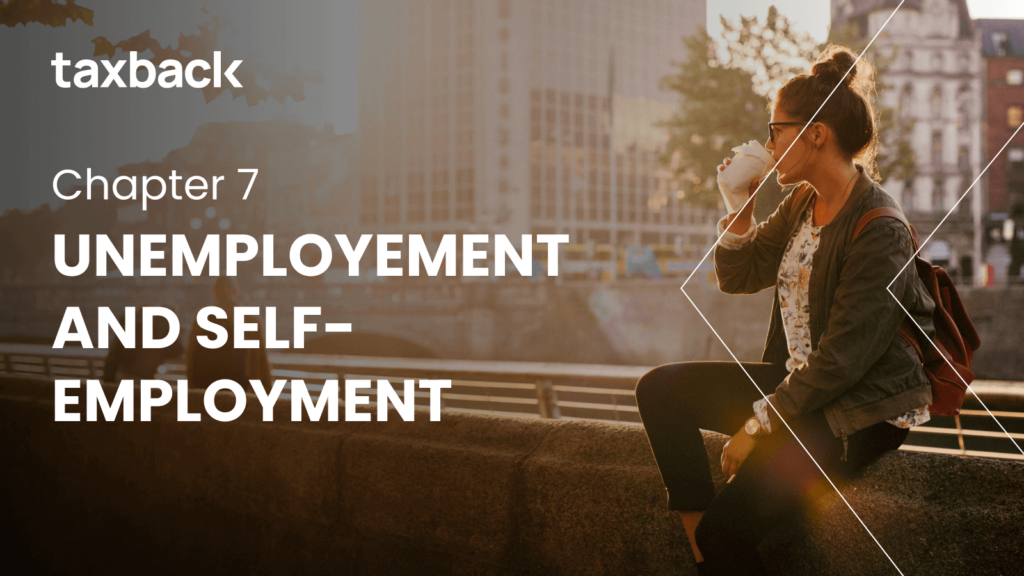
Unemployment
Like all workers, those that are self-employed can lose employment for any number of reasons. It can also be the case that the amount of money you earn through your self-employment has been reduced to the point where it is no longer a sufficient income.
If you find yourself in a situation like this, you may qualify for a jobseeker’s payment. You do not need to de-register as self-employed to get a payment. However, you must meet the conditions that apply to jobseeker’s payments (more on this below).
Jobseeker’s Benefit
Generally, if you are self-employed you will pay Class S PRSI.
Class S PRSI only covers you for certain social welfare payments. It does not cover you for Jobseeker’s Benefit.
However, if you worked as an employee in the last 4 years, you may have paid Class A PRSI. In these circumstances you may be eligible for Jobseeker’s Benefit and you should apply to your local Intreo Centre or social welfare local office. They will check whether you have enough Class A contributions to get Jobseeker’s Benefit.
You might also qualify for Jobseeker’s Benefit if you are employed part-time under the PAYE system. However, you must have lost at least one day of employment and as a result of this loss be unemployed for at least 4 days out of 7 days. Your earnings must also have been reduced because of the loss of employment. For instance, if you are engaged under a contract for service to work (on a self-employed basis) for 3 days per week and unemployed for the remainder of the week, you may qualify for Jobseeker’s Benefit.
If you do not qualify for Jobseeker’s Benefit you may get Jobseeker’s Allowance instead.

Jobseeker’s Allowance (JA)
To qualify for Jobseeker’s Allowance (JA) you must be habitually resident and pass a means test (more below).
For those that are self-employed, you may be entitled to JA depending on your earnings from your business. You do not need to close your business or stop working as self-employed for you to get JA. Instead, you will get JA if your income is below a certain level.
We take the hassle out of filing your Irish tax return
Means test
To qualify for JA you have to satisfy a means test. The Department of Social Protection will examine your income and test if it falls below a certain level. In most cases, a social welfare inspector will interview them to determine your means.
If they find your income to be below that level you will qualify for JA. The amount you get depends on your income level.
The means test for Jobseeker’s Allowance can be a complex calculation. Your household income is assessed and if you are married, in a civil partnership or cohabiting, the means of your spouse, civil partner or cohabitant are also taken into account. Sometimes a certain amount of income or income from particular sources is not taken into account.
Below are some of the general items that are examined during a means test.
Earnings
Earnings from your business will be assessed in the means test for JA. In your assessment you must include details which reflect the income you reasonably expect to get from your business over the next 12 months. You should be prepared to discuss certain variables which may affect your projected income when you are assessed for JA. You must give your receipts and payments (documentation showing money coming in and out of your business) or audited accounts to the person dealing with your application. This is to prove the level of income from your business.
Earnings are assessed as gross income over 12 months with work related expenses deducted. Your expected annual earnings from self-employment are then divided by 52 to find your weekly means from self-employment.
Note: Any drawings (withdrawing cash or assets from the business by the owner(s) for personal use) taken from the business are not included as an allowable expense. And, if your drawings from the business are greater than the level of income calculated, the drawings will be assessed as cash income.
Allowable expenses
As expenses vary with the nature and extent of self-employment, there is no complete list of all allowable business expenses. The best rule of thumb to use is to only deduct costs which were incurred ‘wholly’ and ‘exclusively’ from the running of your business.
The following are the main allowable expenses in most cases:
- Materials (supplies costs)
- Motor running costs (portion applicable to business)
- Depreciation of machinery or equipment
- Insurance relating to the business
- Telephone (portion applicable to business)
- Lighting and heating (for business and not domestic use)
- Advertising
- Bank charges
- Stationery
- Van/Car leasing
Property personally used
The house in which you live is not included in the assessment of your means unless you are getting an income from it. For example, if you rent a room in the house, the income that you earn from it is assessed but the capital value of your home is not.
Capital and property not personally used
Property and investments that may be assessed include savings in a bank account (or anywhere else), a house that you have let, and stocks and shares. If you or your spouse, civil partner or cohabitant saves a portion of your social welfare payment each week, these savings as well as savings from most other sources will be taken into account as part of your means.
If you own property (excluding your home) or you have investments or any other form of capital, the value is assessed using a standard formula (see below), whether or not you are getting an income from the property or investment.
The capital value is calculated by deducting any outstanding mortgage registered against the property from the market value. If the property is rented you will not be assessed on the actual income from the letting.
Standard formula for assessing the value of capital including property
| Capital | Weekly means assessed |
|---|---|
| First €20,000 | Zero |
| Next €10,000 | €1 per €1,000 |
| Next €10,000 | €2 per €1,000 |
| Balance (€40,000 +) | €4 per €1,000 |
Joint Account
A joint bank account that you share with your spouse, civil partner or cohabitant can be assessed in full against each of you. However, if you are both getting means-tested payments it will be assessed on a shared basis or against only one of you.
In cases where joint account holders have contributed to the funds, or either party may withdraw on his/her sole signature, each should be assessed with an equal share.
Living with your parents
Some of your parent’s’ income may also be taken into account in a JA assessment. For instance, if you are 24 years of age or under and you are living with a parent or a stepparent in the family home. This is known as an assessment of the benefit and privilege you get from living with your parents.
This means, while you may have no income, your parents’ income can affect your social welfare payment. If however, your only means are from the benefit of your parents’ income and those means are less than the personal rate of Jobseeker’s Allowance, the minimum weekly payment you are entitled to is €40.
Some people may still refer to benefit and privilege as ‘board and lodgings’.
Total means
Your means under the various headings (for example, cash income, employment, capital, benefit and privilege) are added together to calculate your total means. If you are married, in a civil partnership or cohabiting and your partner is getting a social welfare payment in their own right your means may be halved (more below).
Your total household means is then deducted from the maximum payment for your situation to find the actual amount of JA you are entitled to.
Maximum payment
The maximum payment for your situation is the maximum personal rate of JA including any increases for adult and child dependents. However, if you are married, in a civil partnership or cohabiting and your spouse, civil partner or cohabitant is getting a social welfare payment in their own right, your joint means are halved and the maximum payment for your situation will not include an increase for an adult dependent and will only include half-rate increases for your child dependents (more below).
Your age can also determine the maximum payment for your situation.
We take the hassle out of filing your Irish tax return
Couples
If your spouse, civil partner or cohabitant has a social welfare payment in their own right (except Child Benefit, Disablement Pension, guardian’s payments, Supplementary Welfare Allowance, Domiciliary Care Allowance or half-rate Carer’s Allowance) or is on a Further Education and Training (FET) or VTOS course and getting a payment in their own right you cannot claim an Increase for a Qualified Adult for them.
This means that the maximum you can be paid is the maximum Jobseeker’s Allowance payment for a single person plus a half-rate allowance for each qualified child.
In addition, only 50% of your combined means are taken into account in the means test for your Jobseeker’s Allowance – in other words your combined means are halved.
You can claim an increase for your spouse, civil partner or cohabitant while they are taking part in a Community Employment (CE) scheme. Their earnings from the scheme are assessed in the same way as earnings from insurable employment (and your combined means are not halved).
Limitation
If you are claiming JA and your spouse, civil partner or cohabitant is getting one of the social welfare payments listed below, the total amount paid to you as a couple cannot be more than the maximum amount that would be paid to one person (including adult and child dependents) on one social welfare payment.
Where a couple are both claiming JA in their own right the rate paid to each person is half of the family rate. If one or both of the couple is aged 26 or under, each person is paid half of the family rate that would apply to them individually. The total amount payable to a couple where one or both are under 26 can vary depending on who makes the claim (see examples below).
- Illness Benefit
- Disablement Pension (when paid with Illness Benefit or Incapacity Supplement)
- Injury Benefit
- Invalidity Pension
- State Pension (Non-Contributory)
- State Pension (Contributory)
- State Pension (Transition)
- Jobseeker’s Benefit
- Jobseeker’s Allowance
- Pre-Retirement Allowance (PRETA)
- Farm Assist (FA)
Appeal
Where a self-employed person’s situation changes after they have made an initial claim for JA, they can apply to have their means reviewed. Also it’s up to the individual, if they are dissatisfied with the means assessment, to appeal it to the Social Welfare Appeals Office.
Supplementary Welfare Allowance
If your weekly income is below the Supplementary Welfare Allowance rate for your family size, you may be eligible for a payment to bring your income up to the appropriate Supplementary Welfare Allowance rate.
Note:
- If you are working more than 30 hours per week you can’t receive Supplementary Welfare Allowance
- If you have claimed a jobseeker’s payment but it has not yet been paid and you have no other income, you may qualify for Supplementary Welfare Allowance while you are awaiting payment
Other benefits
Health
Depending on your level of income you may be entitled to receive a medical card or a GP visit card.
School
The Back to School Clothing and Footwear Allowance Scheme operates from 1 June to 30 September each year. The scheme helps parents to pay costs associated with children attending school – such as uniforms and footwear.
Urgent
Help is also available to cope with exceptional or urgent circumstances which may arise. For example, if you need help with a funeral bill, a range of discretionary payments are provided by the Department of Social Protection’s representative in your local health centre.
Class S PRSI
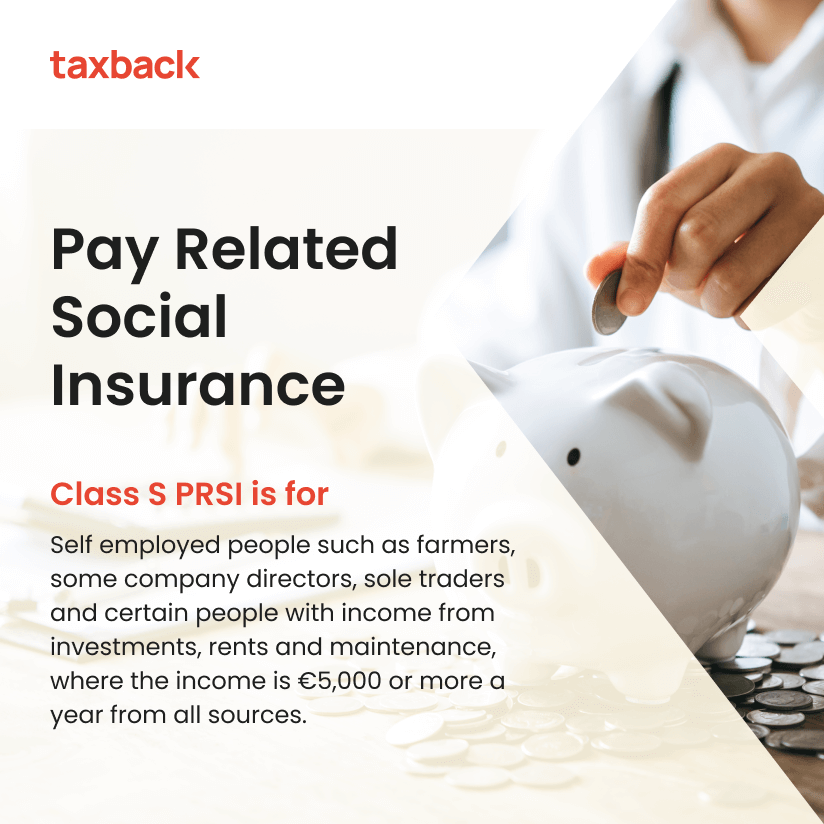
Rates of contribution
Self-employed people between the ages of 16 and 66 pay Class S PRSI at 4% (or €500, whichever is greater) on all taxable income (gross income less allowable expenses).
Those that earn less than €5,000 from self-employment in a year are exempt from PRSI, but may be entitled to pay €500 as a voluntary contributor (more on this below).
Voluntary contributions of PRSI
If you are between the age of 16 and 66 and are no longer covered by compulsory PRSI by way of insurable employment, self-employment or credited contributions you can opt to pay Voluntary contributions of PRSI.
By making voluntary contributions you can maintain or improve your contributory pension entitlements.
In order to be admitted as a voluntary contributor you must:
- have at least 520 PRSI contributions paid under compulsory insurance in either employment or self-employment
- apply within 60 months from the end of the PRSI contribution year in which a PRSI contribution was last paid or credited
- agree to pay voluntary contributions from the start of the contribution week after the week in which you last paid compulsory PRSI or had a credited contribution
If you are applying to become a voluntary contributor:
- on or after 6 April 2013, you will need 364 weeks PRSI paid
- on or after 6 April 2014, you will need 468 weeks PRSI paid
or - on or after 6 April 2015, you will need 520 weeks PRSI paid
The rate of voluntary contributions payable is always determined by the last rate of PRSI contribution paid by a person. There are three different rates of voluntary contributions.
High Rate: This rate is payable if the last PRSI contribution paid was at Class A, E or H. The amount payable in each contribution year is currently 6.6% of reckonable income in the preceding contribution year. The minimum annual payment is €500.
High rate voluntary contributions provide cover for:
- State pension (transition)
- State pension (contributory)
- Widow’s, widower’s or surviving civil partner’s (contributory) pension
- Guardian’s payment (contributory)
- Bereavement grant
Low Rate: This rate is payable if the last PRSI contribution paid was at Class B, C or D. The amount payable in each contribution year is currently 2.6% of reckonable income in the preceding contribution year. The minimum annual payment is €250.
Low rate voluntary contributions provide cover for:
- Widow’s, widower’s or surviving civil partner’s (contributory) pension
- Guardian’s payment (contributory)
- Bereavement grant
- Special Rate: This rate is payable if the last PRSI contribution paid was Class S – self-employed. The amount payable is currently €500 per year.
Special rate voluntary contributions (those paid by people who were previously self-employed and paying Class S PRSI) provide cover for:
- State pension (contributory)
- Widow’s, widower’s or surviving civil partner’s (contributory) pension
- Guardian’s payment (contributory)
- Bereavement grant
- Maternity Benefit
- Adoptive Benefit
We take the hassle out of filing your Irish tax return
Further supports available
If you are unemployed, there are a number of support schemes available which can help you to start your own company.
The Back to Work Enterprise Allowance (BTWEA) Scheme and the Short Term Enterprise Allowance (STEA) Scheme encourage those receiving certain social welfare payments to become self-employed.
Meanwhile the Start Your Own Business Relief provides relief from income tax to people who are unemployed for at least 12 months and who set up a qualifying business. It runs from 23 October 2013 to 31 December 2018.
New Frontiers is a development programme for potential entrepreneurs, funded and coordinated by Enterprise Ireland, which is delivered locally by Institutes of Technology.
Back to Work Enterprise Allowance

The Back to Work Enterprise Allowance (BTWEA) scheme encourages people who are receiving certain social welfare payments to become self-employed. It works by allowing those who take part in the scheme to keep a percentage of their social welfare payment for up to 2 years.
The Back to Work Enterprise Allowance is payable to people aged under 66.
There are a number of ways in which you can qualify for BTWEA including:
- If you have set up as self-employed in a business that has been approved in advance in writing by a DSP Case Officer or Local Development Company (LDC)
and
- You are getting one of the qualifying payments listed below for at least 9 months (234 days)
– Jobseeker’s Allowance (JA)
– Jobseeker’s Benefit (with an underlying entitlement to Jobseeker’s Allowance)
– Jobseeker’s Transitional payment (JST)
– One-Parent Family Payment (OFP)
– Blind Pension
– Disability Allowance
– Carer’s Allowance (having stopped caring duties)
– Deserted Wife’s Benefit/Allowance
– Prisoner’s Wife’s Allowance
– Farm Assist
– Invalidity Pension
– Incapacity Supplement
– Widow’s/Widower’s or Surviving Civil Partner’s (Non-Contributory) Pension
or
- 3 out of last 5 years you are in receipt of a qualifying social welfare payment
or
- You have been receiving a combination of One-Parent Family Payment / Jobseeker’s Transitional payment / Jobseeker’s Allowance for 9 months (234 days)
You may also be considered for the BTWEA if you are:
1) A dependent adult of a person who is in receipt of the BTWEA.
You may qualify if the BTWEA recipient finishes their self-employment before their entitlement ends due to certain circumstances. These may include an illness or injury which stops the original claimant from working. It can also include an illness or injury to a family member which requires the claimant to become a full-time carer. However, taking up other employment is not included.
If you qualify, you may avail of the scheme for the time remaining on the original claim. The original claimant transfers his or her entitlements to you as their spouse, civil partner or cohabitant.
Note: BTWEA can’t be paid concurrently with another social welfare payment. If the original claimant (a qualified adult) decides to claim another payment you can’t claim BTWEA.
2) A person recently released from prison.
If you have been in prison, the time you have spent there can count towards the qualifying period for BTWEA provided an entitlement to a relevant social welfare payment is established before you become self-employed.
The below accepted as qualifying periods provided you were entitled to a qualifying payment before starting on the study or training:
- Periods of time spent on full-time FET
- Fáilte Ireland and Teagasc training courses
- Community Employment
- Social Economy Programme
- Rural Social Scheme
- FIT
- Job Initiative
- JobBridge
- Work Placement Programme
- Tús
- BTEA and VTOS schemes
Time spent on the Community Services Programme is also counted by The Department of Social Protection if you were getting a qualifying social welfare payment for at least half of the qualifying period.
Time spent on Supplementary Welfare Allowance or in direct provision can count towards the qualifying period for BTWEA as long as you establish an entitlement to a relevant payment before starting the BTWEA.
If you have previously participated in the BTWEA scheme and used up your entitlement, you can participate a second time after at least 5 years.
We take the hassle out of filing your Irish tax return
Short-Term Enterprise Allowance
Another support to unemployed people who want to start their own business is the Short-Term Enterprise Allowance (STEA).
There is no qualifying period, however you must be receiving Jobseeker’s Benefit (JB) in order to qualify. You will not qualify if you are getting JB and working part-time.
STEA is paid instead of your JB for a maximum of 9 months. It ends when your entitlement to JB ends (either 9 or 6 months).
To apply, the first thing that you will need to do is submit a business plan and have it approved by a Case Officer based in a social welfare local office or an Enterprise Officer in your local development company.
You must contact the Department of Social Protection immediately if your self-employment ends or you take up employment.
If you are unemployed when your entitlement to STEA ends you will not immediately re-qualify for JB. However, you can apply for Jobseeker’s Allowance (JA), which is a means-tested payment.
Employment grants from a Local Enterprise Office (LEO) or a local development company do not affect your entitlement to the Short-Term Enterprise Allowance.

Help with starting a business
In addition to income support (your weekly payment), you can also get financial support with the costs of setting up your business. These supports are provided under a scheme called the Enterprise Support Grant (ESG).
You can only get the ESG if you have been approved for either the Back to Work Enterprise Allowance or the STEA. The business plan you submit as part of your application for the scheme must set out the rationale and requirement for financial support. The ESG is paid to people getting the STEA on a pro-rata basis – a maximum of €937 can be paid to people on a 9-month STEA and a maximum of €625 to people on a 6-month STEA. You must be able to make a matching contribution of at least 20% to access grant support. You need to provide documentary evidence of the costs (quotations from at least 2 suppliers or, if a single supplier, the reasons for choosing a single supplier).
Eligible items for grant support include:
| Category | Annual Limit | Minimum Contribution |
|---|---|---|
| Accountancy and related services including legal advice | Up to €500 | 20% |
| Advertising and marketing aids | Up to €500 | 20% |
| Business equipment | Up to €1,000 | 20% |
| Business mentoring (free or at a reduced rate by Local Enterprise Officers (LEOs) or local development companies) | Up to €250 | 20% |
| Business registration costs and fees | Up to €250 | 20% |
| Compliance, guidance and training | Up to €250 | 20% |
| Job-specific tools and equipment | Up to €1,000 | 20% |
| Office supplies and stationery | Up to €250 | 20% |
| Personal protective clothing and equipment | Up to €250 | 20% |
| Public Liability Insurance costs associated with setting up a business | Up to €1,000 | 20% |
| Short term training on book-keeping, regulation, rollout of business plan, start-your-own-business and courses of training related to the start up | Up to €250 | 20% |
| Signage | Up to €500 | 20% |
| Upgrading a premises owned by the applicant | Up to €1,000 | 20% |
| Website registration, related services and production | Up to €500 | 20% |
| *Combination of above in any 24 month period (for long-term BTWEA only) | €2,500 |
Some items are not eligible for grant support under the ESG. These include:
- Building/premises rental costs
- Cost of travel
- Insurance (except public liability)
- Personal clothing and uniforms (except protective clothing)
- Professional development programmes arranged by professional and regulatory bodies
- Purchase of any type of vehicle
- Stock-in-trade
- Training or education other than that specified
- Utility costs, connection or supply and local authority rates
Note: ESG is paid to people getting the STEA on a pro-rata basis. A maximum of €937 can be paid to people on a 9-month STEA and a maximum of €625 to people on a 6-month STEA. You do not have an automatic right to any of these amounts. The Department of Social Protection’s Case Officer will assess your application and eligibility.
If you qualify, the STEA replaces your JB. The STEA will be paid at the same rate as your JB, including any increases for adult and child dependants. It ends when your entitlement to JB ends. The STEA may be paid directly into your bank or building society account on a weekly basis. It cannot be paid into a mortgage account.
You do not pay PRSI or Universal Social Charge on the STEA. However the STEA is subject to income tax in the same way as JB. You may qualify for Start Your Own Business Relief which provides a two-year exemption from income tax (up to a maximum of €40,000 each year) for people who have been unemployed for at least 12 months before starting their own business. It runs from 25 October 2013 to 31 December 2018. (However if you started to get the STEA before 25 October 2013 you do not qualify for the relief because you had already started your business before the start date for the scheme).
We take the hassle out of filing your Irish tax return
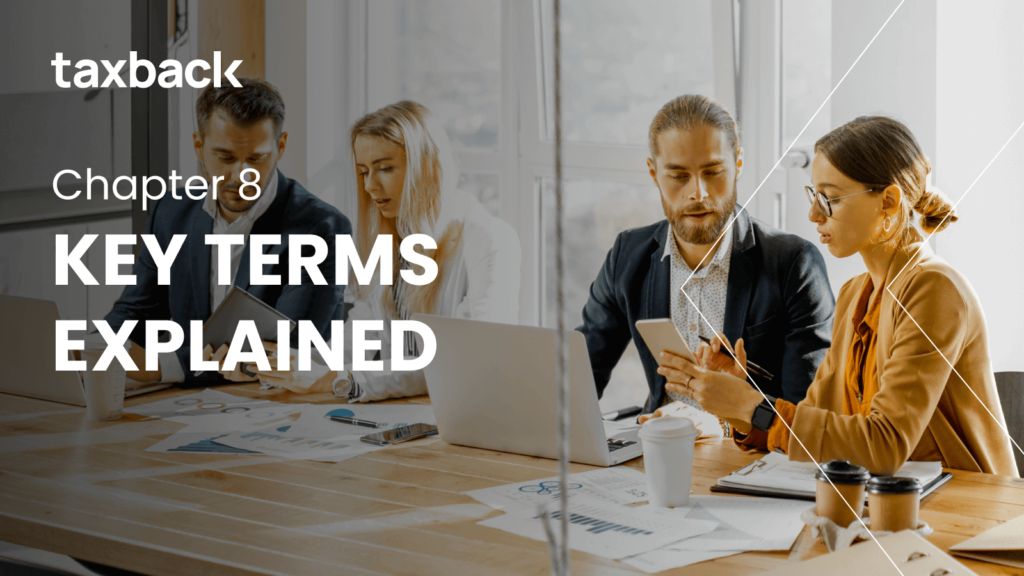
Non-PAYE income
This is income earned outside the PAYE system. This income must be declared to Revenue for tax (if your taxable non-PAYE income is less than €5,000 and the gross non-PAYE income is less than €30,000 you are not obliged to declare the non-PAYE income under the self-assessment system via Form 11. Instead, you must file a Form 12).
Examples of non-PAYE income include:
- Deposit Interest
- Irish Rental Income
- Income from Fees, Covenants, or Distributions (incl. Dividends)
- Foreign Income
- Income from a Trade, Profession or Vocation
Self-assessment system
This is where you make your own assessment of Income Tax (IT), Universal Social Charge (USC), Pay Related Social Insurance (PRSI) and Capital Gains Tax (CGT) you are due to pay for a tax year. You must self-assess when filing your annual tax return.
You should register for self-assessment if you:
- are self-employed
- receive income from non-Pay As You Earn (PAYE) sources, for example:
➔ rental income
➔ investment income
➔ foreign income including foreign pensions
➔ maintenance payments
➔ fees that are exempt from PAYE
➔ have profited from share options or share incentives
You do not need to register for self-assessment if:
- you only have PAYE income
- your taxable non-PAYE income does not exceed €5,000 and your gross non-PAYE income does not exceed €30,000
We take the hassle out of filing your Irish tax return
Gross income

Income before any deductions (like tax) are made.
Net income
Net income is the total income after tax and deductions (like pension contributions) have been subtracted.
Taxable income
Taxable income is the amount of your income that is subject to tax.
Before you calculate your income tax liability you can subtract the following from your income:
- Tax allowances
- Expenses
- Pension contributions
After these deductions are made, the figure that is left will be taxable income.
Sole Trader
A sole trader refers to an individual who owns and operates a business. They can employ staff to assist with the running of the business, but it is the sole trader who owns the business.
PPS Number
Your Personal Public Service (PPS) number is a unique identifier which is used for:
- tax purposes
- when you need to access social welfare benefits
- and for public services and information in Ireland
Income Tax (IT)
The standard rate of income tax is 20%. This means you pay 20% tax on the first €42,000 in 2024 (€40,000 in 2023) of your income. The higher rate of income tax is 40% and you pay this on any earnings above the €42,000 threshold (€40,000 in 2023).
Most employers and employees (over 16 years of age and under 66) pay social insurance (PRSI) contributions into the national Social Insurance Fund. In general, the payment of social insurance is compulsory.
The majority of self-employed people (including farmers, company directors, entrepreneurs, investors, landlords etc) pay Class S PRSI.
If you are aged between 16 and 66 and you earn more than €5,000 per year, Class S PRSI is paid at a rate of 4% on your gross income, with a minimum payment of €500. If you earn less than €5,000 from self-employment in a year you are exempt from PRSI, but you may pay €500 as a voluntary contributor (if you meet the other conditions).
The benefits of Class S include:
- Widow/Widower’s or Surviving Civil Partner’s (Contributory) Pension
- Guardian’s Payment (Contributory)
- State Pension (Contributory)
- Maternity Benefit
- Adoptive Benefit
We take the hassle out of filing your Irish tax return
Deposit Interest Retention Tax (DIRT)
If you save a sum of money in a bank, building society or post office, you will be liable to pay Deposit Interest Retention Tax (DIRT).
DIRT is a tax (deducted at source) on the interest you earn when you save money with a financial institution.
DIRT is charged at 33% on all interest payments.
Capital Gains Tax (CGT)

Capital Gains Tax (CGT) is a tax payable (at 33%) on financial gains made on the disposal of certain assets. The first €1,270 of your cumulative annual gains from the disposal of assets (after deducting expenses and allowable capital losses are exempt from tax. Any profit that you make above this figure will be taxed at 33% and you will need to file a tax return each year.
Examples of “chargeable assets” (liable to CGT) include:
- land
- buildings (houses, apartments, or commercial property)
- business shares
- assets that have no physical form such as goodwill, patents and copyright
- currency (other than Irish currency) and cryptocurrency
- assets of a trade
- foreign life insurance policies and offshore funds
- capital payments (in certain situations)
Many other forms of property are also considered.
Assets
Capital Gains Tax (CGT)
Capital Gains Tax (CGT) is a tax charged on profit made on the disposal of any asset. In this context an asset is something you own outright. It can also be intangible, or something you have an interest in – such as a leasehold interest in land.
Capital allowances
Capital allowances are similar to tax expenses. They are available for qualifying capital expenditure for the provision of certain assets used in a trade or rental business. They effectively allow a taxpayer to write off the cost of an asset over a period of time.
Disposal
Disposing of an asset includes any transfer of ownership by way of exchange, gift or settlement on trustees. Transfers of assets between spouses and civil partners are exempt from Capital Gains Tax.
Tax credits
Tax credits are used to reduce a tax liability. For example, if you are self-employed you are entitled to an Earned Income Tax Credit of maximum €1,875. Some tax credits are given automatically and others you must claim.
Rate bands
Income up to the €42,000 limit in 2024 (€40,000 in 2023) is taxed at the standard rate of Income Tax (20%). Income earned above this limit is taxed at the higher rate of Income Tax (40%).
Tax reliefs
Tax reliefs reduce the income on which you pay tax, which may result in a refund of tax paid and the amount of relief depends on which rate of tax you pay. For example, if you’re paying tax at the higher rate of 40%, then your income is reduced by the relief and the balance is taxed at 40%. Otherwise it will be reduced by the relief and the balance taxed at the standard rate of 20%.
Tax exemptions
Under certain circumstances, you may be exempt from paying tax on types of income you receive. You must meet certain conditions to qualify for an exemption – for example Artists’ Exemption, marginal relief and some social welfare payments.
Allowable expenses
In the course of operating your business, you may incur certain expenses which may reduce your taxable income (if allowable for tax purposes). In order for an expense to be regarded as business related (and eligible) it must have occurred ‘wholly’ and ‘exclusively’ in relation to your business. Where an expense relates to both business and private use, only the proportion of the cost that relates to business activity can be expensed.
Examples of expenses that can be included are:
- Materials (supplies costs)
- Motor running costs (portion applicable to business)
- Capital allowances
- Insurance relating to the business
- Telephone (portion applicable to business)
- Lighting and heating (for business and not domestic use)
- Advertising
- Bank charges
- Stationery
- Van/Car leasing

Disallowable expenses for tax purposes
These expenses can’t be used as tax deductions.
Examples include:
- Expenditure not related to your trade
- Client entertainment (including the cost of food, drink and accommodation)
- Most travel costs
- Donations (political or charitable)
Chargeable Person
‘Chargeable person‘ is another term used to describe a self-employed individual or someone who is liable to pay self-assessed income tax. A ‘chargeable person’ for self-assessment purposes is a person who is chargeable to tax on that person’s own account or on another person’s account in respect of a chargeable period. He/she must file a tax return and calculate tax due under self-assessment.
If your taxable non-PAYE income exceeds €5,000, or your gross non-PAYE income exceeds €30,000 you are regarded as a ‘chargeable person’ and you must register for self-assessment.
Note: If your non-PAYE income is zero due, for example, to an allowance which reduces your taxable profits to zero, you will be considered a chargeable person as zero profits can’t be taxed through the PAYE system.
Earned Income Tax Credit
If you are self-employed you can claim an Earned Income Tax Credit (worth €1,875 in 2024) to reduce your overall tax liability.
TR1 Form and Form TR1 (FT)
If you are considered to be a ‘Chargeable Person’ by Revenue you will need to file a tax return Form 11. To do so, in your first year of earning non-PAYE income, you will need to register as self-employed with Revenue. To do this you will have to complete a TR1 Form or TR1 (FT) Form. A TR1 Form is for resident individuals, partnerships, trusts or unincorporated bodies registering for tax in Ireland. And a TR1 (FT) Form is for non-resident individuals, partnerships, trusts or unincorporated bodies registering for tax in Ireland.
Form 11
Form 11 is used to pay and file a self-assessed tax return. You can provide a breakdown of your income, profits and costs for the year, the amount of IT, Pay Related Social Insurance (PRSI) and Universal Social Charge (USC) you need to pay.
If you are regarded as a ‘chargeable person’ for income tax purposes, you need to file a tax return Form 11 under the self-assessment system. If you’re a company director owning more than 15% of the shareholding in the company, you’re also obliged to complete a tax return Form 11 each year even if all your income is PAYE.
The 34-page Form 11 requests information such as:
- Personal details including PPS number, marital status, residence status
- Income details including extracts from accounts
- Rental income details
- Income from Irish employment, offices, pensions, social welfare etc.
- Foreign income
- Income from fees, covenants, distributions etc.
- Exempt income
- Annual payments, charges and interest paid
- Claim for tax credits, allowances, reliefs and health expenses
- Limitations on use of reliefs
- Capital gains
- Chargeable assets acquired
- Property based incentives
If you are filing a tax return Form 11, any capital gain/loss made on the disposal of a capital asset during the year must be reported on the tax return Form 11.
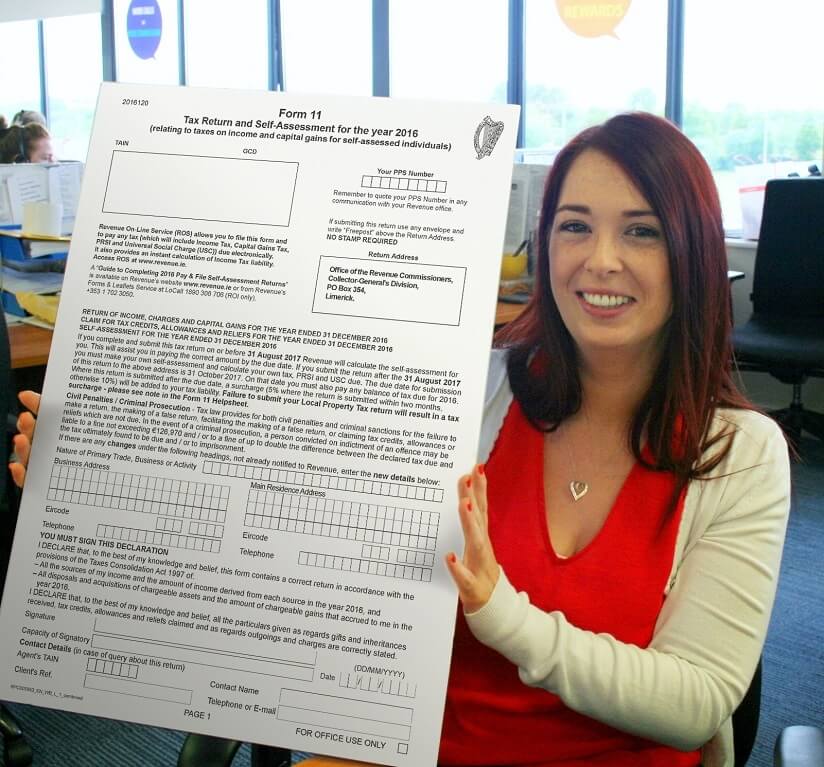
Form 12
The Form 12 tax is for people whose main form of income is through the PAYE system and whose taxable non-PAYE income in a year does not exceed €5,000 and gross non-PAYE income does not exceed €30,000.
We take the hassle out of filing your Irish tax return
Interest charge
A chargeable person is liable to interest if:
- their preliminary tax paid is insufficient or is not paid on time
- the balance of tax due is not paid on time
Interest runs from the due date for payment and the interest charge is 0.0219% per day.
Capital Acquisitions Tax (CAT)
CAT is a tax (charged at 33%) on gifts or inheritances.
The first €3,000 of the total value of all gifts received from one person in any calendar year is exempt. Although, this doesn’t apply to inheritances.
If you are liable to declare gifts or inheritance for CAT, you must do so on a Form IT38.
Deadlines
Under the self-assessment system the deadline for filing your Form 11 income tax return and to make the appropriate payment (Income Tax & Preliminary Tax) is on or before 31 October of the following tax year. Although it is possible to extend this deadline into mid-November if you file and pay online through ROS.
If you are due to pay Capital Gains Tax (CGT) there are two deadlines you should be aware of. If you make a disposal between 1 January and 30 November you must pay CGT by 15 December of the same year. And, if you make a disposal between 1 – 31 December, you will have to pay your CGT by 31 January of the following year.
For CAT liabilities, there are two important deadlines to be aware of. If the valuation date is between 1 January and 31 August, the deadline for your CAT payment is 31 October in that year. If the valuation date is between 1 September and 31 December, the deadline for your CAT payment is 31 October in the following year.
Revenue Online Service (ROS)
ROS refers to the Revenue Online Service. You can both file your tax return and pay your tax online using the ROS system.
Preliminary tax
When you file a Form 11 tax return you must make two payments
- The balance of Income Tax due from the previous year’s earnings
- Preliminary tax for the current year’s earnings
Preliminary tax is an estimate of the Income Tax, Pay Related Social Insurance (PRSI) and Universal Social Charge (USC) that you expect to pay for a tax year.
To calculate what you will need to pay you should use at least one of the following:
- 90% of the tax due for that year
- 100% of the tax due for the preceding year
- 105% of the tax due for the pre-preceding year (this option only applies where you pay by direct debit – it does not apply if the tax due for the pre-preceding year was zero).
Note: Preliminary tax does not apply for Capital Gains Tax (CGT).
We take the hassle out of filing your Irish tax return
Revenue Audit
A Revenue Audit is an examination of tax returns and records that you have submitted. During the audit, a Revenue officer will check to ensure that all of your profits, income and chargeable gains have been correctly calculated, tax credits have been applied and that no important chargeable information is missing.
Tax returns are normally accepted by Revenue and processed without in-depth auditing. However, your tax return may be randomly selected for audit, and under these circumstances it will be thoroughly examined.
Taxation of married couples
When you get married you can choose one of the following types of assessment:
1) Joint Assessment
This is often the most favourable basis of assessment for a married couple or civil partners.
Under Joint assessment, tax credits and standard rate cut-off point can be allocated between spouses to suit your own circumstances. For example, if only one spouse/civil partner has taxable income, all tax credits and the standard rate cut-off point will be given to the spouse/civil partner with the income.
2) Separate Treatment
With this option each spouse/civil partner is treated as a single person for tax reasons and is taxed on their own income.
3) Separate Assessment
Separate Assessment and Separate Treatment are similar. The main difference is that under Separate Assessment, some tax credits can be divided equally between both partners. Examples include:
- Married or Civil Partner’s Tax Credit
- Age Tax Credit
- Blind Person’s Tax Credit
- Incapacitated Child Tax Credit
Find more information on tax status and marriage here.
Proprietary and Non-Proprietary director
A company director is obliged to file a tax return every year, in the same way a sole-trader must. A non-proprietary director (someone who owns less than 15% of the shares in the company) must submit a Form 12 while a proprietary director must file a Form 11.
Dividend
A dividend is a distribution of a company’s profits to the shareholders of that company.
Dividend Withholding Tax (DWT)
Irish resident companies are required to withhold tax on dividend payments and other distributions that they make. DWT is charged at the standard rate of tax for the year in which the distribution is made.
Relevant Contracts Tax (RCT)
RCT is a withholding tax that applies to certain payments by principal contractors to subcontractors in the construction, forestry and meat-processing industries.
Under RCT, there are three withholding tax rates for subcontractors:
- 0% – for an up-to-date tax compliance record
- 20% – for a substantially up-to-date tax compliance record
- 35% – for a poor tax compliance record, or for those who have not registered with Revenue
Professional Services Withholding Tax (PSWT)
PSWT is a tax at 20% on payments by accountable persons for certain professional services.
Double taxation treaties
Many countries enter into tax treaties with other countries to avoid or mitigate double taxation (the charging of tax by two or more jurisdictions on the same declared income). Ireland has signed comprehensive these treaties with over 70 countries.
Tax refund
Every year thousands of Irish people pay too much tax and are entitled to a tax refund. You can go back four years from the current tax year in order to apply for your refund.
Tax agents like Taxback can help you to retrieve your maximum legal refund.
Tax Agent
A tax agent is a company that can help you to file your tax return and apply for your tax refund.
Taxback is an example of a tax agent. We can do all of your tax paperwork for you to help you retrieve your maximum legal refund.


General
Q. What’s the difference between a self-employed person and an employee?
A. The main difference is that a self-assessed individual files and pays their own Income Tax with Revenue. Normally an employee’s tax will be deducted from their pay by their employer.
Supplementing my income
Q. I’m a PAYE worker, but I earn some additional income outside my usual job. How can I tell if I need to register for self-assessment?
A. If your taxable non-PAYE income exceeds €5,000 in a year or your gross non-PAYE income is over €30,000, you will be considered a ‘chargeable person’ by Revenue and will need to register for self-assessment and file a Form 11 tax return.
However, if your taxable non-PAYE income is less than €5,000 in a year and your gross non-PAYE income is less than €30,000, you must file a Form 12 tax return. This is the most common tax return form used by PAYE earners.
Q. I top up my annual income by renting out my spare bedroom on Airbnb. Do I need to pay tax on this? How?
A. Airbnb is one of the most popular options for Irish people looking to make some extra cash. However, tax is still due on any income you make from renting out a room on this platform. The frequency of bookings does make a difference to the type of tax you’ll have to pay – either Case I ‘trading’ income or Case IV ‘miscellaneous’ income.
The form that you complete depends on whether Revenue considers your earnings to be Case I ‘trading’ income or Case IV ‘miscellaneous’ income.
Revenue will likely consider your income as Case I ‘trading’ if:
- you rent out the room or property on 6 or more occasions annually
- or if you host for 30 or more nights in a year
- or your Airbnb income exceeds €5,000 in a year
- or the property is available for occupancy all the time
We take the hassle out of filing your Irish tax return
If your Airbnb business falls under Case I ‘trading’ income then you’ll first need to register with Revenue by completing a TR 1 form. The next step will be to file a Form 11 tax return each year. You should complete a Form 12 if your Airbnb income is less than €5,000 in one year.
It’s not all bad news though. There are a number of deductibles that you can use to significantly reduce your Airbnb tax bill.
For starters you’ll be able to expense repair and maintenance costs, including those listed below:
- replacing broken windows and locks,
- servicing boilers
- Supplying new furnishings and fittings
- purchased cleaning supplies
- don’t forget to include laundry costs!
And
- legal and accounting fees
- advertising
- local service charges
- And more!

Q. Can I claim rent-a-room relief for my Airbnb income?
A. No rent-a-room relief isn’t applicable for Airbnb income.
Q. Is there anything I can expense from my Airbnb income?
A. Yes, there are a number of expenses (including repairs, maintenance, and utilities costs) which can reduce your tax liability. Although all expenses must have been incurred ‘wholly’ and ‘exclusively’ from running your Airbnb accommodation. If only part of the cost is associated with your Airbnb trade, then you can only expense the appropriate amount and not the entire expense.
Read our blog: 5 things you need to know about tax if you’re an Airbnb host in Ireland.
Q. I rent a room out in my house. Do I have to pay tax on this income?
A. Through Rent-a-Room Relief, homeowners can rent out a room in their home and earn tax-free income as long as it doesn’t exceed €14,000 in a tax year. However, you may have to pay USC and PRSI. If your rental income exceeds €14,000 in a tax year, you will be liable to pay tax. You should note that all the qualifying conditions must be met in order to avail of the Rent-a-Room Relief.
Q. I want to rent a room in my house to my son. Will I have to pay tax on this income?
A. Yes, you must declare all rental income for tax purposes.
Filing a tax return
Q. When do I need to pay and file my self-assessment income tax return?
A. Regarding the 2023 tax year, the self-assessment tax deadline is on 31 October 2024.
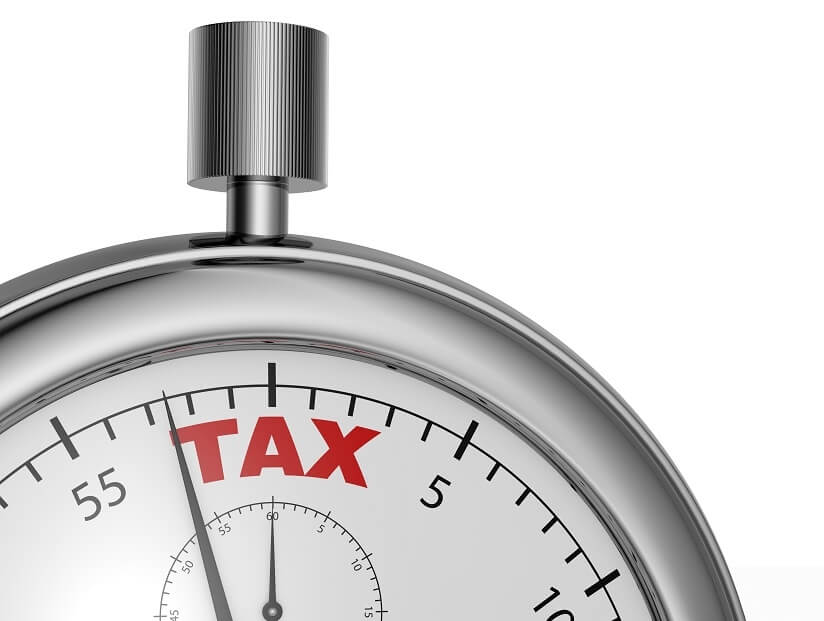
However, if you are filing and paying through Revenue On-Line Service (ROS), there is a deadline extension available and you will have until mid-November 2024 to pay and file.
Q. Do I need to calculate my own tax liability? How do I do this?
A. Yes, self-employed people calculate their own tax liability.
To do this you will need:
- personal details including PPS number
- your total income (including from employment and rental income etc) for the year
- details of your allowable deductions, expenses and reliefs
- payment details for paying the tax
If you enter your income and deductions into Form 11 through ROS, your liability will be automatically calculated at the end of the form.
Q. What kind of business expenses can I deduct from my tax return?
A. The type of expenses that are eligible largely depend on the type of business you conduct. However, in order for an expense to be regarded as business related – and therefore eligible as a deduction from your tax bill – it must have occurred wholly and exclusively in relation to your business. Where an expense relates to both business and private use, only the proportion of the cost that relates to business activity can be expensed.
There are some common expenses which can generally be deducted. These include:
- Renting out an office space
- Utility bills (such as heating, lighting, telephone and internet)
- The cost of insuring the business premises and the contents
If you work from home, these expenses are still allowable to the extent of the business use only.
Q. What is Preliminary Tax?
A. You must pay Preliminary Tax once you are registered for the self-assessment Income Tax system. Simply put, it’s an estimate of your tax liability (including Income Tax, PRSI and USC) for the current tax year. It is due on 31 October each year.
To calculate preliminary tax due you must choose at least one of the below:
90% of the tax due for that year
100% of the tax due for the preceding year
105% of the tax due for the pre-preceding year (this option only applies where you pay by direct debit – it does not apply if the tax due for the pre-preceding year was zero).
Note: failure to pay your Preliminary Tax on time can result in interest charges.
Q. What if I don’t file my tax return on time?
A. If you file your tax return after the deadline, you will have to pay surcharges and interest as below.
Surcharge
- within two months of the filing date: 5% of your tax due, up to €12,695
- over two months: 10% of your tax liability, up to €63,485
Interest
Interest on late payment of Income Tax and Capital Gains Tax is charged at 0.0219%.
We take the hassle out of filing your Irish tax return
VAT
Q. I’m registering as a sole trader. Do I need to register for VAT too?
A. If your income from services is more than €37,500 per annum, or your income from the sale of goods exceeds €75,000, you will need to register for VAT.
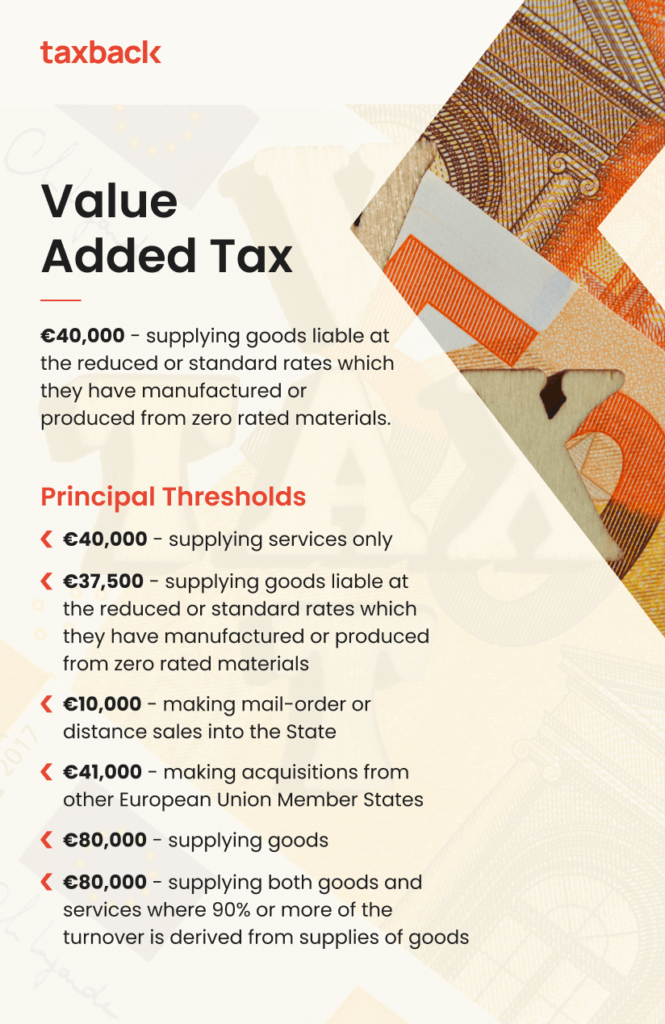
Audits
Q. What is an Audit?
A. An Audit is an examination by Revenue of your income and tax liability for a particular period. Revenue wants to confirm that the figures submitted on your tax return were correct and that there were no discrepancies.
Q. Is there any way to avoid being audited?
A. The selection process to choose those who are audited is completely random. In other words, there is no way to avoid selection.
Q. How can I prepare for a Revenue Audit?
A. In the event of an audit, you will need to provide documentation which supports every figure stated in your tax return. And, as your annual tax return can be audited at any time within a six year period, you will need to keep all relevant files such as invoices, bank statements, and expense receipts in a safe place.
Before the audit begins you should immediately double check your records and returns for any inaccuracies that you may need to notify Revenue about.
Q. What happens if I make a mistake on my tax return?
A. If you make a mistake on your tax return, Revenue can impose penalties. So, if you do notice an error you should make an unprompted qualifying disclosure to Revenue as soon as possible.
An unprompted qualifying disclosure is information you give to Revenue to clarify details of incomes or gains that have been omitted in error from your tax return. This disclosure must be made before you receive an audit notice or an investigation begins. The benefit of the disclosure is that you can receive a lower penalty, you will not be investigated for prosecution and will not have your settlement details published on the list of tax defaulters.
We take the hassle out of filing your Irish tax return
Capital Gains Tax
Q. What is Capital Gains Tax and do I need to pay it?
A. Capital Gains Tax (CGT) is due on gains made from the disposal of capital assets (such as shares and property etc.).
The first €1,270 of your cumulative annual gains (after deducting expenses and losses from other investments) are exempt from tax. However, any profit that you make above this figure will be taxed at 33% and you will need to file a tax return each year.
Q. When is CGT due?
A. For disposals of assets between 1 January and 30 November Capital Gains Tax CGT must be paid before 15 December in the same tax year. And, for disposals of assets between 1 December and 31 December CGT, must be paid before 31 January in the following tax year.
Q. What do I do if I make a loss on my investment?
A. You are still obliged to record the loss by submitting a tax return for the tax year the disposal was made. You can use this loss against a capital gain made by you in the year that you made the loss. You can also carry it forward until you can offset it against a capital gain but you can’t carry it back for offset against chargeable gains arising in earlier years of assessment. Capital losses are not available for offset against income taxable under corporation tax or income tax.
Q. I’m thinking of investing in some shares. Will I have to pay additional tax if I do?
A. Yes, you’ll have to pay Capital Gains Tax at 33% on any gain you make from your investment.
Q. If I hang on to my shares for a few years when will I have to pay tax?

A. Capital Gains Tax is due the year you make the disposal (sale or exchange). So, if you make a disposal anytime between 1 January and 30 November, you must pay before the 15 December. If you make a disposal between 1 December and 31 December, your payment is due by 31 January of the following year.
Q. Will anyone notice if I don’t pay Capital Gains Tax?
A. If Revenue discovers a missed or late payment of Capital Gains Tax, you’ll be liable for penalties and interest.
Q. I just received a cash gift from a friend. Does anyone need to pay tax on this gift? I intend to re-gift to another friend of mine. Does anyone need to pay tax on this gift?
A. Depending on the size of the cash gift, you may need to pay Capital Acquisitions Tax (CAT). This is a tax at 33%, on gifts and inheritances. If the gift or inheritance is from your spouse/civil partner or if its value is below a group threshold amount, no CAT is due. Also, you can receive a gift with a value of €3,000 or less from any one person in any one year without a CAT liability.
Anyone who receives a gift or inheritance will need to pay CAT if it’s above the group threshold amount. Read more about CAT here.
Q. I’m self-employed. What kind of social welfare entitlements am I entitled to?
A. Generally, if you’re self-employed you’ll pay Class S PRSI.
The benefits of Class S include:
- Widow/Widower’s or Surviving Civil Partner’s (Contributory) Pension
- Guardian’s Payment (Contributory)
- State Pension (Contributory)
- Maternity Benefit
- Adoptive Benefit
Class S PRSI only covers you for certain social welfare payments. It does not cover you for Jobseeker’s Benefit. However, you may be entitled to Jobseeker’s Allowance (JA) if you qualify via a means test.
We take the hassle out of filing your Irish tax return
Are you self-employed?
Taxback can make your life easier!
We will take care of all the paperwork for your annual tax return and ensure that you are claiming every applicable tax relief that you’re entitled to.
Additionally, every single tax return is checked by a senior Irish tax accountant and we guarantee to keep you fully compliant with the Irish tax authorities.
Benefits of filing with Taxback
- Cost-effective & friendly tax return service
- Personal Tax Advisor
- Full compliance with the Irish Revenue
- No complicated forms
- 24/7 Tax Help

We take the hassle out of filing your Irish tax return
Last Updated on October 29, 2025

